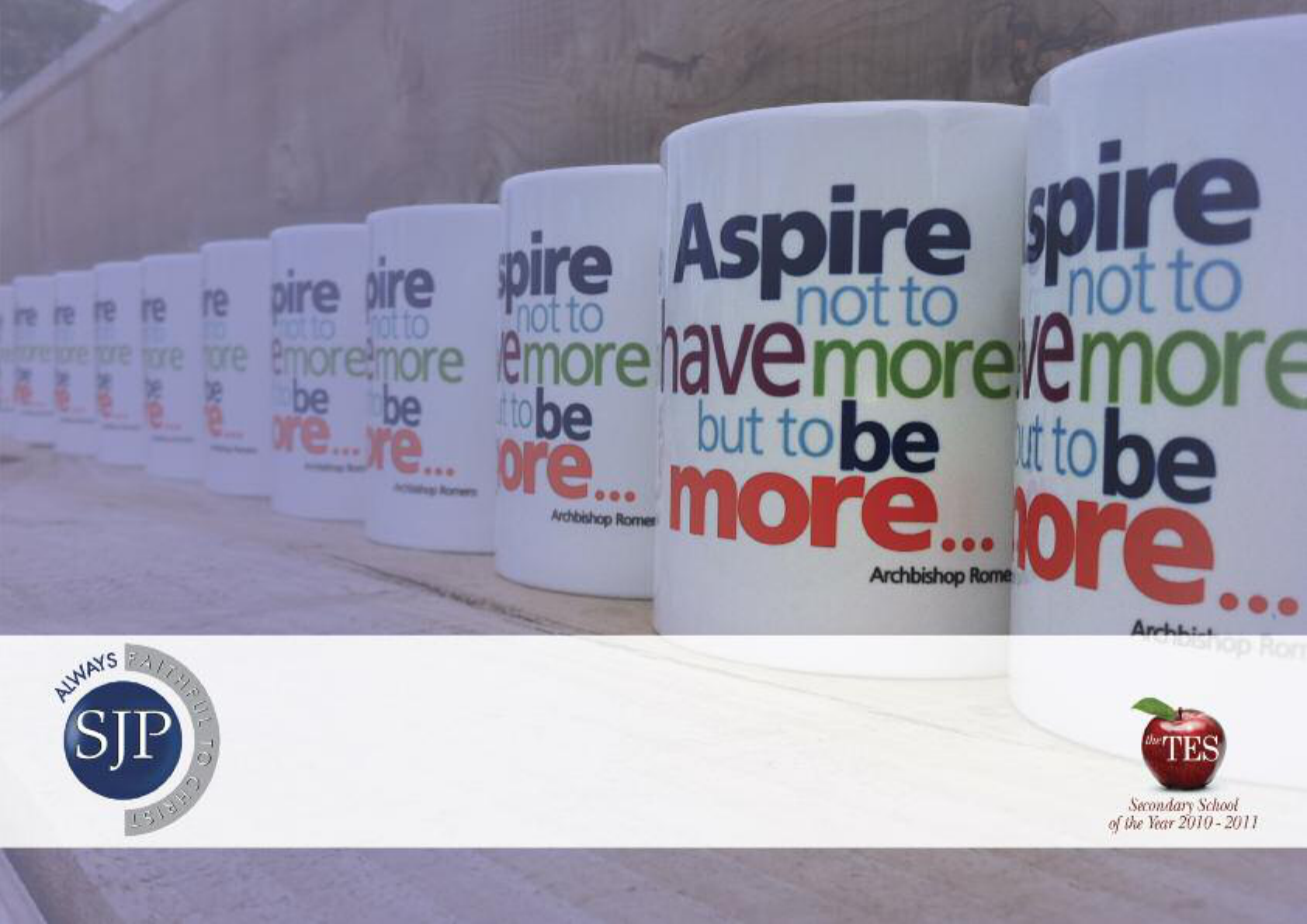
St John Plessington Catholic College
a Specialist Science, Technology and Humanities College
Parent Handbook
2011/2012
“This is an outstanding school in which exceptional things happen.”
OFSTED
All are welcome in this place... Christ The King Catholic Primary School Our
Lady & St Edward’s Catholic Primary School St Anne’s Catholic Primary School St John‘s Catholic
Junior School St Joseph’s Catholic Primary School (Birkenhead) St Michael & All Angels Catholic
Primary School St Peter’s Catholic Primary School St Werburgh’s Catholic Primary School Abbey
Junior School Bedford Drive Primary School Bidston Avenue Primary School Bidston Village C.E.
Primary School Brackenwood Junior School Bromborough Pool Primary School Cathcart St
Primary School Christ Church C.E. Primary School Church Drive Primary School Cole Street
Primary School Devonshire Park Primary School Fender Primary School Grove Street Primary
School Hayfield Primary School Heswall Primary School Heygarth Primary School Higher
Bebington Junior School Holy Cross Catholic Primary School Ladymount Catholic Primary School
Liscard Primary School Manor Primary School Mendell Primary School Mersey Park Primary School
Millfields Primary School Mount Primary School New Brighton Primary School Orrets Meadow
Primary School Overchurch Junior School Oxton St Saviours Primary School Pensby Junior School
Portland Primary School Poulton Lancelyn Primary School Prenton Primary School Raeburn
Primary School Riverside Primary School Rock Ferry Primary School Sacred Heart Catholic Primary
School Somerville Primary School St Alban’s Catholic Primary School St Andrew’s C.E. Primary
School St George’s Primary School St Laurence’s Catholic Primary School St Paul’s Catholic
Primary School St Peter & Paul’s Catholic Primary School St Joseph’s Catholic Primary School
(Upton) St Joseph’s Catholic Primary School (Wallasey) Stanton Road Primary School The Dell
Primary School The Priory Parish C.E. Primary School Thornton Hough Primary School Townfield
Primary School Well Lane Primary School Woodchurch Road Primary School Woodlands Primary
School Woodslee Primary School
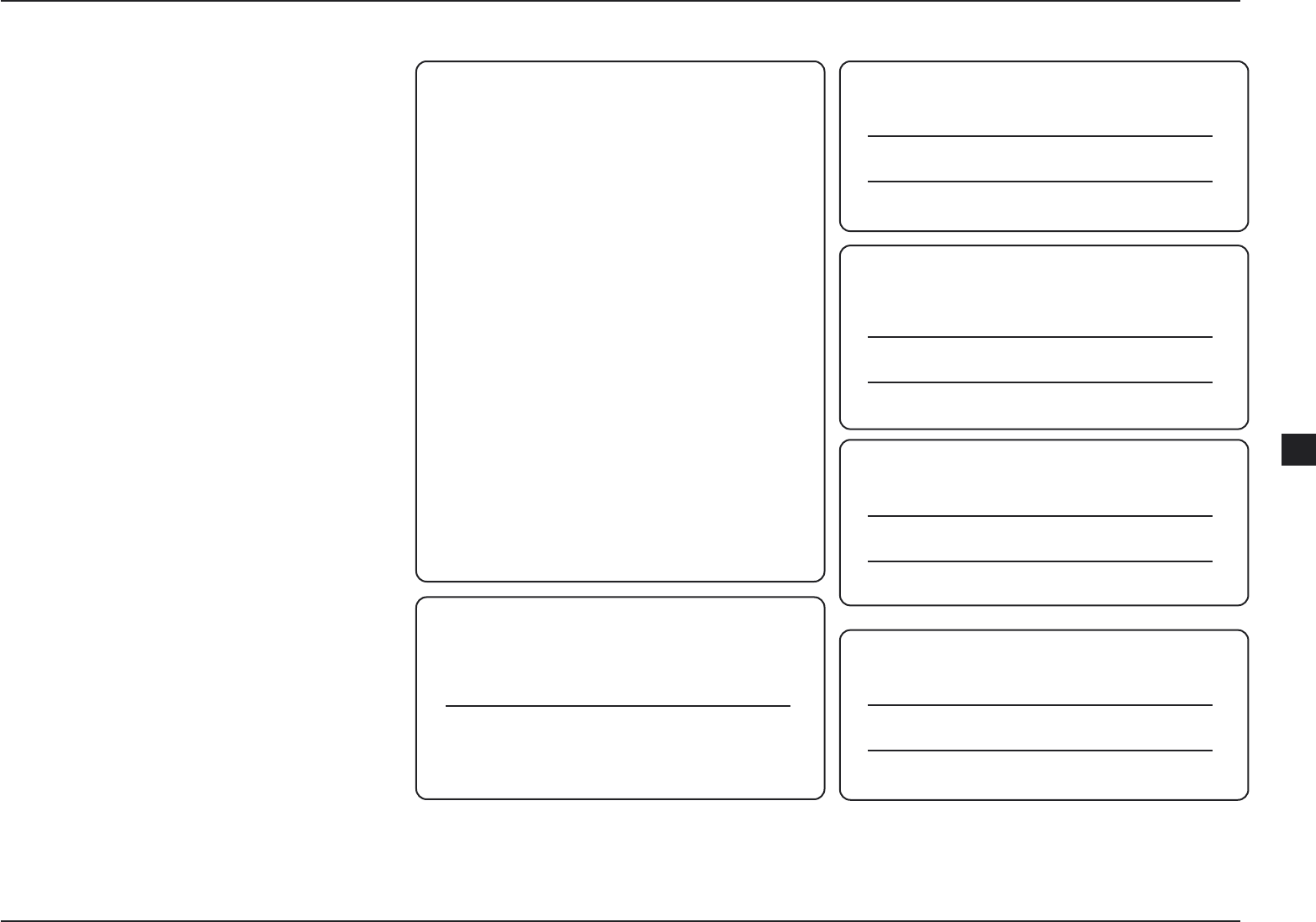
Contents
Page Section
4 . . . . . . . . .Welcome
5 . . . . . . . . .Our Catholic Ethos
6 . . . . . . . . .Aspire not to have more but to be more
7 . . . . . . . . .Governing Body
8 . . . . . . . . .Management and Staffing
10 . . . . . . . . . Pastoral Care Years 8-11
11 . . . . . . . . . Tutor Groups KS3
12 . . . . . . . . . Tutor Groups KS4
13 . . . . . . . . . The SJP Experience
14 . . . . . . . . . SJP Year 8 Experience
15 . . . . . . . . . SJP Year 9 Experience
16 . . . . . . . . . SJP Year 10 Experience
17 . . . . . . . . . SJP Year 11 Experience
18 . . . . . . . . . Partnership Agreement Years 8-11
19 . . . . . . . . . Term Dates Years 8-11
20 . . . . . . . . . Timetable
21 . . . . . . . . . Curriculum Years 8-11
26 . . . . . . . . . College Library
27 . . . . . . . . . Uniform and Appearance
29 . . . . . . . . . ICT Years 8-11
30 . . . . . . . . . Rewards and Sanctions
33 . . . . . . . . . Attendance and Punctuality
34 . . . . . . . . . College Dining Hall
35 . . . . . . . . . College and the Home
38 . . . . . . . . . College Map
39 . . . . . . . . . Sixth Form Handbook
40 . . . . . . . . . Sixth Form Welcome
41 . . . . . . . . . General Principles
42 . . . . . . . . . Pastoral Care
45 . . . . . . . . . Tutor Groups Sixth Form
46 . . . . . . . . . Sixth Form Experience
47 . . . . . . . . . Learning Agreement
49 . . . . . . . . . Curriculm
52 . . . . . . . . . Sixth Form Facilities
53 . . . . . . . . . ICT
54 . . . . . . . . . Rights and Responsibilities
56 . . . . . . . . . Attendance and Punctuality
57 . . . . . . . . . Careers
“This is an outstanding school in which exceptional things happen.” (OFSTED)
3
Contact Information
College Address
St John Plessington
Catholic College
Old Chester Road,
Bebington,
Wirral CH63 7LF
Telephone:
0151 645 5049
Fax
0151 643 1516
General Email:
Website
www.stjohnplessington.com
Child’s Form Tutor
Your child’s form tutor is your first
point of contact with the College
Sam Learning Centre ID: ch63pc
Username:
Password:
www.samlearning.com
Virtual Learning Environment (VLE) /
College Network
Username:
Password:
www.stjohnplessington.com
On-line reporting for parents
email log in:
Password:
www.stjohnplessington.com
Mymaths
Username:
Password:
www.mymaths.co.uk

4
Welcome
We are delighted to welcome you and your son or daughter back to St John Plessington Catholic College for the new
academic year 2011-12. This year will provide another year of challenge and hard work as well as fun and excitement as
your child builds important foundations for success.
“The atmosphere of calm confidence and excellent relationships in the College is second to none.” (OFSTED)
The College goes from strength to strength.
Following our Outstanding OFSTED reports in
2007 (Full Inspection), 2008 (Subject Inspection)
and 2011 (Interim Report), our results continue to
smash all records. This means year-on-year that
we continue to be the highest performing
comprehensive school on the Wirral for GCSE
success and yet again we are the top school
overall for achievement. At the time of writing we
are again expecting another record year of
results at GCSE and Advanced Level. Our
winning the prestigious Times Educational
Supplement Secondary School of the Year for
2010-11 has attracted a huge amount of interest
from other schools with over 40 institutions the
length and breadth of the country visiting us to
sample the secrets of our success.
OFSTED recently confirmed their interim
assessment which indicates that our performance
across a wide range of measures has been
sustained and, because of this, they will not be
inspecting the College until further notice. It is
another further accolade to everyone across the
community for helping us maintain our high
levels of performance - a fantastic platform to
enable the College to grow and develop further
in new and exciting ways! I can assure you that
we are always looking to build on this success
and will continue to provide an education that is
truly second to none on the Wirral.
It has been an exciting year as our widespread
reputation for excellence in all aspects of school
life has filtered out. The former Prime Minister,
the Rt Hon Gordon Brown, said this when he
visited us earlier in the year: “What I have heard
about this school makes me incredibly proud that
it is the top school in this country.” The Bishop of
Shrewsbury, in his congratulations to the College
community on achieving this award, described SJP
as “all that is best in Catholic Education” and we
were very honoured when one of our pupils was
asked to make a presentation on behalf of all the
children in Catholic schools in the UK to Pope
Benedict during his State Visit.
Here at SJP, you know that we expect the highest
standards of behaviour from our students and we
encourage them to be self-disciplined and well
behaved at all times. High standards of uniform
and appearance set the tone for all that we seek
to achieve here and your support in this area is
crucial if we are to further build our community.
Pupils are proud to be here at SJP and understand
that when they wear our uniform they are our
ambassadors. High attendance is another vital
ingredient if your child is to be successful. I
cannot authorise term-time requests for leave and
ask that parents do not book holidays when their
child should be in school, tempting as it is with
cheaper holiday packages.
We never take for granted the fact that it is our
partnership with parents that is crucial to our
success.
I hope you will take the time to read through this
Parent Handbook. It is an attempt to make clear
to parents what our expectations our, to give you
an idea of some of the exciting opportunities that
lie ahead and to outline how we can work in
partnership together.
Tom Quinn
Headteacher
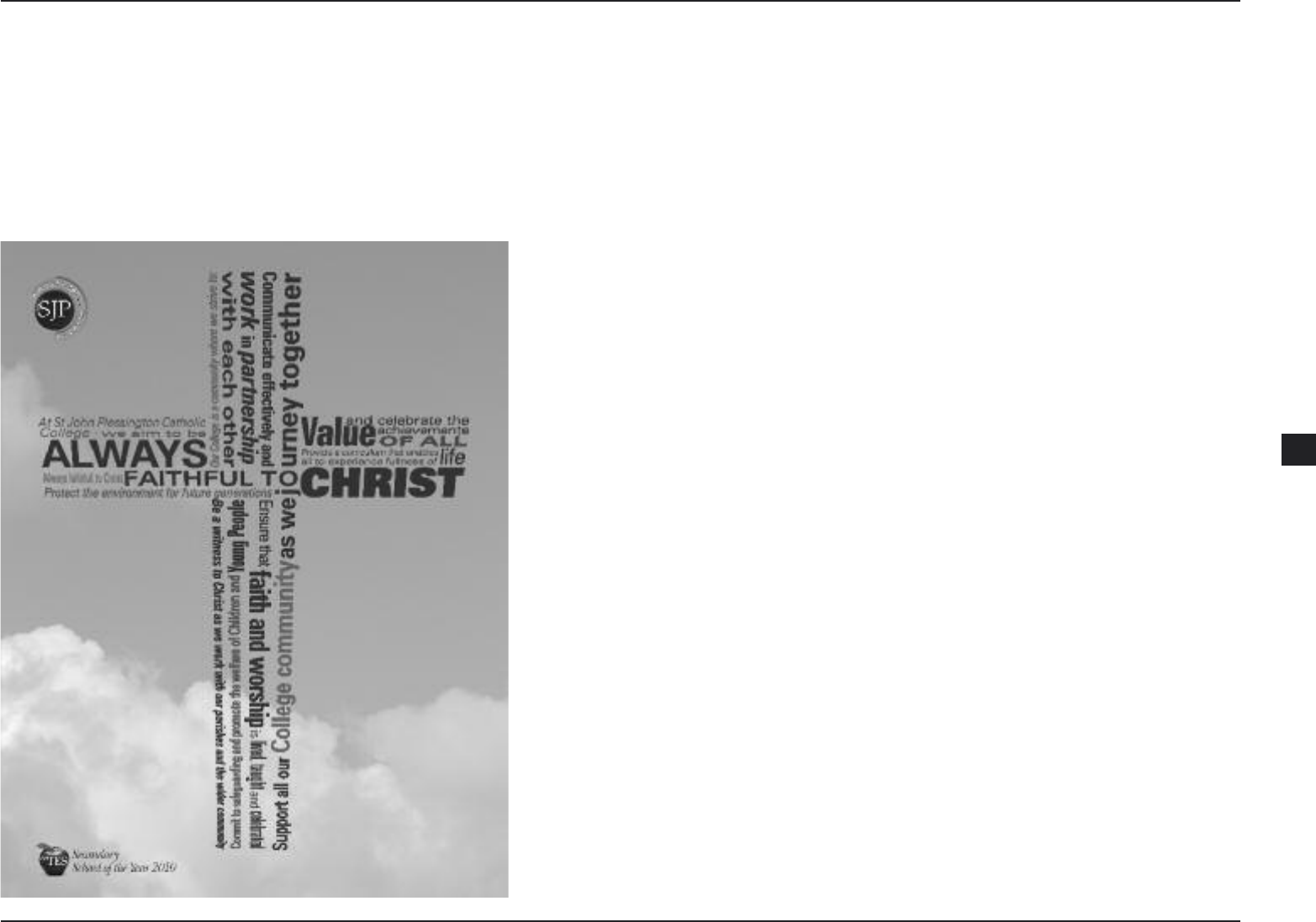
5
Our Catholic Ethos
Our mission is to be a Catholic College where every individual is highly valued and where care and concern for others is central to our work. All our pupils
are expected to achieve their potential and become equipped for adult life able to make a full contribution to society.
At SJP everything we do is guided by Gospel values, that of love, forgiveness, reconciliation, justice, faith, integrity, humility, service, peace, hope and
prayer. The College Mission Statement is on display in every room and guides us in everything we say and do at St. John Plessington Catholic College. Each
day begins with prayer and there is a Collective Act of Worship each day that takes
place during Academic Review Time or in a formal assembly which is led by a Senior
Member of Staff.
The fruits of our faith can be evidenced in a range of provision and activities. We have a
full time Chaplain, Rev. Gerard Boyle who gives important direction to the spiritual life
of the College as well as supporting the work of the Pastoral Teams. We have our own
Chapel space, a Chaplaincy Meeting Room and last summer we opened our ‘Peace
Garden’ a place of tranquillity and rest. Through our Chaplaincy provision, we offer the
experience for pupils in all year groups to experience a retreat, using Savio House
(Cheshire), Castlerigg Manor (Lake District) and St.Cassian’s Kintbury (Berkshire) as
opportunities to pray, reflect and build community together. We engage in fundraising
events for our chosen charities throughout the year. This year we have adopted ‘Street
Child Africa’ as our whole school charity, raising money to support children who live
desperate lives of poverty and who are among the most vulnerable.
We also support CAFOD and the Catholic Children’s Society as well as a host of others.
In Advent this year we are performing the SJP Nativity which will provide a rich tapestry
of music and drama to help us prepare for the great feast of Christmas. We hope you
will come along and experience the many talents of our wonderful youngsters.
Safeguarding Statement
Our responsibility to safeguard and promote the welfare of young people is of
paramount importance and we believe that safer students make more successful
learners.

6
At SJP we seek to build a community of faith,
where prayer and worship are at the heart of
what we do; where people are respected and
treated with dignity; where the sort of person
that we become is of first importance and where
we have a real sense of duty and of service to
others. This is articulated in the phrase “Aspire
not to have more but to be more”.
We believe that to be educated is to be more
fitted for life; to have a greater capacity for
appreciating what life is, what it has to offer, and
what the person has to offer in return to wider
society. Thus, if we would apply our modern
educational skills and resources to this
philosophy, we hope to succeed in offering
something of lasting value to our pupils and
students.
An important aspect of the SJP Experience is to
allow our pupils and students to articulate what
they have learned from the many opportunities
and events that are available. Staff have a crucial
role in framing this. On all trips and events, it is
important that in the planning stages, staff make
clear what the impact will be for the pupils and
students. Both during and after the trip, the
member of staff organising the event will need to
build in opportunities for self-reflection on the
part of the pupils and students.
In aspiring not to have more but to be more,
there needs to be an element of service to others.
We want SJP to be the best school in the country,
we want our children to have the best education
and the best opportunities. By achieving this we
will instill into the pupils and students a desire to
be the best they possibly can and so make a
difference. The gaining of qualifications, skills and
experiences is not just about what I get out of it
but how it helps me to help others. Again, staff
have a pivotal role in this; not only in the way
that they model such principles in their behaviour
but also how they help the pupils and students to
personify and articulate it.
The ambience of the College is such
that all are encouraged to develop
their talents as fully as possible and
to use those gifts for others in the
spirit of 'What more can I do, what
more can I give?'
At the end of seven years at SJP it is
hoped that young people are:
• developing and deepening a
relationship with God, and are able
to find God in reflection on their
own experience
• happy, friendly, and self-confident,
with a sense of humour and an
awareness of their God-given gifts
and talents and the need to fulfil their potential
for good
• seen to have a generosity of spirit and a
readiness to place their talents at the disposal
of others
• well prepared to take their place in wider
society unmotivated by prestige or selfish
ambition and aware of how fully they can
contribute to the common good
• ready to ask 'What more can I do, what more
can I give?' in every area of life
• proud of having belonged to the SJP
community with respect for its values and those
who taught them.
Aspire not to have more but to be more…
Aspire
not to
havemore
but to
be
more
...
Archbishop Romero
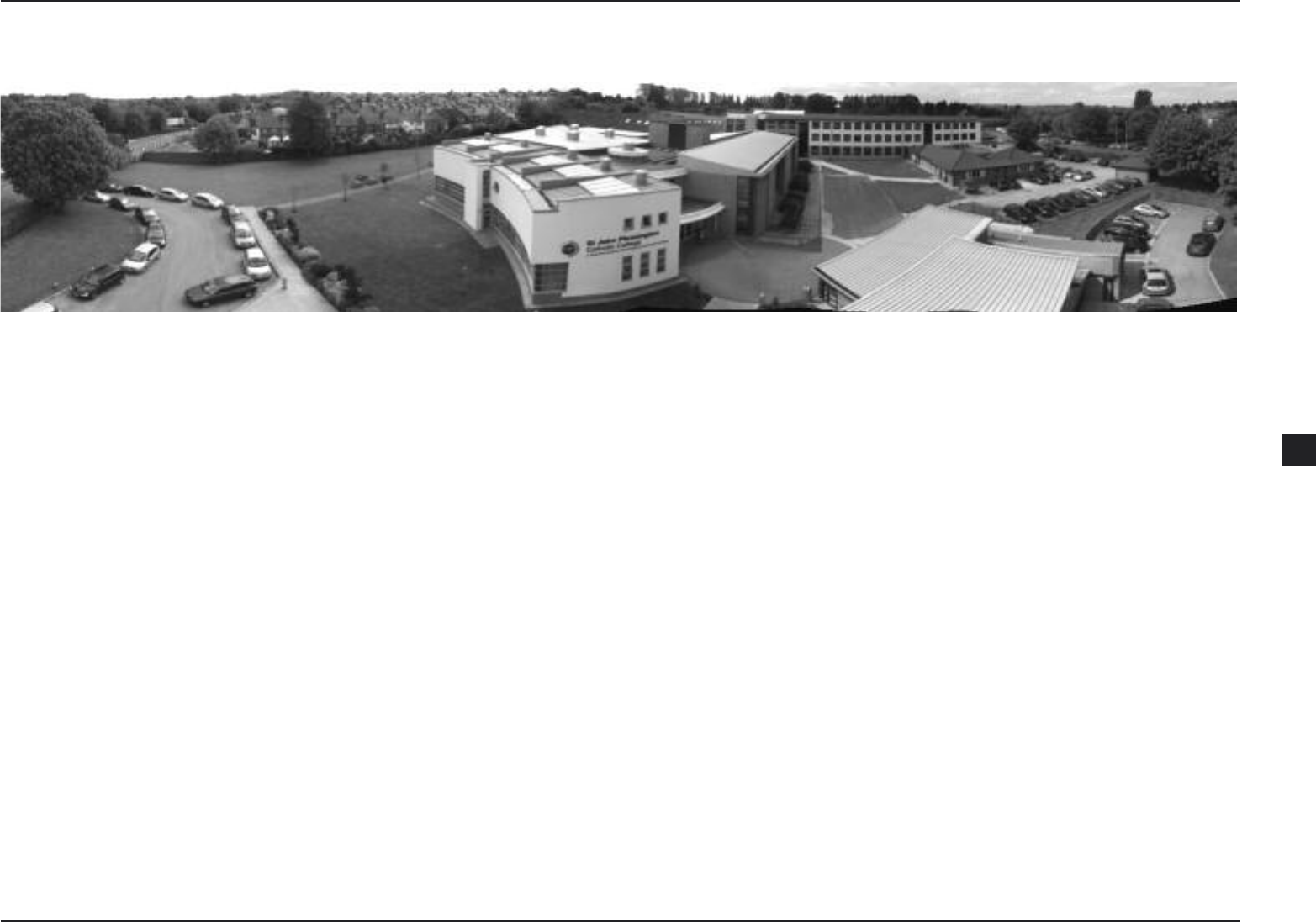
7
Chair of Governors
Mrs Margaret Marks
Vice-Chair of Governors
Mr Brian O’Connell
Foundation Governors
Mr Christopher Carroll
Ms Carol Johnson-Eyre
Fr Nick Kern
Mr John McCaffery
Mrs Julie Spencer
Mrs Veronica Statham
Mr John Williams
Mrs Christine Wilson
LEA Governor
Mrs Lynn Merity
Staff Governors
Ms Faye Clinton
Ms Sandy Skillen
Mrs Caroline Eckersley
Parent Governors
Mrs Penny Carty
Mr Quentin Neal
Mr Paul Baxter
Associate Members
Dr Robert Crawford
Head Teacher and Governor
Mr Tom Quinn
Clerk to the Governors
Miss Helen Caul
Diocese of Shrewsbury Schools
Commission
Mr A Scott,
Curial Offices,
2 Park Road South,
Prenton,
Wirral CH43 4UX
Director of Children and Young
People’s Dept.
Mr H Cooper,
Hamilton Building,
Conway Street,
Birkenhead, CH41 4FD
NB. Foundation Governors are nominated by Diocese
of Shrewsbury Schools Commission; Parent Governors
by ballot and should a vacancy occur parents will be
informed.
Governing Body

8
STAFF TEAM DEPT
Mr T. ANDERSON Technician - DT
Mrs A. ASHCROFT Teaching Assistant
Mrs R. AUSTIN Head of Learning
Mr R. AUSTIN Technician - AVA/Music
Mr J. BADGER Cover Supervisor
Mrs W. BAKER Teaching Assistant
Mrs C. BEDKE RE / Social Sciences
Mrs K. BELL Maths
Miss T. BENSON Maths
Miss F. BERTHIER Teaching Assistant
Mrs J. BLACK Office
Miss S. BLAIR Maths
Mr L. BOTES Business Studies
Miss K. BOWDEN Maths
Ms J. BOYHAN Teaching Assistant
Rev G. BOYLE College Chaplain
Miss C. BREEN Teaching Assistant
Mrs A. BROAD Midday Assistant
Mrs J. BROOM Librarian
Mr I. BURROWS ICT KSC
Mrs J. BYRNE Office
Mrs L. CAMERON Office
Miss A. CANDIANO English
Mrs L. CARROLL RE
Mrs C. CARTER Head of MFL
Miss S. CARTY Drama
Miss H. CAUL PA to Headteacher
Miss H. CHADWICK Maths
Miss F. CLINTON Learning Coach
Mrs C. COOGAN Head of Learning
Mr M. COOGAN Head of Learning
Ms I. COOK Science
Mr K. COOPER DT KSC
STAFF DEPT
Miss R. COPE Science
Mrs D. CRAWFORD Head of RE
Mrs D. CUSHION RE
Mrs C. DAVIDSON RE KSC
Mrs L. DAVIES History
Mr M. DAVIES Asst Head of Learning
Mrs J. DAVIS Learning Coach
Miss A. DEENY Teaching Assistant
Mrs P. DIXON Maths KSC
Mr T. DOLAN Head of Assisi Centre
Miss L. DONNELLY Music
Miss J. DWYER Maths
Miss J. DYER Learning Coach
Ms D. EASBY MFL KSC
Mrs C. ECKERSLEY English KSC
Mrs L. EVANS SENCO
Mr P. FAITHFULL Music
Miss V. FERRIE Teaching Assistant
Mrs A. FINLEY Teaching Assistant
Mrs J. FLEET Teaching Assistant
Ms K. FLETCHER English
Miss E. FRANCIS Head of Learning
Mr N. FRANCIS ECM
Mrs J. FRANKLIN Technician – Science
Mr O. GARDNER Science
Mrs H. GARLAND Science
Mr J. GATRELL Head of Maths
Mrs B. GORMAN DT
Miss K. GOULDING Maths
Ms T. GRETTON Midday Assistant
Mrs D. GRIFFITHS Maths
Mr G. GRIFFITHS ICT
Mrs J. GULLIDGE Head of Learning
Management and Staffing
The Senior Leadership Team
The Headteacher has a Senior Leadership Team to
help run both the curriculum, pastoral and
administration of the College.
The Senior Leadership Team is responsible for a
range of specific subjects, for developing their
staff, for the effective use of cross-curricular work
within the overall curriculum, and administrative
and pastoral tasks. The management approach
enables cross-curricular links to be more readily
achieved and encourages teamwork across wide
subject disciplines.
HEADTEACHER
Mr T. QUINN
Deputy Headteachers
Mr S. RYLANCE Pastoral
Mr B. LALLY Curriculum
Assistant Headteachers
Mr N. HARRISON
Mr. J. JONES
Ms P. PHILLIPS
Mr. A. REAY
Mrs E. SHARMAN
Mrs C. SINGLETON
Ms C. VEITCH
Operations Manager
Ms S. MITCHELL

9
Mrs E. HALE Teaching Assistant
Miss E. HALL English
Mr M. HARRIS PE
Miss V. HARRIS Head of PE
Mrs K. HARRISON Maths
Mrs P. HARRISON Reprographics
Mr S. HARVEY Head of ICT & Bus St
Miss S. HERAGHTY Head of Drama
Mrs A. HILL History / Vocational
Mrs L. HOWARTH Science KSC
Mrs D. HOWELLS Science KSC
Mrs C. HUGHES Technician - Science
Miss E. HUGHES DT KSC
Mrs M. HUGHES Teaching Assistant
Mrs A. JACKSON Reprographics
Mr K. JOGLEKAR MFL
Mr B. JOHNSON Caretaker
Mr A. JONES Teaching Assistant
Mrs D. JONES Office
Mrs J. JONES Site Supervisor
Mrs K. JONES Teaching Assistant
Mrs M. JONES English KSC
Mr P. JONES RE
Mr J. KENNEDY DT
Miss C. KINGSLAND MFL
Mrs C. LAMB Office Manager
Mrs T. LAWSON Head of Vocational
Mrs L. LEDSOM Office
Mr P. LEICESTER ICT & VLE Manager
Mrs J. LLOYD First Aid/Medical
Mrs A. LOCK Director of 6th Form
Miss C. LOUGHRAN Maths
Mr P. LOVE ICT KSC
Mrs L. LOWE Media / English
Miss J. MARNELL Drama
Mr K. MARSH Head of Science
Mrs S. MAY Teaching Assistant
Mrs K. McCULLOCH Office
Miss A. McGAGH Maths KSC
Ms S. McGANN Choir Co-ordinator
Mr L. McHALE Geography
Miss N.McKENNA RE KSC
Dr D. McKILLOP Maths
Mr P. McLOUGHLIN Asst Head of Learning
Mrs R. McMAHON Work Related Learning
Miss E. McNALLY English KSC
Mrs C. McNEILL Head of Learning
Mr S. MEEHAN English
Miss R. MOON Teaching Assistant
Mr A. MOORE Science KSC
Mrs H. MOORE Science
Miss A. MORRIS DT
Miss A. MUMBY English
Mrs S. MURPHY Head of History
Mr S. MURPHY Teaching Assistant
Mrs J. NEEDHAM Cover Supervisor
Mr D. NIBBS Technician - Science
Mr B. NUNNERY PE KSC
Mr A. OWEN 2nd in Dept MFL
Miss L. OWEN History
Mrs C. PEARSON Science KSC
Mrs K. PENNY Business Studies KSC
Miss K. PERRY PE
Miss L. PEYTON Science
Mrs L. PLANT Teaching Assistant
Miss J. PRITCHARD PE
Mr M. REGAN Head of Art
Mrs M. REID Learning Coach
Mr L. ROSE Technician ICT
Ms H. ROSSITER English / Media
Mrs H. RUSCOE Examinations Officer
Mr D. SACUI Technician ICT
Mrs D. SADLER MFL
Mrs L. SANDLAND-JONES
RE
Mrs C. SEFTON Technician – DT
Mr G. SEFTON Caretaker
Mr J. SEWELL PE
Ms A. SHAW Teaching Assistant
Mr J. SHELDRAKE Science / AST
Mr S. SHERLOCK Network Manager ICT
Mr B. SHILLINGLAW DT KSC
Ms S. SKILLEN ECM Co-ordinator
Mrs J. SLADE Office
Mrs J. SMITH Head of Geography
Miss T. SMITH Science
Ms L. STEARNE DT
Miss A. SUTTON Learning Coach
Mrs J. SWANN Learning Coach
Mr. P. SWEETMAN MFL
Mrs L. THIERRY SEN
Mr R. THOMAS Head of Performing Arts
Mrs V. THOMPSON Head of DT
Ms H. THOMSON DT
Mrs M. THOMSON Maths
Miss A. WALKER Geography
Mrs A. WALKER DT
Mrs C. WALSH Teaching Assistant
Mrs K. WARDLE Office
Mr L. WELLENS Teaching Assistant
Mrs P. WILDING Midday Assistant
Miss J. WILLIAMS Office
Mr M. WILMSHURST Science
Mr J. WILSON Head of Learning
Mr S. WITCHER Head of Media Studies
Miss R. WROE Head of Social Sciences
STAFF DEPT STAFF DEPT STAFF DEPT

10
The Head Teacher is assisted in the planning and
delivery of pastoral care at SJP by a team which
includes the Senior Leadership Team, Heads of
Learning, Learning Coaches and Form Tutors.
Form Tutors are the first point of contact at the
College and will deal with the majority of
questions or concerns that may arise. For more
serious issues, the Head of Learning is there to
support you and your child both in terms of their
academic progress and for any major pastoral
issues that may arise. Please get in touch with
your child’s Form Tutor or Head of Learning either
by phone, e-mail, letter or a note in your child’s
Pupil Planner. The Pastoral staff should be kept
informed about illness, absence, dental or
medical appointments, or any change in home
circumstances.
Every year group has a full-time ‘Learning Coach’
to support the work of the Head of Learning. The
Learning Coach will meet your child for a formal
meeting three times per year. In the meeting the
Learning Coach will discuss with your
son/daughter their academic progress (via the
College reporting systems) and set short term
targets. This then forms the basis of an
Achievement Plan which will be sent home
shortly after. Learning Coaches are always
available for parents to discuss particular issues
re- your child’s academic progress and work
closely with Heads of Learning and Form Tutors.
The College has eight form groups in Years 7-11,
each of which has its own patron and forms a
‘House’ across all years. Pupils can earn House
Points throughout the year, which not only attract
personal recognition (such as Bronze, Silver and
Gold Awards) but also contribute to competitive
totals for each House.
The Houses are: Bernadette (SB), Vincent de Paul
(VP), Bosco (JB), Romero (OR), Kolbe (MK), Hume
(BH), Mother Teresa (MT) and Thérèse of Lisieux (TL)
ACADEMIC REVIEW
Your child will spend 30 minutes each day with
their form during a period of time called
‘Academic Review’. During this time, pupils will
meet with their Form Tutor. A daily ‘Uniform and
Appearance’ check is carried out to ensure the
highest of standards are maintained. An act of
worship also takes place at this time of the day
and your child will have at least one assembly
each week with a Senior Member of staff. As
part of our drive to encourage all children to
enjoy the pleasure of reading, we actively
promote this by asking all pupils to read silently
during a part of Academic Review. It is important
therefore that they come equipped with a
suitable reading book. This then allows the Form
Tutor to focus on the tracking and monitoring of
pupils academic progress through individual
meetings, supporting the work of the Learning
Coach and Head of Learning.
Each form group elects representatives to the Year
Council, where pupils have the opportunity to put
forward suggestions for further developments at
SJP. This group feeds into the main College
Council, which meets regularly to discuss matters
raised by pupils and respond to ideas from staff.
The pastoral care at SJP was recently described by
OFSTED as “outstanding.” In order to maintain
these high standards for your children, we
maintain a flexible approach to form groups and
reserve the right, if it is considered in the best
interests of pupils, to facilitate movement
between the different groups.
BUDDIES
To ensure that your child will become quickly at
ease with life at SJP, we have identified a number
of older pupils who are there to be a friend to
your children. These ‘Buddies’ can help the pupils
if they are in need of support or just want
someone (other than staff) to talk to.
Pastoral Care
“Students’ personal development and well-being are outstanding in
the main College and in the sixth form.” (OFSTED)
“Relationships between students and between students and staff make students feel valued, listened to and
positive about seeking help if required.” (OFSTED)
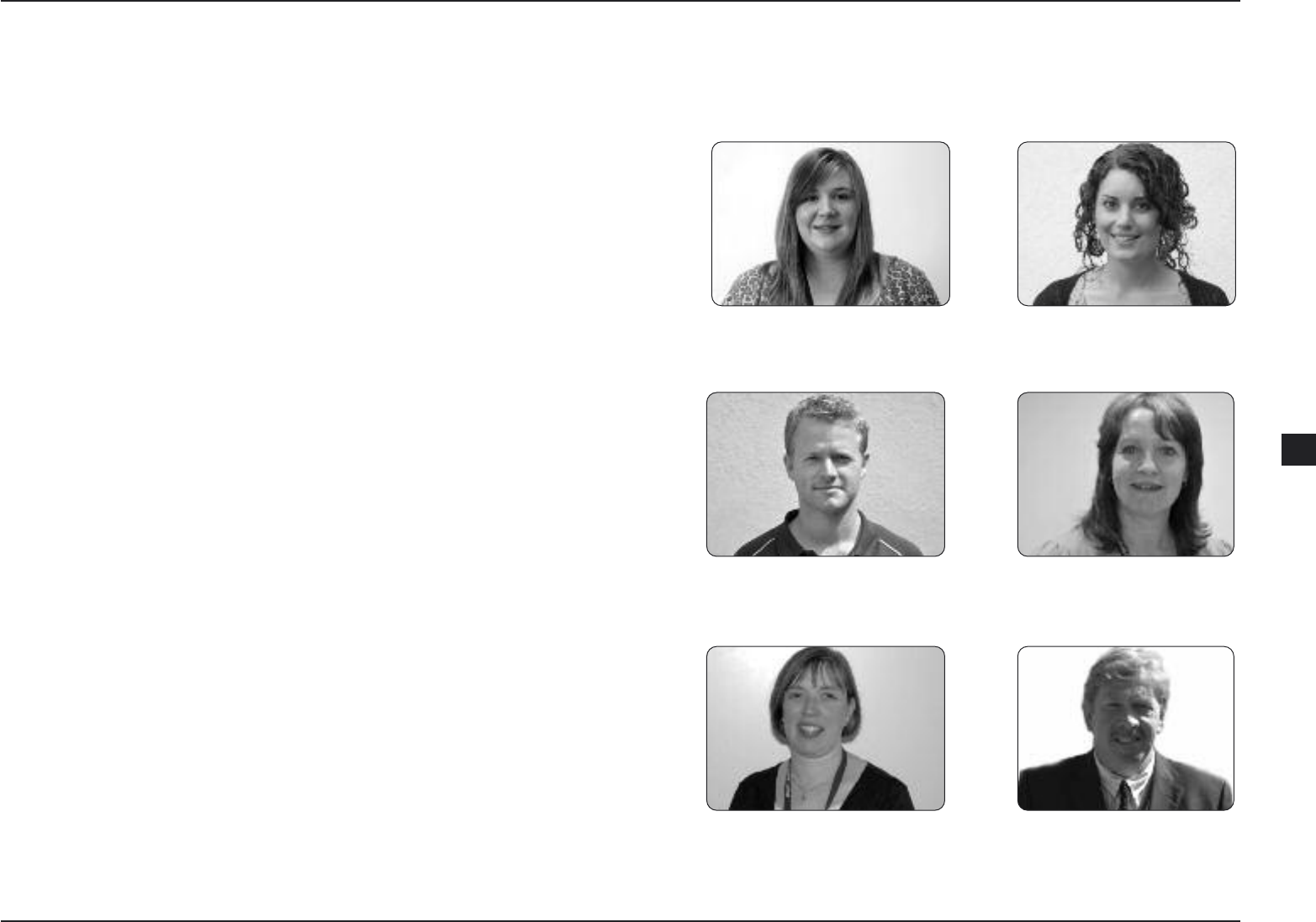
11
Year 8 Head of Learning:
Mrs R. Austin
Year 9 Head of Learning:
Mr J. Wilson
Form Year 8 Tutor Year 9 Tutor
SB (Saint Bernadette) Mr A. Owen Miss J. Dwyer
JB (John Bosco) Mrs C. Pearson Ms D. Easby
BH (Basil Hume) Mrs C. Davidson Miss T. Benson
MK (Maximilian Kolbe) Mrs B. Gorman Miss E. Hughes
OR (Oscar Romero) Ms L. Stearne Miss E. Hall
MT (Mother Teresa) Miss K. Bowden Mrs D. Sadler
VP (St. Vincent De Paul) Mr G. Griffiths Mr P. Leicester
TL (Thérèse of Lisieux) Mrs.L. Carroll Mr I Cook
Tutor Groups KS3
In Years 8 & 9, your child will be placed in a mixed Form Tutor
Group. Each group is named after a House Patron, a famous
Catholic Christian who as a witness to the Gospel encourages us
in our faith. Each Form will participate in a wide variety of House
Competitions through the year led by the Head of House who is
a Senior Member of staff. Your child will gain House Points
through their efforts in curriculum time and through participating
in a wide range of extra-curricular activities.
Year 8 Learning Coach:
Miss F. Clinton
Year 9 Learning Coach:
Mrs M. Reid
Assistant Head Teacher for KS3:
Mrs C. Singleton
Deputy Headteacher (Pastoral):
Mr S. Rylance
Key Pastoral Staff
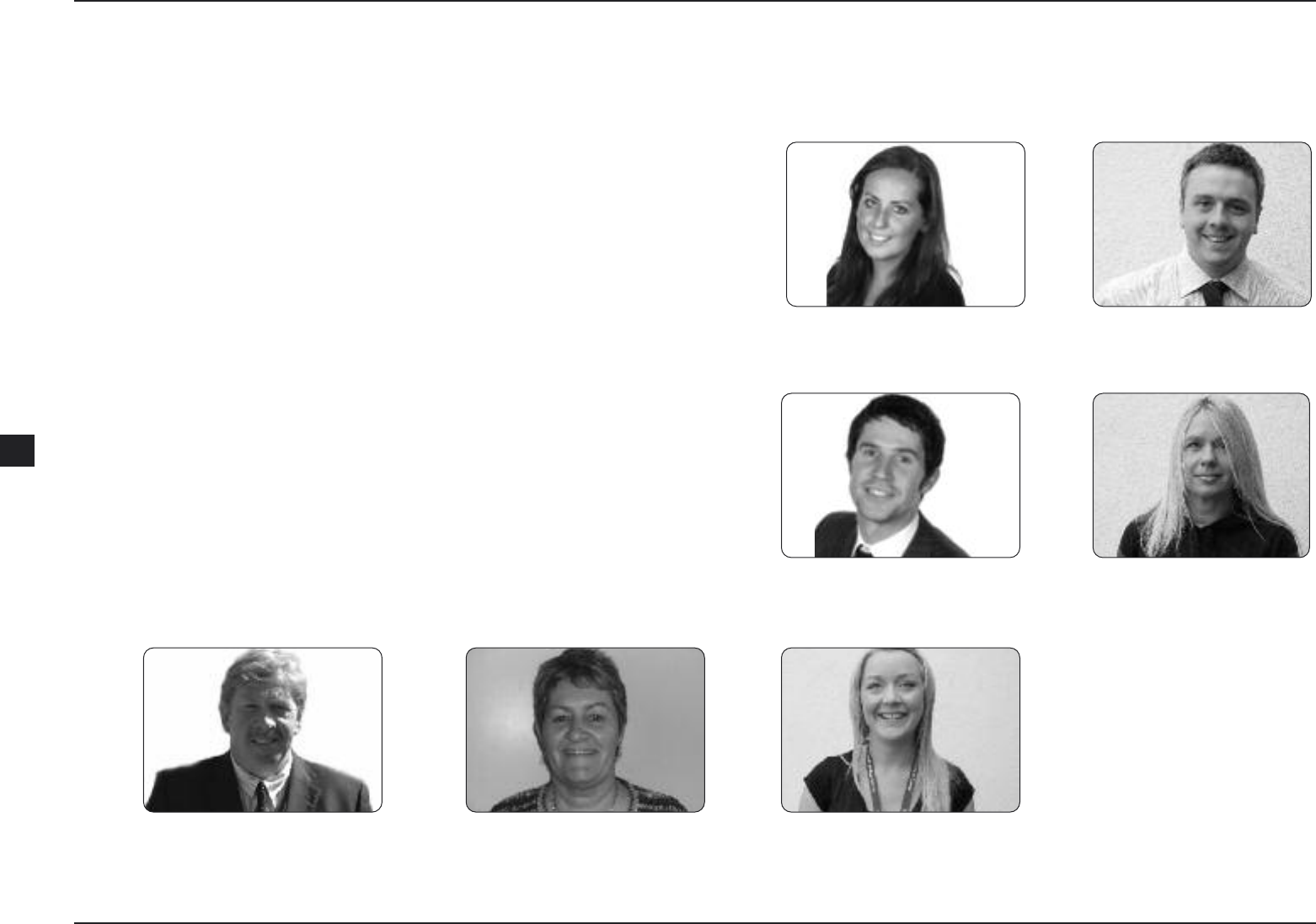
12
Year 10 Head of Learning:
Mrs C. McNeill
Assistant Head of Learning for
Year 10 Mr. M. Davies
Form Year 10 Tutor Year 11 Tutor
SB (Saint Bernadette) Mrs D. Crawford Mr M. Wilmshurst
JB (John Bosco) Mr S. Harvey Mrs A. Walker
BH (Basil Hume) Mrs M. Jones Mr P. Love
MK (Maximilian Kolbe) Mr A. Moore Mr K. Marsh
MT (Mother Teresa) Ms K. Fletcher Miss A. Walker
VP (St. Vincent De Paul) Miss H. Chadwick Miss A McGagh
TL (Thérèse of Lisieux) Ms H. Rossiter Mr H. Garland
OR (Oscar Romero) Miss N. McKenna Mr S. Meehan
Tutor Groups KS4
In Years 10 & 11, your child will be placed in a mixed Form Tutor
Group. Each group is named after a House Patron, a famous
Catholic Christian who as a witness to the Gospel encourages us
in our faith. Each Form will participate in a wide variety of House
Competitions through the year led by the Head of House who is
a Senior Member of staff. Your child will gain House Points
through their efforts in curriculum time and through participating
in a wide range of extra-curricular activities.
Year 11 Head of Learning:
Mr M. Coogan
Year 11 Learning Coach:
Ms J. Dyer
Year 10 Learning Coach:
Miss A. Sutton
Assistant Head Teacher for KS4:
Mrs C. Veitch
Deputy Headteacher (Pastoral):
Mr S. Rylance
Key Pastoral Staff

13
Life at SJP extends well beyond the classroom.
Throughout their seven years at SJP, students will
have the opportunity to go on major trips that
will broaden their horizons. Not only will each
subject area provide your child with regular
opportunities to extend their learning outside of
the classroom through curriculum linked projects,
trips and extra-curricular activities, our
international links are growing rapidly and
students are already involved in exchanges and
visits to parts of Europe, China, USA and South
America.
As part of our Catholic Christian ethos, we also
take very seriously our role as educators to ensure
that children leave the College with a strong
sense of their own mission and calling. When
they are ready for the outside world, we want
our students to leave with a desire to serve and
to become the next generation of leaders. We
call the preparation for this ‘ The SJP Experience’
which aims to develop the academic, professional
and character skills needed to be successful in
life, so that all students can make the most of
their abilities and interests and fulfil their true
potential.
Raising children's aspirations is extremely
important at SJP and we aim to develop the
understanding that learning (and the experiences
that take place within and around this learning)
can be the route to enhanced opportunities. We
want to encourage as many of our pupils as
possible to consider taking up further studies
after SJP. The experience of university is life-
changing and opens up doors to all kinds of
exciting possibilities. Working in partnership, we
will equip pupils with the experience, skills and
qualifications necessary to achieve their goals.
Year 7 pupils will reflect on their hopes and
dreams from early on. As they grow, we will give
them lots of opportunities to research where they
want to be in life, the qualifications they need to
get there and how they are going to achieve it.
Here at SJP we believe that celebration of
achievement plays a crucial role in preparing
students for a place at university, their career and
for lifelong success. The SJP Experience places
leadership and service at the heart of everything
we do and so it is vital that your child
participates in all aspects of school life. We know
that you will do everything to encourage them as
we journey together.
The SJP Experience
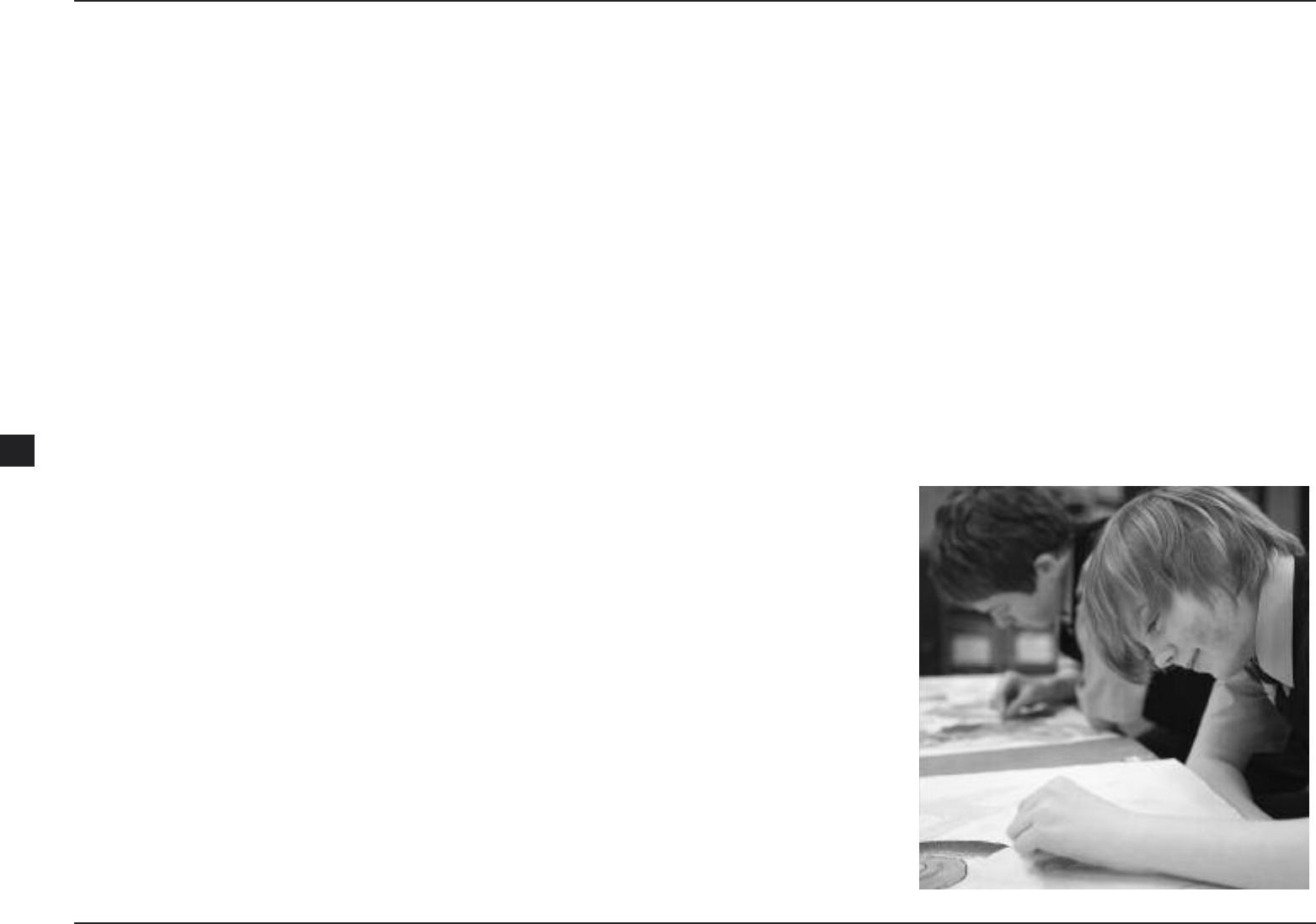
14
YEAR 8 is an important building block towards
future success. If this success is to follow, the
hard work in College must be matched by a
regular and sustained level of effort at home. Our
pupils have settled in really well and we now look
to ensure they have lots of opportunities to
develop their gifts and talents through a variety
of extra-curricular activities.
As part of your child’s on going development
within our college community and building upon
their successful Year 7 Experience to the Conway
Centre, we offer them in Year 8 a three day
residential experience that takes place in
Castlerigg Manor in the Lake District.
This experience takes place in the week
commencing 16th January 2012. While at
Castlerigg Manor our students will be involved in
team building games, outdoor activities and small
groups sharing activities. They will also be
encouraged to reflect on what’s important to
them in life; as well as having free time to enable
them to socialise together and build community.
Castlerigg Manor offers wonderful facilities to
our young people during their time there. The
Manor is set in 4 acres of mature grounds and is
situated less than 10 minutes walking time from
Keswick town centre. The front of the building
looks directly onto Skiddaw and Latrigg, while
the rear of the house gives a view over Derwent-
water to Borrowdale.
The experience is deliberately placed at the
beginning of the spring term as this allows
parents time to meet the cost of the experience
over a period of time. We believe that this year
group experience will provide our students not
only an enjoyable time together, but will also
enable them to develop both socially and
spiritually as they grow in maturity.
If you wish to discuss any matter pertaining to
the Year 8 Experience, please do not hesitate to
contact Mrs Austin (Head of Learning Year 8).
At certain points during the academic year, your
child may also have the opportunity to participate
in exciting and enriching subject specific activities.
These include the Science Club; going to see
“Scrooge the Musical;” a residential Performing
Arts trip to Ingestre Hall; a visit the International
Slavery Museum in Liverpool and to Quarry Bank
Mill; a trip to the Herpetological Society and a
Coastal Walk; an engineering competition; a visit
to Cadbury’s World and visits to a graffiti
workshop or local Art Galleries and Museums.
Throughout the year we will be working on our
hugely successful “Project Week” initiative. Pupils
work with staff in their Houses in a variety of
activities which culminates in a showcase
“exhibition” on the final day. Year 8 is an
important year in your child’s academic journey.
We look to maintain the high standards of
uniform and appearance they have set, the
excellent attendance records and their very
positive attitude they already have gained a
reputation for.
SJP Year 8 Experience 11/12
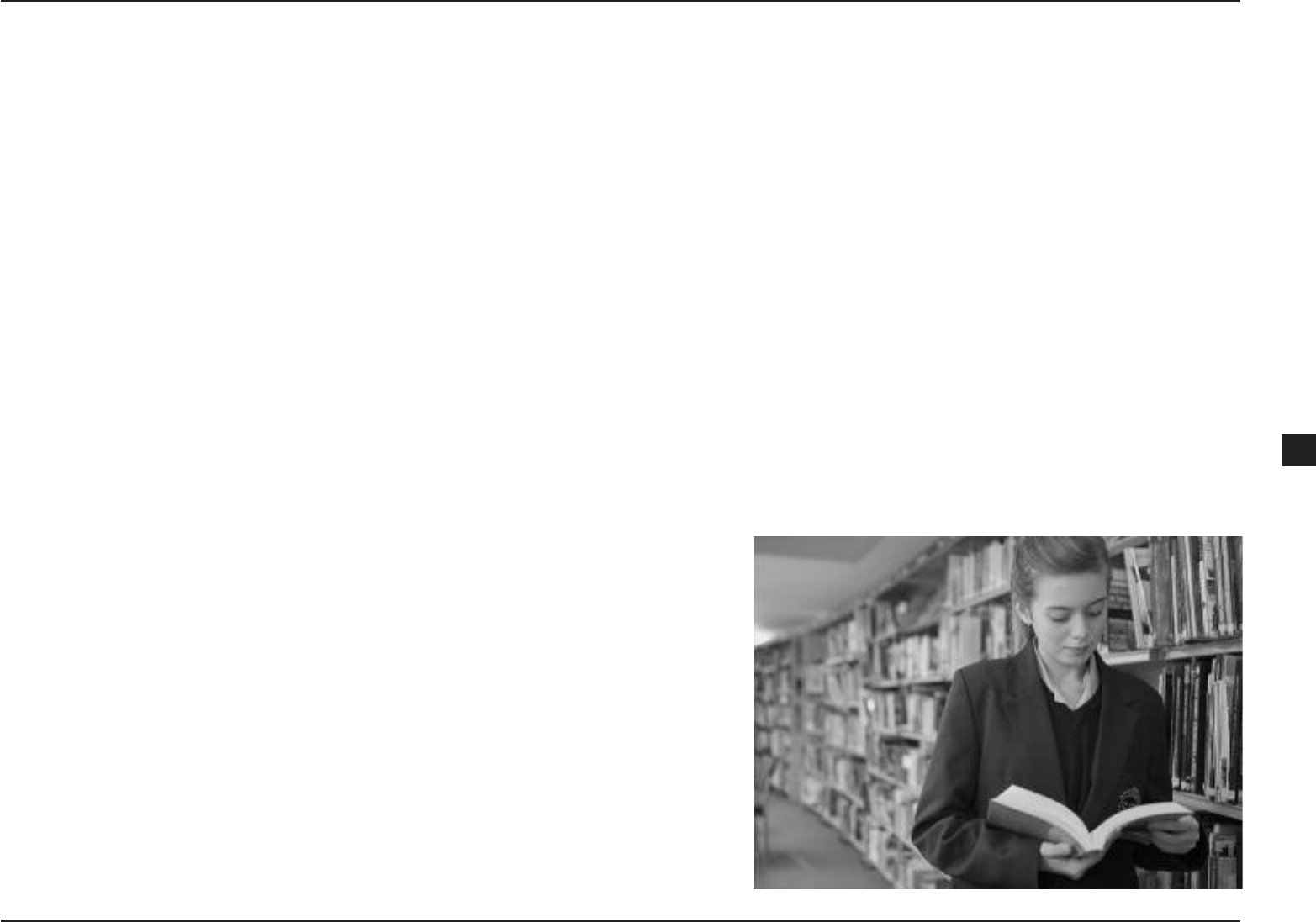
15
YEAR 9 is a crucial year in the build up to Key
Stage 4 and the start of the GCSE journey. This
year your son/daughter has already opted to take
a course in Design and Technology through to
GCSE level. On Thursday 15th March 2012 we
will host a KS4 information evening, following
which your son/daughter will be asked to choose
option subjects from the following: Art, Business
Studies, Health and Social Care, History,
Geography, D&T, ICT Music, Performing Arts,
and PE.
There will be many opportunities for Year 9 pupils
to experience a wide-range of extra-curricular
activities, including a residential Performing Arts
course at Ingestre Hall in Staffordshire. The
course provides opportunities to develop artistic
skills, increase motivation, creatively explore issues
and themes as well as building self-esteem and
social/team skills, all based in purpose-equipped
studios. (www.ingestrearts.org.uk) Drama and
Musical auditions will begin in September as well
as an opportunity to audition for a senior theatre
company. In History, pupils will have the chance
to visit the Maritime Museum in Liverpool as well
as the opportunity to visit the Battlefields of the
First World War in France and Belgium. Pupils will
also take part in an insightful experience with a
Holocaust survivor visiting SJP.
In Geography pupils will visit Blackpool to carry
out research for their Tourism unit. In MFL, pupils
can visit the magnificent city of Barcelona to
improve Spanish speaking skills and enjoy the
Spanish Culture. Pupils will also be encouraged to
take part in a variety of activities during the
European day of languages on the 26th
September. The RE department will be working
alongside the College Chaplain to host a variety
of spiritual experiences including a retreat that
pupils are invited to attend.
The College has a long tradition of pupils taking
part in the Duke of Edinburgh scheme. This year
we are offering more places than ever
before for Year 9 pupils to begin their
D of E Bronze Award. The Award is a
personal challenge with each
programme tailored to reflect the
individual’s abilities and interests. There
are distinct sections of the Award
which demand a real commitment –
these include: Service (helping people
in the community); Skills (covering
almost any hobby, skill or interest);
Physical Recreation (sport, dance and
fitness); Expeditions (training for,
planning and completing your journey
on foot). We hope that you will
encourage your son/daughter to take up this
tremendous opportunity for personal growth and
development.
If success is to follow, the hard work in College
must be matched by a regular and sustained level
of effort at home. Parents can support by
monitoring the quality and quantity of homework
set. Pupils should be doing a regular amount of
homework each evening and at week-ends. They
should be planning their work, not leaving it to
last minute to meet deadlines and ensuring they
are completing all work to at least their target
level.
SJP Year 9 Experience 11/12
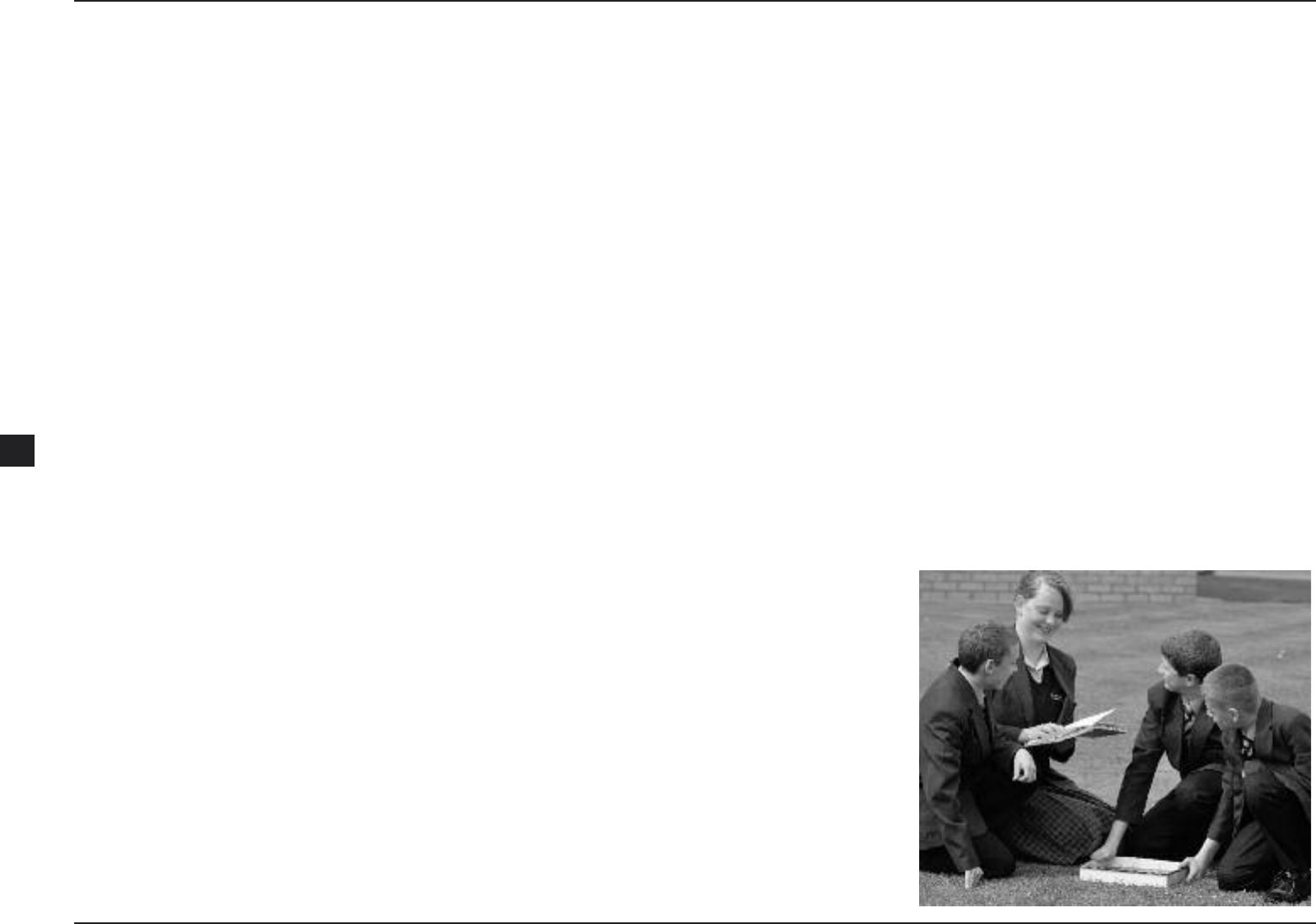
16
This year your son/daughter will sit full public
examinations in English Language, Science and
Maths as well as taking modules in Mathematics,
RE, History, French, Health & Social and
Geography. They will also have completed a full
GCSE qualification in ICT and will receive their
results in the summer. Some pupils are also
following B.Tech courses in PE, Business Studies
or Health & Social Care which are worth the
equivalent of 2 GCSEs. These subjects are
assessed throughout the year and therefore a
high standard needs to be consistently achieved
from the outset.
If success is to follow, hard work in College must
be matched by a regular and sustained level of
effort at home. Parents can support the College
by monitoring the quality and quantity of
homework set. Pupils should be completing a
couple of hours homework each evening and at
weekends. They should be planning their work;
not leaving it to the last minute to meet
deadlines and ensuring they are completing all
work to at least their target level. This is a vital
year as your child makes important progress
towards their academic qualifications which of
course are crucial to their future career prospects.
We know that with your support, we can help
make that journey as positive as possible.
All subjects offer extra support specifically aimed
at assisting pupils in achieving their potential in
their courses. We want our pupils to experience a
series of life enhancing opportunities and to
extend the boundaries of learning to beyond the
classroom. In Science, pupils will get the chance
to visit the world-famous Dynamic Earth
exhibition in Edinburgh. There will also be an
opportunity to compete in the Science Olympics.
Those students who have chosen to do Art this
year will get the opportunity to work with local
artists in a gallery environment.
Our Drama department, as well as working on
our school productions, will offer pupils the
chance to visit the West End Theatres and to see
a first class production. Pupils will visit the local
Empire theatre as part of the vocational course in
Performing Arts. Those pupils will be given
opportunities to work with professional actors
and directors from LIPA. Pupils will also have the
opportunity to showcase their talents at events
such as the Christmas Concert, SJP’s Got Talent
and the annual SJP Music Festival.
Those pupils who have chosen to study
Geography this year will participate in either a
residential or day trip to develop fieldwork skills
at Colomendy. Pupils studying History will also
get the chance to see an exhibition on the Cold
War to be staged at RAF Cosford where they
experience high ropes training. They will also
have an opportunity to visit Berlin as part of the
Cold War study programme.
In ICT pupils will use facilities at the Learning
Lighthouse for use of advanced software.
Business Studies pupils will have no time for
‘monkeying around’ as they complete a case
study at Chester Zoo, including a visit to the Zoo
itself. They will also have opportunities to have
first hand experience in industry.
In PE pupils will partake in leadership courses in
dance and multi sports with our primary feeders.
The DT Department intends to take pupils to the
Clothes Show Live event at the Birmingham NEC
and host a Master Chef Style competition.
SJP Year 10 Experience 11/12

17
Year 11 students will continue with Curriculum
subjects they began in Year 10 in what is their
most important year in their education so far.
Success in the summer of 2012 will depend upon
your child’s hard work both at school and at
home so your support in their studies is of
paramount importance.
Coursework still plays a crucial part in a number
of courses. All coursework must be completed
and handed in to meet deadlines and should
naturally be of the highest standard possible.
Your child’s teachers will discuss with you the
specific subject requirements for coursework at
the Year 11 Parents Evening on Thursday 29th
September 2011. Your attendance is crucial at
this evening.
If your child is to be successful it is vital that they
maintain a high level of effort in their homework
studies. Year 11 pupils should be doing at least
two hours of homework each evening, the tasks
should be planned as set out in the Learning
Programmes (issued to pupils and available
online). Please continue to monitor your child’s
homework by reading their planner and signing it
each week. Please do communicate any concerns
you may have both academically and pastorally in
the planner and we will get back to you at the
earliest opportunity.
Public examinations are ongoing throughout this
year. Your child will be issued with an individual
exam timetable. Please make a note of these
important dates and impress upon your child the
need for thorough revision.
We fully expect the vast majority of our pupils to
continue with us in 6th Form. The transition
process begins with the 6th Form Information
Evening which takes place on Thursday 2nd
February 2012. Final enrolment and confirmation
of subjects takes place on GCSE results day in
August 2012.
In this intensive year all pupils will have the
chance to go on a residential retreat. This is a
wonderful opportunity to relax, pray, build
community, reflect and discover hidden gifts and
talents. All Year 11 pupils will be given the
opportunity to apply for the China Experience.
This is a once in a lifetime opportunity to visit this
most exciting and vibrant of places!
All subjects offer extra support which aims to
help pupils achieve their potential in their
courses. Further opportunities that we encourage
your child to take advantage of include theatre
trips to see the play being studied in English or
Performing Arts. In History pupils can go on a
study tour to Berlin or Krakow, whilst in D&T
pupils’ work can be submitted to the Design
Awards Show in Manchester. ICT pupils will make
use of the multimedia facilities at the Learning
Lighthouse. Pupils will also visit the Apple Store in
Liverpool to see how they develop multi section
products. A programme of visiting artists in Art is
also planned this year. In Science pupils will have
the opportunity to participate in the Science
Olympics. All of this is in addition to the many
regular opportunities to take part in Sports and
Performing Arts activities! All pupils are
encouraged to engage in Year 11 weekly
assemblies, masses and special liturgical services
throughout the year. All of these extra-curricular
experiences are superb learning tools for your
child and we encourage you to support them
throughout their journey in Year 11.
To mark the hard work and effort made by Year
11 pupils during the year a Celebration Fancy
Dress Ball will take place in the summer term.
Discussions regarding this will take place
throughout the year via our form representatives
and year council.
SJP Year 11 Experience 11/12
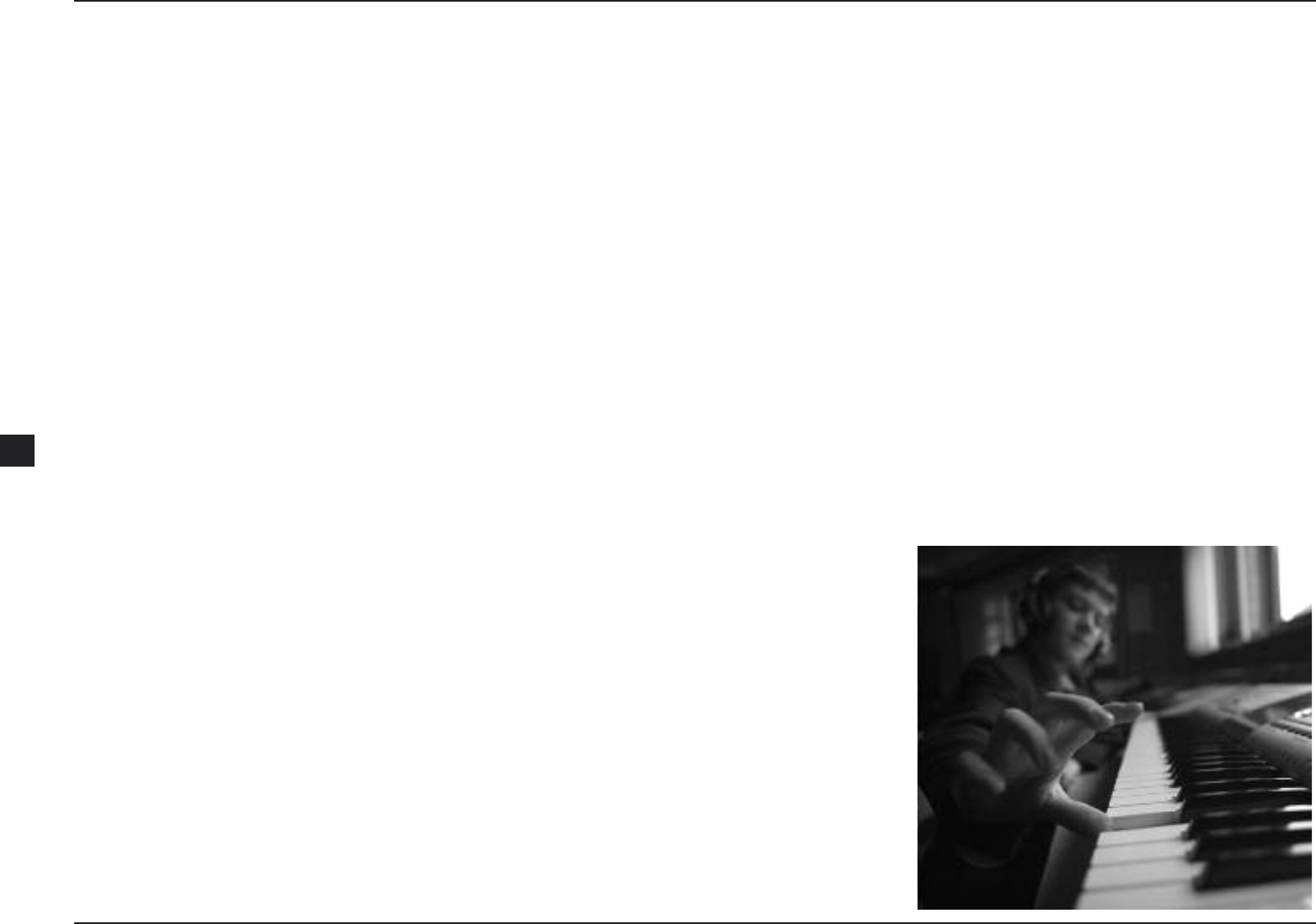
18
It is the responsibility of the College
• To provide a Catholic environment in which
pupils will develop spiritual and moral values
• To provide a safe and secure environment in
which pupils can develop academic, sporting
and cultural talents
• To develop in the College a true sense of
community
• To establish effective partnership and
communication with parents
It is the responsibility of parents
• To support the spiritual and moral
development of your child
• To ensure your child attends College in full
uniform and is properly equipped for the
school day
• To support the authority and discipline of the
College
• To take an active interest in your child’s
academic progress by supporting the College’s
homework programme and by attending
Review Meetings and other relevant activities
where possible
• To ensure they are fully aware of the College
policies by reading the Parental Handbook.
It is your responsibility as a pupil:
• To respect and support the Catholic values of
my College
• To attend in full uniform and arrive promptly
and properly equipped for each day
• To accept the authority of the College
• To do your best at all times.
Partnership Agreement
At SJP we know how important it is to build partnerships with parents. This builds strength in our community and
supports students in their development, spirituality and learning.
We rely on the commitment and support of all parents to make this partnership work. We often run events to support this partnership and are always open
to new ideas and feedback so please contact us whenever you feel the need to.
This is a summary of the Home-College agreement that Form Tutors, Parents and Pupils are asked to sign up to in the College Planner.
Working in partnership, anything is possible!
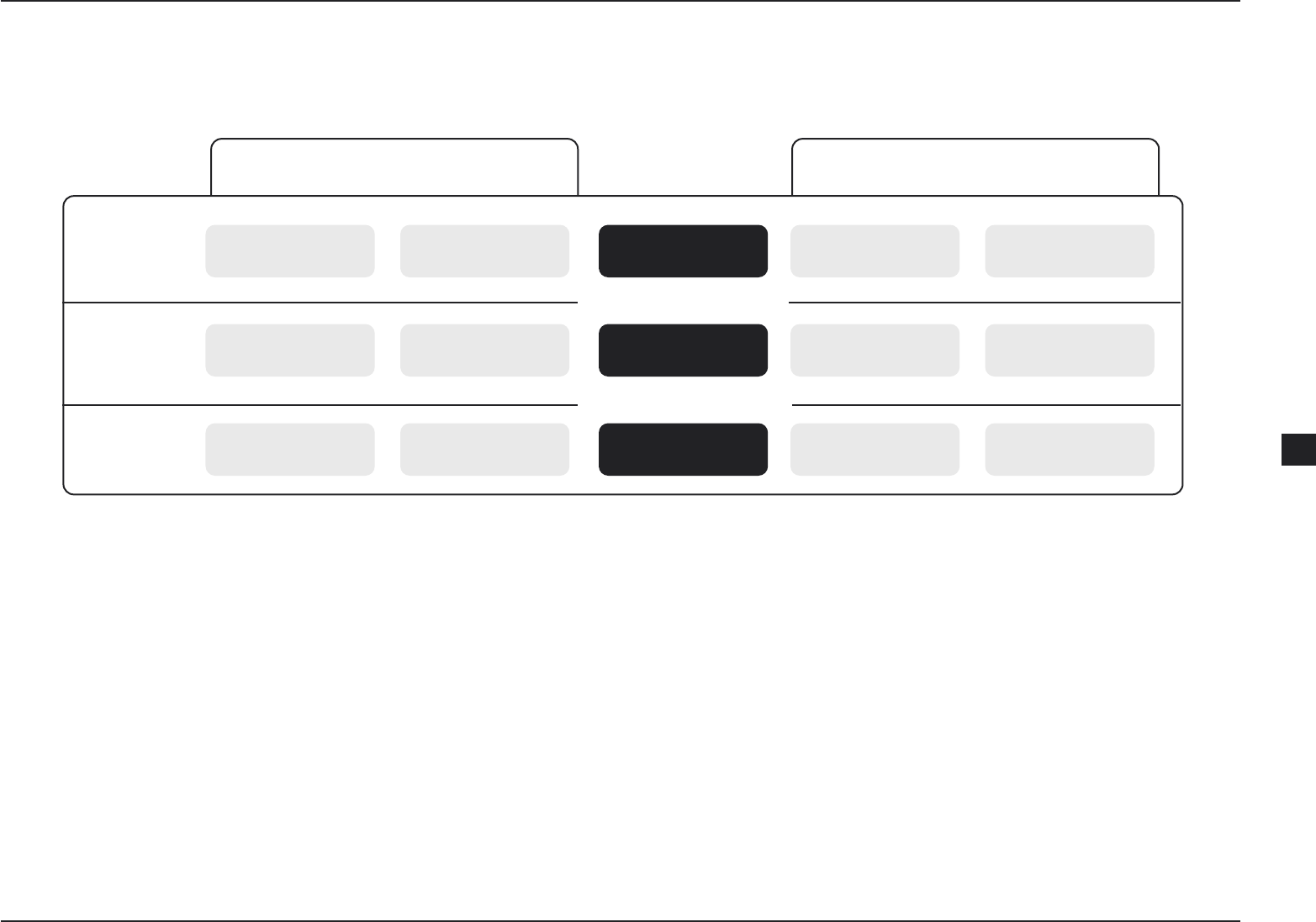
19
Monday
5 September 2011
Wednesday
4 January 2012
Monday
16 April 2012
Friday
21 October 2011
Friday
10 February 2012
Friday
1 June 2012
Monday
31 October 2011
Tuesday
21 February 2012
Monday
11 June 2012
Friday
16 December 2011
Friday
30 March 2012
Thursday
19 July 2012
Other useful dates:
Bank Holiday: Monday 7 May 2012
School Closed Monday 2 July 2012 -
Day in lieu of Queen’s Jubilee
Open Evening: Thursday 15 September 2011
Open Mornings: Tuesday 20 September 2011 /
/ Wednesday 28 September 2011
Awards’ Evening: Thursday 20 October 2011
Here Comes Christmas: Friday 2 December 2011
The SJP Nativity: 13, 14, 15 December 2011
Music Festival: Thursday 13 September 2011
SJP Unplugged: Tuesday 28 February 2012
West Side Story: 20-21 March 2012
Dance Revolution: Thursday 26 April 2012
Parents’ Consultation Days
Year 7 & 10 Review Day: Friday 11 November 2011
Year 8 & 9 Review Day: Friday 13 January 2012
Year 11 Parents’ Evening: Thursday 29 September 2011
Sixth Form Parents’ Evening: Thursday 6 October 2011
Sixth Form Information Evening: Thursday 2 February 2012
KS4 Information Evening: Thursday 15 March 2012
Term Dates
September 2011 - August 2012
Start Finish Start Finish
Autumn
Term
Spring
Term
Summer
Term
First Half
Second Half
Half-Term Break
Christmas Break
Half-Term Break
Easter Break
Half-Term Break
*Information will also be available on the College Website www.stjohnplessington.com
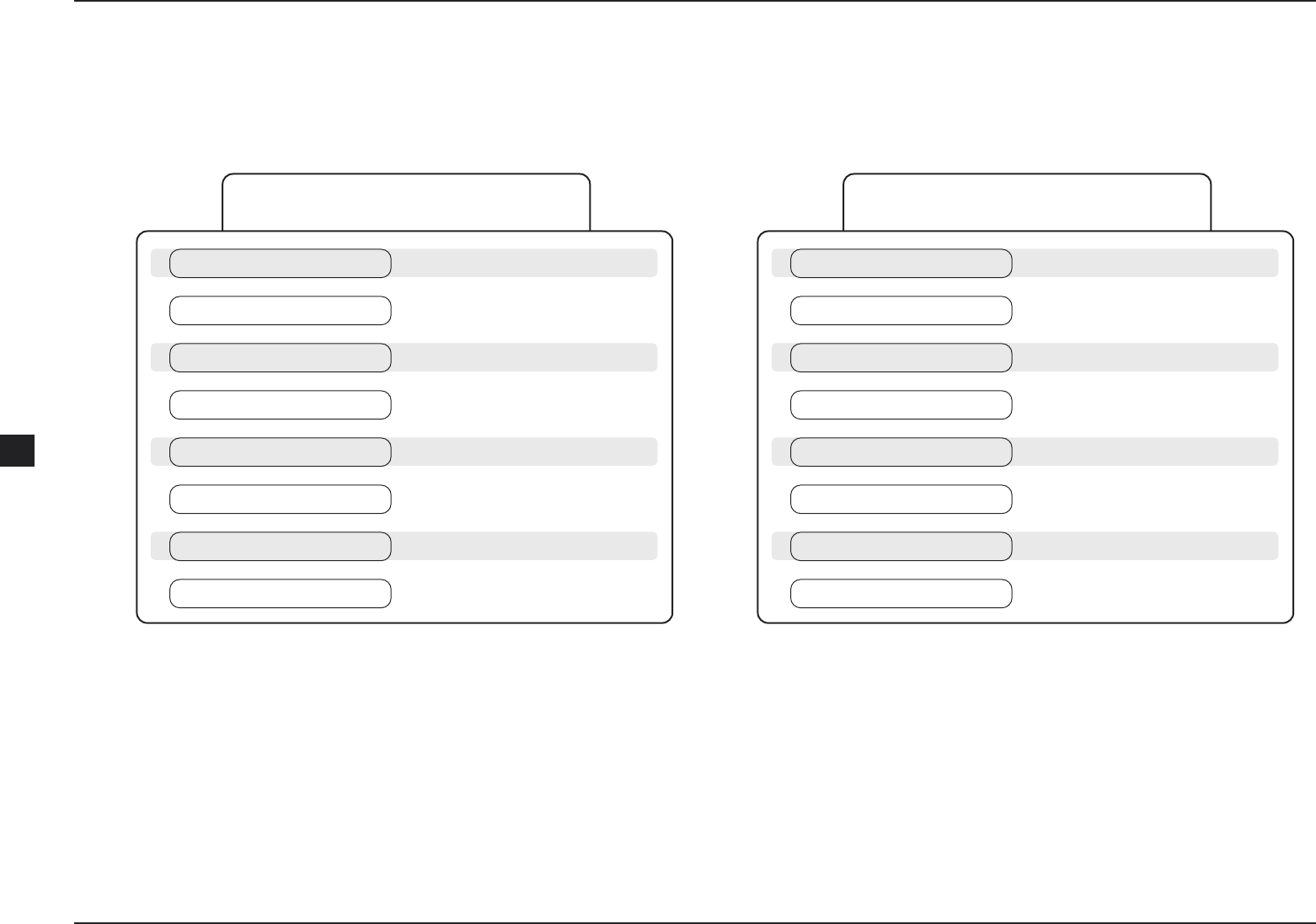
20
All pupils in the College follow a timetable that runs over a two-week period. These time-tables should be recorded in the College Planner. It is always
useful if a copy of the time-table is kept in a prominent place at home to help in the early days of organisation. The time-tables will be given to pupils on
their first day of the Autumn Term. It will highlight the Subject, Subject teacher and classroom.
Timetable
Years 7, 8 & 6
th
Form
08.40 - 09.40am Period 1
09.40 - 10.40am Period 2
10.40 - 11.00am Break
11.00 - 12.00pm Period 3
12.00 - 12.50pm LUNCH
12.50 - 1.20pm Academic Review
13.20 - 14.20pm Period 4
14.20 - 15.20pm Period 5
Years 9, 10 & 11
08.40 - 09.40am Period 1
09.40 - 10.40am Period 2
10.40 - 11.00am Break
11.00 - 12.00pm Period 3
12.00 - 12.30pm Academic Review
12.30 - 1.20pm LUNCH
13.20 - 14.20pm Period 4
14.20 - 15.20pm Period 5
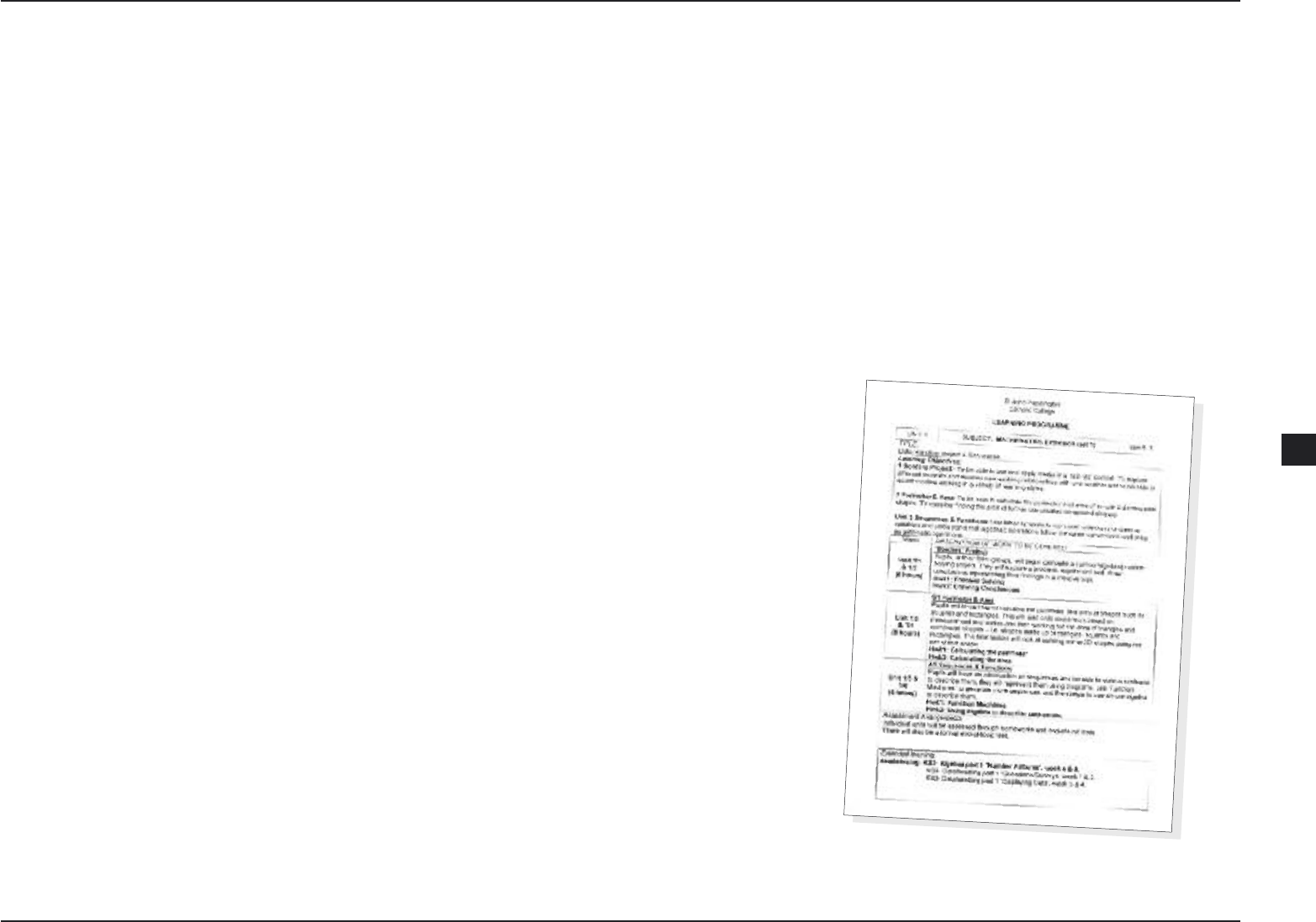
21
All pupils at SJP follow a Learning Programme in
all subjects each half-term. The LPs are available
on the College Website for Parents and Pupils to
access from home. They detail the programme
of study for each subject, setting out the
knowledge, skills and understanding your child is
expected to be taught. The Learning Programmes
also signpost the Assessment procedures
including the homework that will be set each
week.
It is really important that parents take an active
interest in the learning that their child is
experiencing. By following the Learning
Programmes, parents can supplement the work
being done in College through further
enrichment activities or independent study .
The Learning Programmes cover the content
required by the new National Curriculum in the
following subjects at Key Stage 3 (Y7-9):
Religious Education, English, Mathematics,
Science Design & Technology, Information
Communication Technology, Art, Citizenship,
Drama, Geography, History, Music, Physical
Education.
In Years 7 and 8 pupils are mainly taught in
mixed ability groups apart from English, Maths
Science and Modern Foreign Language, where
they are set according to ability.
Reports
At the end of each Learning Programme, that is,
every half term, you will receive a report which
will give you information about your child’s
progress in the subjects they are studying and an
indication of their end of year and end of key
stage targets.
Both effort and attainment are assessed so that
you can see the fullest possible picture of your
child’s progress during the year. All pupils transfer
their progress grades into their planners and
exercise books so they too can see how well they
are doing. As well as half termly reports parents
will receive an Achievement Plan each term.
Achievement plans are written by our Learning
Coaches who are attached to each Year Group.
Learning Coaches meet with every pupil in the
Year Group once a term to review their overall
progress and achievements, and to set
personalised targets for improvement.
Consultation Days
Consultation Days are held once a year when you
will have opportunity to discuss your child’s
progress in their Learning Programmes more fully
with subject teachers. The rest of the College
closes for the day for those pupils not involved in
those meetings. An appointment system is in
place so that you can choose times suitable to
your day. A letter is sent out well in advance
informing you of times and dates.
Curriculum
Learning Programmes
‘Exemplary, rigorous and regular assessment ensures all students know how well they are doing…’ (OFSTED)
‘The teaching of students’ academic progress is exemplary.’ (OFSTED)

22
Attainment Targets
Attainment Targets are arranged in eight levels
except for in Citizenship. Level 1 represents the
easiest level and Level 8 the hardest. An average
ability pupil starting at SJP would be expected to
be achieving around Level 4 although this may
differ depending on the subject. By the end of
Year 9 an average pupil should be achieving
around Level 5 or 6. Pupils will be assessed each
half term by their teachers in a variety of ways
and will also undertake end of year examinations
in each subject.
Key Stages
The National Curriculum is divided into Key
Stages which cover a number of years. During
the first three years at SJP (Years 7 to 9) your
child will follow KS3. At the end of KS3 in Year 9
your child will take SATS tests in English, Maths
and Science. During Year 9 pupils will decide on a
range of subjects they wish to study at KS4 in
Years 10 and 11.
At Key Stage 4 (Y10-11):
Pupils choose amongst a number of subjects in
which they will gain either GCSE or BTEC
qualifications. Core subjects such as English,
Maths, Science, RE, MFL, and PE will be studied
by all pupils. Pupils sit some of their GCSEs in
Year 10 which provides them with a head start in
Year 11.
At Key Stage 5 (Y12 and 13):
Most of our pupils continue into our 6th form at
the end of Year 11 to study a range of subjects at
AS and A2 level, and BTEC. Amongst the subjects
already offered at KS4, pupils have the opportunity
to study new areas such as Psychology, Sociology
Law, and Travel and Tourism.
Extra-Curricular Activities
The extra-curricular life of the College is rich and
varied. SJP offers pupils a wide range of activities
extra to the normal timetable, either at lunch
time or after school, providing pupils the
opportunity to meet, teach and learn from each
other in a relaxed and perhaps less academic
atmosphere.
Your child can pursue their interests in:
Football Cricket
Athletics Basketball
Netball Badminton
Trampolining Rounders
Dance Leadership awards
Fitness Softball
Gymnastics Hockey
Rugby Cross country
Duke of Edinburgh Award Choirs
Brass Band Debating Society
Science / Art / Drama club ICT / Textiles club
We are proud of the opportunities for pupils to
participate in a wide variety of dramatic and
musical performances throughout the year. Every
child in Year 7 has the opportunity to take up a
musical instrument free of charge.
All of Year 7 are involved in a 3 day residential
experience at the Conway Centre in North Wales
as part of their induction process into the life of
the College.
Project Week
During the Summer Term, pupils and staff will
take part in ‘Project Week’. This could be with a
focus on Performing Arts, Humanities or Sciences.
The normal timetable is interrupted and pupils
will participate in a wide variety of activities.
This involves creative activities, problem-solving
tasks, research projects and more. Project week
culminates in a Project Exhibition, when parents,
Governors, sponsors and the community are
invited into College to view the pupils’ work and
achievements.
Curriculum Continued
“The College provides students with an impressive variety of extra-curricular activities.”
(OFSTED)

23
Homework
Homework is an important part of College life at
SJP and all pupils are expected to do it regularly.
Homework is signposted in the Learning
Programmes. Pupils record homework in their
Planner. This should help your child and you to
keep a check on homework. If problems arise
then we would ask you to contact your child’s
Head of Learning or write any comments in their
Planner. Planners are checked weekly by Form
Tutors to ensure your child is receiving homework
on a regular basis.
E-learning
As a Technology College we make every effort to
ensure that your child has access to the latest
technology to enhance their learning experiences.
There are over 600 computers available to pupils
in the College. Every classroom is equipped with
an Interactive Whiteboard and every teacher has
a laptop to facilitate the teaching and learning
process. At SJP pupils can use the Virtual
Learning Environment (VLE) to complete
homework, and for absent pupils, to continue
learning from home. The VLE develops pupils’
independent learning skills and allows them to
have more control over how and when they
work. The VLE enables pupils to access learning
materials created by their teachers. Work is
marked and returned within the VLE. This also
means that pupils will not be able to lose or
forget their homework! As parents, you are able
to access your child’s personal home page to
keep track of their work, their progress and their
curriculum. The VLE can be accessed via the
College website.
The College subscribes to a number of e-learning
websites to support our pupils, which SAM
Learning has proven to improve exam results
through exam practice and related revision. We
also subscribe to MyMaths.co.uk which is also
very popular with pupils. Sometimes homework is
set requiring pupils to use these on-line sites. If it
is not possible to use them at home, we can
make arrangements for access to ICT suites in
College outside task hours so no-one is at a
disadvantage.
Additional Needs Students
The College follows the Special Educational
Needs Code of Practice (2001) and uses the same
definition of special educational needs i.e.
Students have special educational needs if they
have a learning difficulty that calls for special
educational provision to be made for them. The
school recognises that provision for pupils with
special educational needs is the responsibility of
the whole school and that all teachers are
teachers of pupils with special educational needs.
The aims of the special educational needs policy
are:
• To enable pupils with special educational needs
to have their needs met
• To take into account the views of the pupils
with special educational needs
• To encourage good communication with
parents of children with special educational
needs
• To facilitate full access to a broad, balanced and
relevant education, including the National
Curriculum, for pupils with special educational
needs. Some pupils receive additional support
from a Teaching Assistant in the classroom.
Some pupils may have a modified curriculum.
Departments ensure classroom organisation,
teaching materials, teaching style and
differentiation are such that all pupils, including
those with special educational needs, can learn
effectively.
Whilst we recognise national programmes for
Gifted and Talented pupils, we believe all our
pupils to be gifted and talented in many different
ways. We ensure that everybody has access to
excellence and that whilst there are many pupils
who are identified as Gifted and Talented, the
learning of all pupils is given equal priority. As
with all pupils, stretching and challenging tasks
are provided for G&T pupils in their subjects, as
well as extra-curricular classes and workshops.
Their progress is monitored after every half term
progress report.
Curriculum Continued
“Students with learning difficulties and / or disabilities do particularly
well, as a result of the excellent support they receive.” (OFSTED)

24
Homework Set
Pupils should record here when a teacher sets homework. They will be given time to do this in
the Lesson. They should record as follows: LP 1:4. This refers to the Learning Programme they
are following. In this case it was LP 1 (Autumn Term) Week 4.
The Learning Programmes are also available on our website (www.stjohnplessington.com - on
the curriculum tab). It may be that the teacher also sets an extension task – there is room
therefore for some additional comments to be written in.
Due in
Pupils will be given a clear deadline of when the work is expected in. They record the date
the work is due in. e.g. 03/10/11
Done
When the work is completed, pupils are reminded to tick the box. This helps their
organisation and also helps parents and Form Tutor to monitor what homework is still
outstanding.
The Homework Record page will give a clear picture of what homework has been recorded. If you feel that your child
is not getting homework in line with the Learning Programme please contact the Form Tutor in the first instance. This can be done
via the planner.
Parent /Teacher Comments
The right hand page provides an opportunity for parents and teachers to communicate via the
planner. For example, parents may wish to provide a reason why a homework has not been
completed or indicate difficulties with a particular homework. It may be that the Form Tutor has
a concern over a Uniform and Appearance/ Equipment issue and wishes to flag this up to
parents. The space also provides the opportunity for Parents to be reminded of any important
events which are coming up.
Parent’s/FT’s Signature
Please can parents make sure that the Planner is signed each week-end for the appropriate
week . Each Monday, Form Tutors will be signing the Planner in Academic Review and it is
expected that every pupil will have a parental signature to say they have checked the planner.
House Points
Each week pupils total up the number of new House Points they have earned in that period.
These will be recorded by Form Tutors and put on the House Recording database which will
result in Rewards both for individuals and for Houses.
Pupil Planner
Pupils are given a Pupil Planner at
the beginning of Autumn Term in
which they are able to record
information including homework,
involvement in activities, half- termly
progress grades, notes, and
achievements. The Planner is an
important document which all pupils
in College are expected to use and
value. It should be brought to
College at all times and under no
circumstances should there be any
signs of graffiti. It is a vital means of
recording homework and
achievement and a means by which
you can communicate with teachers
and vice versa.
We would ask that each week you
check the Pupil Planner is being used
properly and sign your name at the
bottom of each week’s page. Form
Tutors will also check regularly that
the Pupil Planners are being used
properly so that together we can
monitor the progress and
organisation of your child’s work. If,
for any reason, your child loses their
Pupil Planner, they will be expected
to pay the full cost for a replacement
immediately.
Curriculum Continued How to use the planner
M
o
n
da
y
0
8
/
0
9
Tue
sday
0
9
/
0
9
Wed
nes
d
a
y
1
0
/
0
9
T
h
ur
s
day
1
1
/
0
9
Fr
iday
1
2
/0
9
T
h
i
s p
ag
e
is
f
o
r
co
mm
u
n
ica
t
io
n
w
it
h
C
o
lle
g
e. St
af
f
w
ill
also
n
o
t
e an
y
p
ro
b
lem
s wit
h
h
o
m
ew
o
rk, eq
u
ip
m
en
t
o
r a
p
p
ea
r
an
ce
. H
o
u
se P
o
in
t
s a
n
d
o
t
h
er a
c
h
ievem
en
ts
w
il
l
al
so
b
e r
ec
ord
ed
h
ere
.
Pa
rent
/
Te
ac
h
e
r
C
o
mmen
t
s
House
po
int
s thi
s
w
eek
:
Par
en
t’s
Si
g
nat
u
r
e
Fo
r
m T
u
to
r’
s
Signa
tur
e
S
ub
je
c
t
H
ome
wo
r
k
S
e
t
D
u
e
i
n
D
on
e
W
eek
C
o
m
m
en
c
i
n
g
0
8
/
0
9
/
0
8
H
o
m
ew
o
r
k
Rec
o
r
d
A
r
t
D
es
i
g
n
a
n
d
T
ec
h
n
o
l
o
g
y
E
n
g
l
i
s
h
G
e
o
g
ra
p
hy
H
i
s
t
o
r
y
I
C
T
M
a
t
he
m
at
i
c
s
M
F
L
M
u
s
i
c
P
er
f
o
rm
i
n
g
A
r
t
s
/
D
ra
m
a
R
E
S
c
i
e
n
c
e
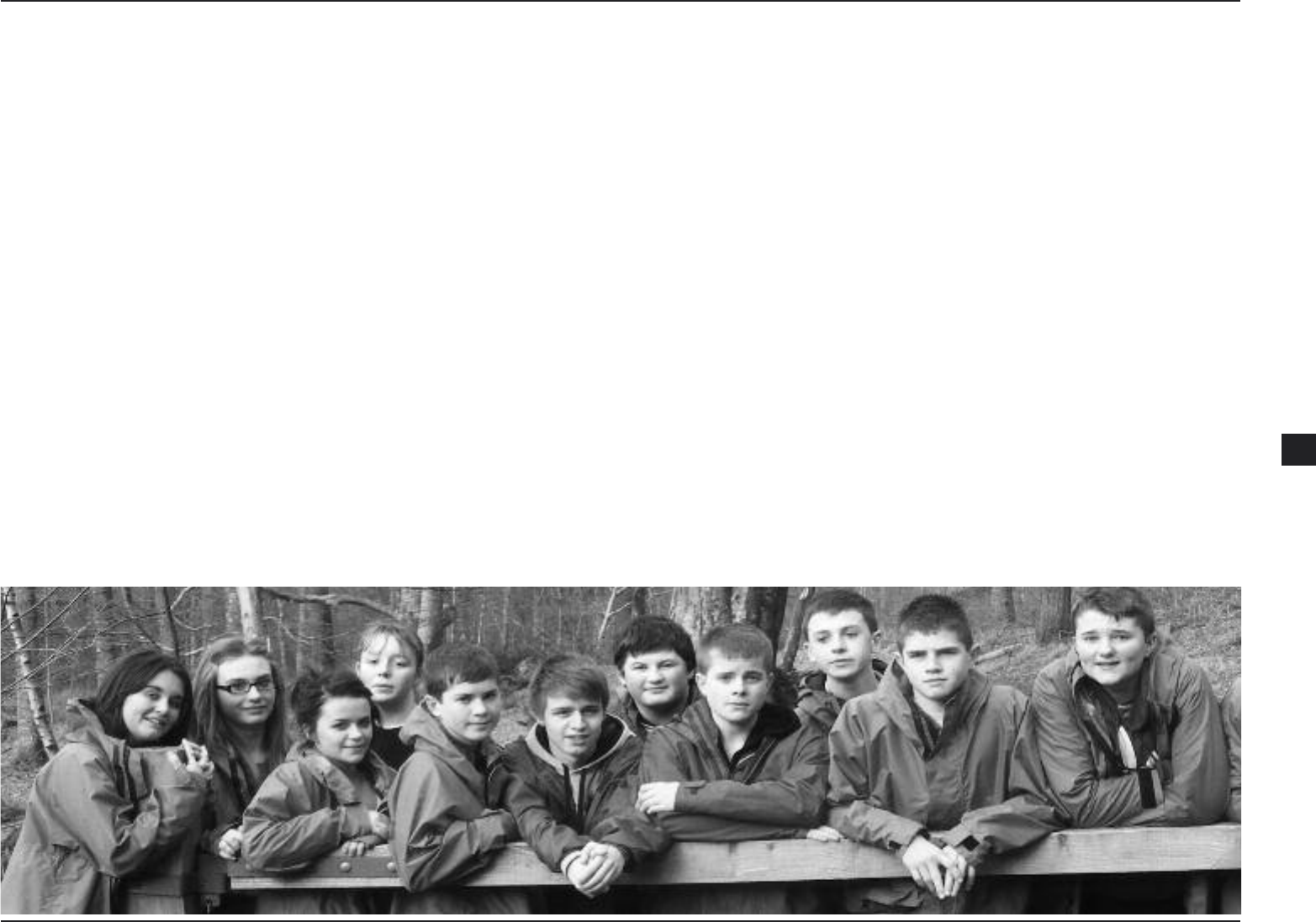
25
Visits and Trips
During your child’s time at SJP there will be many
opportunities for visits and trips to support and
extend the curriculum. These will include overseas
visits to a variety of European countries including
Spain, Germany, Poland and France. In Year 10 &
11 pupils currently have the opportunity to go on
exciting and life-changing visits to Peru and
China. Pupils also have many opportunities to
engage in local study visits.
Each year your child will also have the
opportunity to attend a Retreat which is
organised by our College Chaplain (Rev. Gerard
Boyle) and which gives opportunity for pupils to
reflect and participate in spiritually enriching
activities.
The ‘SJP First Steps’ experience at the Conway
Centre will, among other things, focus on
different styles of learning, listening and thinking
skills in preparation for the challenges of the
Curriculum ahead of them.
Costs of Visits
The College seeks to ensure that the costs of any
visit are kept to a minimum and will look to
subsidise visits wherever possible. However, in
order that these visits can take place a letter is
always sent home well in advance of the visit
asking for a parental contribution to be made.
If there are genuine financial difficulties we would
ask that you contact your child’s Head of
Learning to discuss the matter.
Curriculum Continued
‘The students were a credit to themselves, their parents and their
teachers. It was a pleasure and privilege to have them in the Cathedral.’
(Dean of the Cathedral)
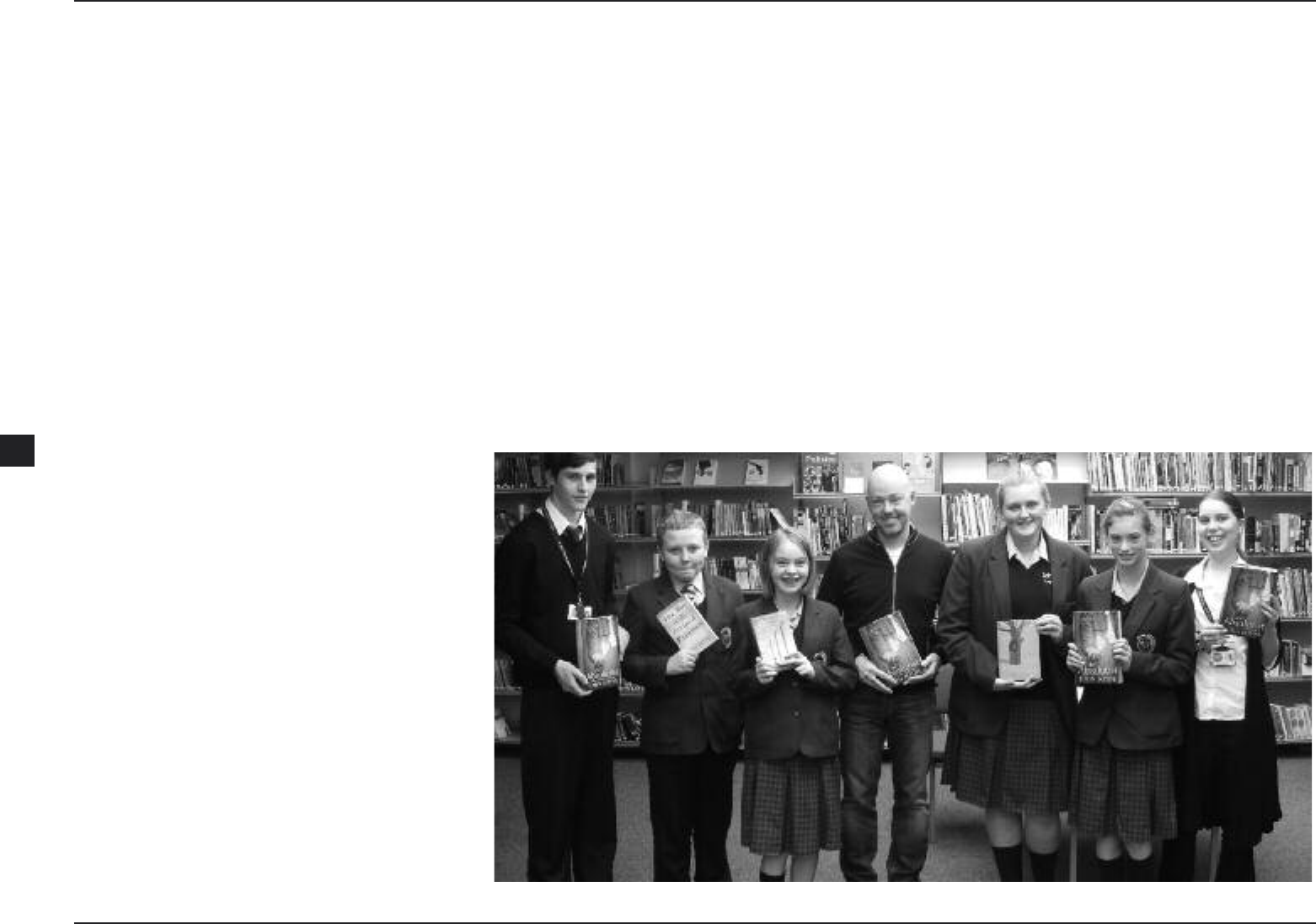
26
Site
The Library takes pride of place just above the
entrance to the College. Part of the newest
section of the College, it is spacious and well-
equipped.
Stock and Facilities
The Library contains:
• A wide range of fiction for years 7 – 11 and
6th form
• Nonfiction books to help with study and
research
• Magazines, newspapers and foreign language
resources
• Careers information and university prospectuses
• A suite of computers with internet access
Staffing
The School Library is managed by a full-time
Librarian supported at lunchtimes and break
times by a team of Pupil Library Assistants.
Mrs J Broom is available throughout the day to
help and advise library users.
To find out more about joining our team of Pupil
Library Assistants, see Mrs Broom in the Library.
Use
The School Library enjoys a whole variety of uses
- individual study, whole class use, small group or
individual research for projects and homework,
word-processing, information seeking on the
Internet, and recreational reading in a friendly
environment with resources and help always on
hand.
Accelerated Reader is an exciting programme
used by our Year 7 and 8 pupils. Available in the
library and through the internet it gives keen
readers a chance to collect points for each book
they read. Certificates are awarded when plenty
of books have been read. Pupils are encouraged
to take part in this programme through the Silent
Reading opportunity in Academic Review each day.
College Library
The College’s large and vibrant Library is valued by the whole College, from Year 7 right through to
Year 13. Throughout the day both pupils and staff can be found making the most of the excellent study and research
facilities available, as well as taking the opportunity to sit and read the latest fiction.

27
The College has its own uniform and PE kit which
has been selected so that pupils will feel part of
the College community. Items of clothing have
been chosen carefully so that they are not unduly
expensive, but are smart. It is the policy of
College that uniform should be worn by all pupils
and students in our Sixth Form. This is because
personal presentation is important in the world of
work and we want to make sure that our pupils
develop a sense of pride in how they are turned
out. We would advise that all items of clothing
are clearly marked with your child’s name.
BOYS Y7-11
• BLAZER – French navy blazer with SJP logo
(please note that the colour of the lettering on
the badge is different for each year group)
• JUMPER – Navy, with SJP logo (a sleeveless
version is also available);
please note that a College jumper is compulsory
from the beginning of September onwards
• SHIRT – Light blue shirt (short or long-sleeved)
TSP 214
• TIE – SJP tie (navy/silver stripe)
• TROUSERS – Black trousers TVT776, TBT736 or
TBT796
• SHOES – Plain black shoes – without logos
(please note that black training shoes, pumps,
fabric shoes or boots are NOT acceptable)
• COLLEGE BAG An SJP College bag is
compulsory for Year 7-9.
There are 4 styles of bag available cost £4-£10.
(The bags will be personalised free of charge by
Wirral Uniform Centre) For Years 10 & 11,
pupils must have a bag for College. There are
only 4 styles of bag which are permitted in the
following styles: Satchel, rucksack, sportsbag,
drawstring. Handbag / fashion style bags will
not be permitted.
• COLLEGE SCARF – An SJP College scarf is now
Available from Wirral Uniform Centre. This is
optional but if pupils choose to wear a scarf,
only the College scarf is allowed.
GIRLS Y7-11
• BLAZER – French navy blazer with SJP logo
(please note that the colour of the lettering on
the badge is different for each year group
• JUMPER – Navy, with SJP logo (a sleeveless
version is also available);
please note that a College jumper is compulsory
from the beginning of September onwards
• BLOUSE – Light blue revere collar blouse (short
or long-sleeved) TRL74 or TRH554
• SKIRT – Checked skirt (Bedford Check)
OR TROUSERS – Black trousers JWT446
• TIGHTS – Navy or black plain tights (not
patterned) (TN0710[N] or TN0790[B]) OR
SOCKS – Knee-length plain navy socks
• SHOES – Plain black shoes – without logos
(please note that ‘fabric shoes, pumps or boots
including ‘Kicker’ style boots” are NOT
acceptable)
• COLLEGE BAG An SJP College bag is
compulsory for Year 7-9 pupils.
There are 4 styles of bag available cost £4-£10.
(The bags will be personalised free of charge by
Wirral Uniform Centre) For Years 10 & 11,
pupils must have a bag for College. There are
only 4 styles of bag which are permitted in the
following styles: Satchel, rucksack, sportsbag,
drawstring. Handbag / fashion style bags will
not be permitted.
• COLLEGE SCARF – An SJP College scarf is now
Available from Wirral Uniform Centre. This is
optional but if pupils choose to wear a scarf,
only the College scarf is allowed.
PE UNIFORM BOYS Y7-11
COMPULSORY ITEMS
Navy blue hooded sweatshirt with house initials
printed on the back
Navy blue polo shirt
Navy blue football shorts
Navy blue football shirt
Navy blue (with white) football socks
Football boots
Shin pads
OPTIONAL ITEMS
Navy blue rugby shirt
Navy blue tracksuit (strongly recommended)
Uniform and Appearance
All items of uniform are available from:
Wirral Uniform Centre, Birkenhead Town
Centre
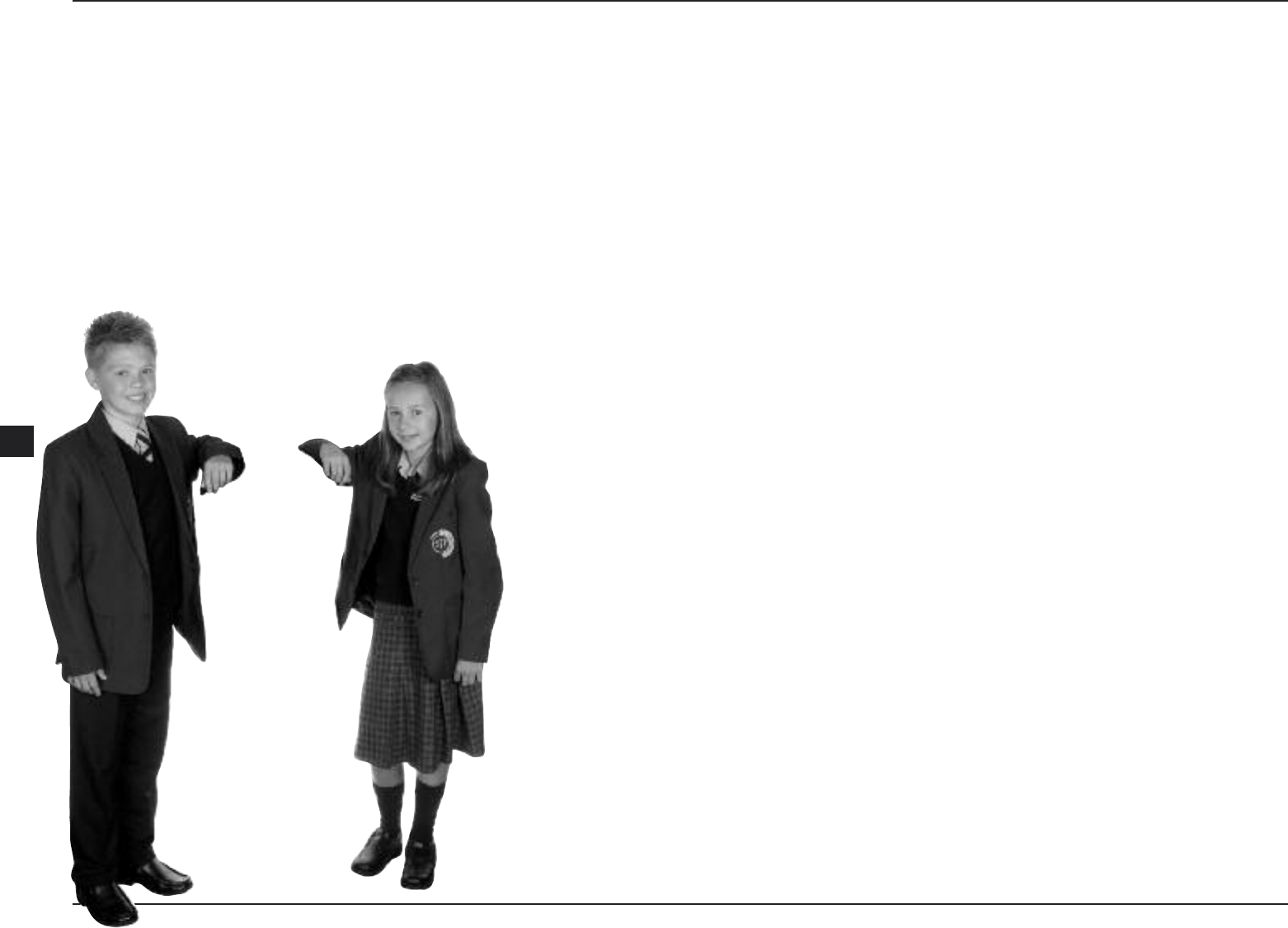
28
PE UNIFORM GIRLS Y7-11
COMPULSORY ITEMS
Sky blue hooded sweatshirt with house initials
printed on the back
Sky blue polo shirt
Navy blue shorts
White football socks
OPTIONAL ITEMS
Navy blue tracksuit
(strongly recommended)
Navy blue football shirt
Regardless of
illness or injury,
pupils are
expected to
bring a full
College P.E. kit
to all lessons in
order to participate in a
variety of roles.
FOOTWEAR FOR
BOYS AND GIRLS
Pupils must wear black or
white training shoes.
Pumps, plimsolls or
high-tops will not
be acceptable for P.E. lessons as they do not provide
adequate support.
HAIR and MAKEUP
Pupils are expected to wear hair in a neat and
acceptable style. Hair must be of one colour,
natural in appearance. Hair styles (including
shaved heads) judged to be extreme by the
Headteacher are not permitted. Make-up,
including coloured nail varnish, lip gloss and fake
tan, is not to be worn. Hair fashion accessories
are also not to be worn. False nails or other such
beauty accessories are not acceptable. If hair
bands are worn they should be navy blue or black
only. Pupils who do not conform to the College’s
uniform and appearance policy will be
sanctioned in line with our Behaviour Policy.
JEWELLERY
Apart from watches, jewellery (including
studs, rings, earrings or any other body/facial
piercings) are not to be worn. This is because
of the potential risk of accidental damage from
the wearing of such items and so they may be
confiscated. We will do our best to assist your
child in safeguarding their property. However,
the College does not take any responsibility for
the loss of or damage to personal possessions
brought on to site. Large amounts of money or
items of value (including personal audio
equipment [such as MP3 players, iPods etc],
electronic games or jewellery) should not be
brought into the College. Such items will be
confiscated by staff, a receipt issued and the
property can then be obtained by parents from
Reception.
MOBILE PHONES
We advise that pupils do not bring mobile
phones into the College. However, we do
recognise that some parents may wish their child
to have a mobile phone with them as they travel
to and from SJP. Any mobile phones brought in
should be both switched off and put away whilst
on the premises. We do not take any
responsibility for loss of or damage to mobile
phones. Inappropriate use of phones in school
will result in confiscation without notice (they
may subsequently be obtained by parents from
Reception). Should you need to contact your
child in an emergency, please use the main
College number 0151 645 5049.
The Headteacher reserves the right to make
the final decision on what is or what is not
appropriate.
IMPORTANT: Insurance Notice
We recommend that parents/carers make their
own arrangements for insurance of bags,
clothing, watches, mobile phones, pens, bicycles
etc. - usually by an extension of your home
insurance. Please never allow your child to bring
anything expensive or of sentimental value into
the College, particularly pens, watches, jewellery
or large sums of money. Students should report
anything lost to staff immediately.
Uniform and Appearance Continued

29
Information and Communications Technology
SJP is at the forefront of computer based
technology systems with over 600 computers
available to our students. Every classroom is
equipped with an Interactive Whiteboard and
every teacher has a laptop. We operate a
Windows based computer system providing
access to the Virtual Learning Environment (VLE)
via the College website
www.stjohnplessington.com the Internet and
e-mail. To use the SJP computer network all
students and parents must agree and sign our ICT
Contract. Students who break the Contract will
have their network computer account disabled.
Username and Password
On joining SJP students are issued with a username
and password for access to the network system.
Students are not allowed to use the system using
an unauthorised username or password. Students
can change their password at any time. If students
lose their password it will only be reissued by the
SJP Technicians team twice in one term.
The Virtual Learning Environment
Once again this has put SJP at the cutting edge
of educational initiatives. We were well ahead of
the Government’s intention of seeing a VLE in all
schools by September 2009 when we introduced
it in October 2007.
Our VLE gives all our students the opportunity to
benefit from ‘anytime and anywhere learning’ by
using the internet to keep up to date with their
work. SJP teachers use our VLE to set work for
students, students then submit completed work to
their teachers on our VLE and teachers are able to
track the progress being made by each individual
student. Students can always go back to resources
used in lessons, including any presentations, so
making revision so much easier for them.
The key benefits anticipated over time from our
VLE are:
• Students will develop independent learning
skills and have more control over how and
when they work.
• Absent students can continue their learning
from home, with work set by the teacher on our
VLE, and marked and returned within our VLE.
• Students will be able to access learning materials
created by their teachers, outside lesson time
and from locations such as a library and home.
• Students will be able to store work and notes
online for use in assignments, homework and
revision, outside normal College hours.
• Parents will be able to access their son’s/
daughter’s personal home page to keep track
of their work, their progress and their
curriculum.
Samlearning
The College subscribes to SAM Learning, which is
an e-learning service that can be accessed on-line.
SAM Learning has proven to improve exam results
through exam practice and related revision.
Sometimes homework is set requiring pupils to
use SAM Learning. If it is not possible to use SAM
Learning at home, we can make arrangements for
access to ICT suites in College outside task hours
so no-one is at a disadvantage.
Transferring Files
Students can transfer files between home and
College using the VLE or alternatively a USB
storage device
Computer Games
Computer games are not allowed to be brought
into or played in College. This includes web-
based games on the Internet.
Reporting
A unique aspect of the SJP online reporting
system means that parents have an
anytime/anywhere opportunity to access their
child’s half-termly report and termly achievement
plan as well as regular attendance updates. This
means that SJP reports to all parents, 9 times in
any one academic year as well as a Consultation
day. OFSTED judged this provision to be an
outstanding feature of our College.
E-mail
The College is keen to ensure that we commun-
icate with parents as quickly and effectively as
possible. We hope that you are able to provide an
up to date e-mail address for us that will facilitate
this form of communication. It will allow us to
send important reminders and e-mail alerts as
well as up to the minute copies of our SJP News.

30
We feel it is very important to recognise effort,
hard work and success. If a pupil has done a
particularly good piece of work or has shown
great improvement in their work then a House
Point is awarded. Similarly, marks may be
awarded if a pupil has made progress in an
extracurricular activity, or performed a service for
the College, or shown an act of kindness. House
Points are entered into the Pupil Planner and
recorded in the ‘Carrot rewards’ database.
Rewards can then be ‘traded in’ for prizes of the
student’s Choice, including stationary items,
vouchers or even a ‘pizza party’ with friends in
the college dining hall.
Achievement Assemblies
To celebrate success and reward achievement,
your child will attend a termly Achievement
Assembly. This is an important highlight for both
students and their teachers. When pupils have
reached 100 (bronze),200 ( silver) or 300 (gold)
House Points, they will be awarded with a badge
and certificate in the Assembly, presented by the
Head of Learning.
Certificates and prizes are also awarded for
attendance, punctuality, citizenship and
achievement in individual subjects.
There are also special Form Tutor awards and
Heads of Learning awards. The certificates are
added to the Record of Achievement portfolio.
We also encourage the recognition of sustained
achievement and effort by individual pupils
through the presentation of a range of awards at
the annual Awards Evening, where achievements
are celebrated in a public forum with parents,
staff, governors and a well known guest speaker.
We believe that pupils achieve well through
constant encouragement and well deserved
praise. We hope that throughout the year you
will receive a number of Praise Postcards by post
which are sent by any member of staff at any
time to let you know that your child has done
well.
Behaviour and Discipline
The College has a minimum number of rules, but
we feel that the Code of Conduct ensures the
smooth running of the College and fosters good
working relations between staff and pupils. If a
pupil breaks any of the rules, then they are given
an appropriate sanction. Pupils are taught that
behaviour is a choice which can bring positive or
negative consequences: good behaviour is
expected and rewarded, and poor behaviour is
sanctioned. Pupils breaking College rules
regarding punctuality, uniform and appearance,
behaviour or use of facilities will be dealt with
either by a subject or Form Tutor in the first
instance. ( Level 1 behaviour) For more serious
matters (Level 2 behaviour) pupils will be referred
to the Head of Learning or Head of Department.
There may be occasions when behaviour is
serious enough to necessitate the referral to a
Senior Manager ( Level 3). Incidents of
unacceptable behaviour are recorded on the
College database. The types of behaviour for
each level are found in the Behaviour Policy on
the College website.
An innovative feature at SJP is our
textsomeone.com system. This enables all pupils
to text the College in the unlikely event of
bullying taking place.
Rewards and Sanctions
Praise and Rewards
“In this College it is both acceptable and expected to do your best.”
(OFSTED)
‘Behaviour is exemplary’ (OFSTED)

31
The College can only function successfully in an
atmosphere of trust, mutual understanding and
good order. We expect the highest standards
from our pupils and encourage them to be self-
disciplined at all times. Pupils should respect
others and the environment in which they work
and learn. We would like to stress that SJP
belongs to us all: to you, your child and the
community, and we ask for everyone’s co-
operation in making it a happy and safe place.
The Code of Conduct ensures that pupils have
clear guidelines as to what is expected of them.
If a pupil fails to exercise self-control or self-
discipline in their conduct to others then they are
disciplined, and we would obviously expect
parents’ support with discipline matters. We also
have high standards of behaviour and apply the
same Code of Conduct whilst travelling to and
from College. Sanctions will apply in the same
way when College rules are broken, whether on
the buses or walking to and from College.
Sanctions
Parents are advised that as part of our Code of
Conduct and Behaviour Policy the College has the
legal authority to issue after-College detentions
to pupils. In cases where a child is issued a
detention for ten minutes or less, the College is
not obliged to inform parents/carers beforehand.
Where an after-College detention exceeds ten
minutes, the College will ensure that at least 24
hours’ notice is provided. It should be noted that
under education law, the College is required to
inform parents/carers of a detention, but is not
required to have their permission to keep a child
in detention. The College also operates the Assisi
Centre, which may be used as a preventative
measure to avoid a fixed term exclusion. Pupils
will work in the Assisi Centre for a set period of
time and parents will be notified by phone call
and letter. Should behaviour be serious enough,
the Headteacher may to decide to issue an
exclusion (fixed-term or permanent). Exclusion
from College is used where other remedies have
failed or to deal with particularly serious
incidents. Such exclusions are carried out in line
with DCSF guidance. Provision for fixed term
exclusions is made at the Shaftsbury Centre in
Prenton. A re-integration meeting will take place
on the child’s return to school, usually with the
Deputy Headteacher. Occasionally there may arise
the need to investigate an incident which will
require us to interview pupils and ask them to
write a statement to clarify their involvement. At
such times, in accordance with current national
practice we reserve the right to interview pupils
without parental permission, although we seek to
inform parents at the earliest opportunity.
Pupils in uniform are representing the College at
all times. Therefore pupils are reminded that the
Rewards and Sanction policy applies before,
during and after College hours.
Reminders:
• Mobile phones must be switched off at all
times in College
• Smoking is prohibited
• High caffeine drinks are banned.
• Fizzy drinks with high levels of sugar are
discouraged.
• Chewing gum is banned
Rewards and Sanctions Continued

32
By this we mean:
✓ Be on time.
✓ Aim for 100%
attendance.
✓ Wear the SJP
uniform with
pride.
✓ Bring all the
equipment you
need each day.
By this we mean:
✓ Say please and
thank you.
✓ Use positive
language at all
times
✓ Treat others with
respect at all
times.
✓ Don’t have
physical contact
By this we mean:
✓ Always put litter
in the bin
✓ Keep the College
graffiti free.
✓ Never chew gum
✓ Look after College
equipment
✓ Move around the
College in an
orderly manner
By this we mean:
✓ Allow others to
learn.
✓ Allow teachers to
teach.
✓ Listen to all staff.
✓ Always try your
best.
The 4
“
R”s
SJP Code of Conduct
Respect
j
l
k
m
Respect
Yourself
Respect Your
Environment
Respect
Each Other
Respect
Learning

33
It is vital that your child attends College as
regularly as possible. This is important to avoid
missing valuable lesson time and falling behind.
Employers place great emphasis on consistent
attendance and good punctuality and attendance
will be mentioned in the pupils’ Record of
Achievement and Achievement Plans each term.
Registers are completed electronically each lesson
in addition to period 1 at 8.40am where morning
registration takes place and Academic Review
when the afternoon’s registration takes place.
Absence
Children of school age who are registered at a
school must by law, attend school regularly. It is
vital that your child aims for 100% attendance.
Registers are completed electronically each lesson
in addition to period 1 at 8.40am where morning
registration takes place and Academic Review
when the afternoon registration takes place.
Other than illness, any other absence should be
kept to a minimum. If your child is ill and unable
to attend College, please contact us by telephone
as soon as possible. When your child returns they
MUST have a note from you explaining the cause
of the absence. This should be handed to their
Form Tutor who will keep it on file. When your
child is absent please encourage them to use the
VLE and SAM learning and keep up to date with
any work they are missing. Should your child
need to be absent for a long period, the College
will ensure that work is provided. It is important
that they attempt to catch up on the work
missed. Unless the College has already been
notified, on the first morning of absence, parents
will receive a telephone call from College
requesting a reason for absence. Truancy from
school or failure to provide a reason for absence
will result in the College coding the absence as
unauthorised. This in turn could lead to the issue
of fixed penalty notices if attendance falls below
an acceptable level. The College will provide you
with regular updated records of your child’s
attendance, and will let you know if we are
concerned about it.
Holidays during term time
Parents must avoid taking their children out of
College during term-time in order to go on
holiday. Parents do not have the right or
entitlement to expect term-time leave to be
granted. It would only be in very exceptional
circumstances that your child would be allowed
to go on holiday during term time. If this is ever
necessary you should contact the Headteacher by
letter giving at least 4 weeks notice. Please do
not book any holidays during examination or test
periods. Fixed penalty notices may be issued at
the discretion of the Headteacher.
Lateness
Your child is expected to be on the yard at
8.30am each morning. After 8.40am your child is
late and will have to enter College by reception
where s/he will be met by a Learning Coach. Two
sessions of lateness in a week will result in a
Head of Learning detention. After 9a.m. the
College operates a first call home procedure. The
automated system will continue to contact
parents throughout the day and subsequent days
until we have received notification as to why your
child is absent from College. We rely on your
support and cooperation in this matter to ensure
the health and safety of your child is at the
forefront of all that we do.
Medical visits
Occasionally pupils will need to leave the College
during the day for an urgent visit to the doctor,
hospital or dentist. They must bring a note from
you to show to their Head of Learning at
morning registration and explain to the member
of staff who is teaching them at the time that
they need to leave. At the correct time pupils
should excuse themselves from their lesson and
go to Reception where they must sign the signing
in and out book. They will be issued with an
official Wirral Council ‘Truancy Watch’ slip to
authorise their absence. When they return they
should sign back in and go straight to their
current lesson. Whenever possible appointments
should be made out of College time.
Home Contact details
In light of the above, it is essential that we are
able to contact parents at the earliest
opportunity. Please ensure that all contact details
are correct including emergency phone numbers
and e-mail addresses. Pupils are in effect a Health
and Safety risk if we are unable to contact
parents should an emergency arise.
Attendance and Punctuality

34
Breakfast (Sample Menu)
Fresh Fruits
Choice of Cereals
Toast,
grilled bacon, sausage, egg, tomatoes
Breaktime (Sample Menu)
Bacon Batch
Wholemeal or White Toast some Unbuttered
Toasted English Muffin
Cheese toasties
Buttered toast
Lunch (Sample Menu)
Soup of the Day
Traditional roast dinner
Cheese and Onion Quiche
Pasta Bake
Selection of vegetables
Hot Pudding
Panini Range
Baked Potato with fillings
Range of freshly made sandwiches/baguettes
Extensive salad bar
Selection of freshly baked biscuits
Fresh fruit Yoghurt Smoothie
Selection of fruit
Packed Lunches
If you wish your child to bring a packed lunch
then this should be eaten in the Dining Hall and
not on the main yard. No food or drink can be
taken out of the Dining Hall and eaten
elsewhere.
The College strongly discourages pupils bringing
‘fizzy’ drinks onto the premises. Water is always
the healthy option. Please try to give your child a
healthy variety each day and encourage them to
eat fruit rather than sweets.The lunch break does
not give time for your child to go home for lunch
and they must stay on the College site so we can
supervise them. This will ensure that they are on
time for afternoon lessons.
Cashless Dining Hall System
The Dining Hall operates a cashless system
whereby meals are paid for with credits using a
new biometric system introduced over two years
ago. Money can be credited to accounts using
the revaluation machines in the Dining Hall and
larger amounts can be credited, paying in cash or
by cheque. Cheques should be given to the
Catering Manager in the Dining Hall and should
be made payable to ‘Harrisons Ltd’.
Free School Meals
If you think you qualify for free school meals
please contact: Ms Sally Mitchell, Operations
Manager here at the College. All applications are
treated in the strictest confidence and with the
cashless Dining Hall system in use nobody will
know that a child is on free meals. Please claim if
you are eligible and if you are unsure don’t
hesitate to contact us for confidential advice and
guidance.
Application forms can be obtained via the Local
Authority website. www.wirral.gov.uk
Application forms should be completed and
returned by hand to any One-Stop-Shop.
Alternatively, postal applications can be addressed
to
Children and Young People’s Department
Hamilton Building
Conway Street
Birkenhead
Wirral CH41 4FD
College Dining Hall
The Catering Staff work very hard to maintain the quality and variety of meals with every effort being made to respond to students’ requests.
The Dining Hall is open for Breakfast in the mornings before the College Day begins (7.45am) for break between 10.40am and 10.55am
and for lunch between 12pm and 1.20pm. It is open throughout the day for 6th Formers.
Please find below a range of sample menus for various times during the day. The College has been at the forefront of the ‘Healthy Schools’ agenda and in
2007 was awarded ‘Healthy School’ status.

35
The following are some tips and ideas for how
parents/carers can support their children in their
learning at secondary school. This is not
intended to be a complete list and should you
have any further suggestions we would love to
hear from you!
As a parent or carer, you are your child’s first and
most important teacher. When you speak you are
a language teacher. When you help your child
recognise colour and shapes you are teaching
reading skills. Before your child goes to school
you probably also teach Maths, Science, Human
Studies, Art and Physical Education.
Even after your child enters SJP you continue to
be the most important influence on their life.
Remember, most teachers see children only a few
hours a day. Parents are constantly teaching their
children.
The College will teach children a lot of important
knowledge, but parents play a critical teaching role.
We know that children can learn even more when
the College and parents work together as a team.
This section of the handbook suggests ways you
can help us to support your child’s learning. You
may already be following many of these
suggestions. Some may not be appropriate for
your child. They are intended to get you started
on home learning activities.
Get involved - We want to encourage you to be
an active member of our College community.
Be visible - Attend the Parents’ Review Day so
that you can get to know the teachers. When
children see that their parents believe College is
important they feel supported.
Volunteer - Parent volunteers will enable the
College to provide many extra touches that can
make the difference between a good education
and a great one. The Parents & Friends of
Plessington (PFOP) is a great way to take part.
They will be recruiting at the Induction evening
and in the Autumn Term – please support them
in any way that you can.
PARTNERS IN EDUCATION
Both parents and teachers want the same thing
for children - the best possible education. When
we all work together we make a strong team.
Here are some ideas for helping the College do a
better job:
• See that your child attends College regularly.
• Monitor your child’s subject books and College
Planner.
• Support the College in its efforts to maintain
proper discipline.
• Be aware of what your child is learning in
College.
• Let the Form Tutor know if your child has any
problems outside College that might affect his
or her schoolwork.
• If you have any concerns or questions do share
them with us.
• If you have any suggestions or ideas do let us
know.
SELF-CONFIDENCE
Let your child know that you have confidence in
them, so they believe in their own worth and are
more able to face the challenges of College life.
DISCIPLINE
Try to establish clear, consistent rules for
behaviour at home. This helps students adjust to
specific rules for the classroom or College.
GOOD DIET
One important way to help your child in College
is to make sure they eat well. Children need food
energy to perform well. Try to provide a healthy
diet that includes lots of vegetables, fruit, cereals,
milk products, meat, poultry and fish. Ensure they
drink lots of water and avoid ‘fizzy’ drinks.
As part of our curriculum throughout all years,
we examine some of the issues around healthy
College and the Home
How Parents and Carers can help

36
lifestyles. We believe that good health is vitally
important and depends not just on a good diet
but also on exercise during the day and enough
sleep at night. Encourage your child to play sport,
ride a bike, skip, etc. You could be a good
example yourself!
READING
Help your child become a good reader. Whether
your child reads fluently depends partly on you. If
a family encourages and enjoys reading children
are more likely to read well and often.
Certain things influence children’s success and
interest in reading, such as wide knowledge and
thoughtful talking. Thought-provoking questions
stimulate curiosity.
• Encourage your child to think about past and
future events. Help your child hold lengthy
conversations to reflect on their experiences.
• Television, in moderation, could inspire children
to read the book about the dramatisations they
watch.
• Show interest and become involved in your
child’s reading.
• Try to give a feeling of “can do” confidence.
• Children who are good readers can make very
significant progress in all subjects. As a parent
you can encourage your son or daughter by
reading to your child (if appropriate) or
encouraging them to read.
• Let your child see you reading. Let them know
how important it is for the future. You could
also make regular visits to the library.
• Reading well will help your child make progress.
WRITING
Help your child become a better writer. Clearly,
writing is something we all do. It stimulates
thought, enables us to communicate with friends
and helps us express our feelings.
To write well we must:
• think clearly.
• have sufficient time.
• read to become a better writer.
• have an interest that we can write about.
To help your child to write well and enable them
to find it easier or more enjoyable, provide a
place to write. Have paper, pencils, etc. available.
Respond to your child’s ideas but don’t write it
for them.
• Do say something good about it - such as “it is
interesting, thoughtful or accurate.”
• You could write together, for example a
business letter or order. This would show the
value of writing in the adult world.
• Encouraging them to make lists will help your
child to become organised.
• The ability to express thoughts clearly in writing
is an essential skill. As writing is based on
spoken language, you could talk with and listen
to your child at home. As you share experiences
and talk about them you might help your child
develop a love of words.
• Let your child see you writing. As they see you
correct or adapt your work your child will learn
the importance of drafting and revision to
ensure good writing.
• Encourage your child to write. Perhaps it could
be illustrated so that the writing becomes a
treasured gift for relatives or friends.
HELP YOUR CHILD DO BETTER IN COLLEGE
Research has clearly shown that behaviour and
attitude affect success in the classroom.
Successful students:
• pay attention.
• are interested in their work.
• learn and remember.
• study and know how to get help when
necessary.
As parents, you can help to teach your child
these skills.
College and the Home Continued

37
PAYING ATTENTION
Children can learn the knack of paying attention.
Help them think positively so that they don’t say
“It’s hopeless”. Encourage them to think they
“can do it”. Don’t let them give up. A useful
saying might be: “Quitters don’t win and winners
don’t quit”.
Encourage them to answer and ask questions.
This helps to focus attention.
TAKING AN INTEREST
Learning is a joint effort - teachers, parents and
pupils working together. Children must believe
that the hours they spend studying (and the
effort they put in) make the difference between
success and failure.
Do take an interest in your child’s work and
results. Discuss them with your child. Reward
your child for improvement. Stress the benefits of
doing well in College.
REMEMBERING
Research has shown that success in College is
determined not just by intelligence but by the
strategies children use to master facts and ideas.
Understanding a subject doesn’t just happen.
Children need to be interested. Encourage your
child to find an answer to a problem or to draw
conclusions. Help your child to discover the main
idea or most important point in the material they
are studying. Help your child make up a
mnemonic (a memory aid) to remember lists or
facts eg: “Richard Of York Gave Battle In Vain” –
ROYGBIV – for the colours of the rainbow.
YOU CAN HELP BY...
• Providing a quiet, well lit place for work. A desk
is ideal but a corner on the kitchen table will do.
• Help your child to create a schedule that is
flexible but allows study on a weekly basis.
• Make sure your child has pens, dictionary, etc.
• Provide encouragement and support but most
of all be available.
• There is a time when television can help but do
ensure that your child actively watches
programmes and does not just sit in front of
the television.
• Talk about the programme when it has finished.
Have plenty of books around.
• Encourage them to study by reading a little
yourself first so that you can help and take an
interest.
• Your child cannot remember everything so help
them write notes as a summary of the
important points. This helps memory and
categorising.
• Encourage your child to prepare for tests by
spacing study over several days.
• Help your child look forward to College as a
happy place. Always talk about College in a
positive way.
• Most of all - talk to your child.
Enjoy your child learning and have fun helping
them to do their best: by working together we
can all help to make that happen.
College and the Home Continued
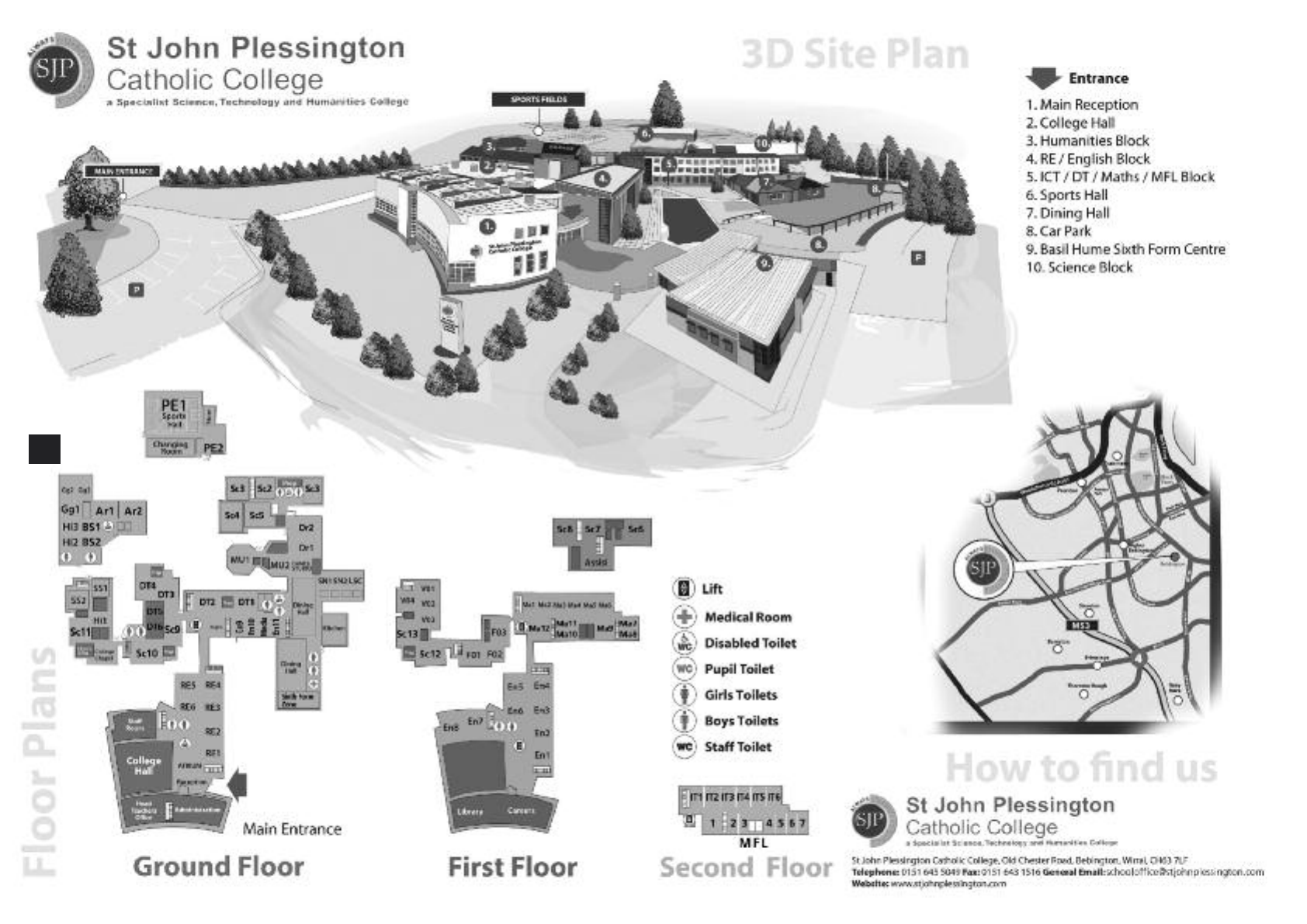
38
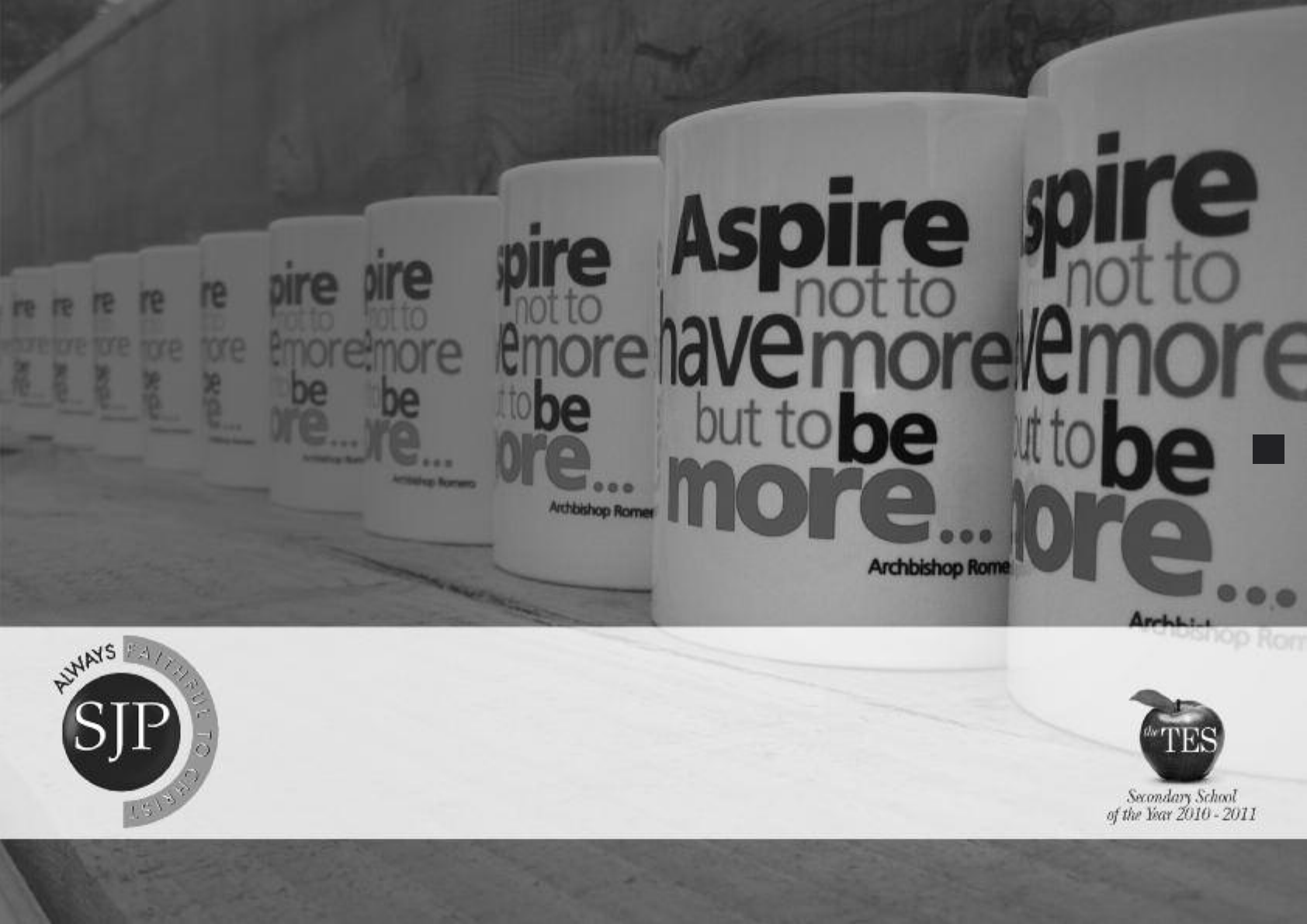
39
St John Plessington Catholic College
a Specialist Science, Technology and Humanities College
Sixth Form Parent Handbook
2011/2012
“This is an outstanding school in which exceptional things happen.”
OFSTED

40
Welcome
We are delighted to be able to welcome you and your son or daughter to St John Plessington Catholic College Sixth Form.
The College goes from strength to strength.
Following our Outstanding OFSTED reports in
2007 (Full Inspection), 2008 (Subject Inspection)
and 2011 (Interim Report), our results continue to
smash all records. This means year-on-year that
we continue to be the highest performing
comprehensive school on the Wirral for GCSE
success and yet again we are the top school
overall for achievement. At the time of writing we
are again expecting another record year of
results at GCSE and Advanced Level. Our winning
the prestigious Times Educational Supplement
Secondary School of the Year for 2010-11 has
attracted a huge amount of interest from other
schools with over 40 institutions the length and
breadth of the country visiting us to sample the
secrets of our success.
OFSTED recently confirmed their interim
assessment which indicates that our performance
across a wide range of measures has been
sustained and, because of this, they will not be
inspecting the College until further notice. It is
another further accolade to everyone across the
community for helping us maintain our high
levels of performance - a fantastic platform to
enable the College to grow and develop further
in new and exciting ways! I can assure you that
we are always looking to build on this success
and will continue to provide an education that is
truly second to none on the Wirral.
The Sixth Form is an integral and invaluable part
of Saint John Plessington Catholic College
Community where Sixth Form students help to
make the College successful and move it forward.
The Sixth Form offers a unique opportunity for
personal growth and academic development. As
well as an extensive programme of support for
those Involved in the ever more competitive
UCAS application process, we have a varied menu
of enrichment activities which look to develop
leadership roles and prepare students for life
beyond the Sixth Form. We aim to encourage
Sixth Formers to mature into responsible young
adults who are able to make a full contribution to
society. We therefore expect our Sixth Form
students to play an important role in the
community life of the College. This year we have
deliberately timed Academic Review for 6th
Formers to coincide with that of Year 7. This will
facilitate a number of opportunities to mentor
and support their young peers.
Life in the Sixth Form builds upon the excellent
relationships formed in the previous five years,
nourished in an atmosphere of Christian ethos,
where all can live and grow supported by the
teachings of our faith. However students still
need support and guidance and this is provided
throughout the Sixth Form.
This is a very exciting time for the students as
they are no longer in compulsory education and
therefore their choices will determine their future.
We look forward to your child taking his or her
place at SJP Sixth Form and enjoying a happy and
successful partnership over the next two years.
Tom Quinn
Headteacher
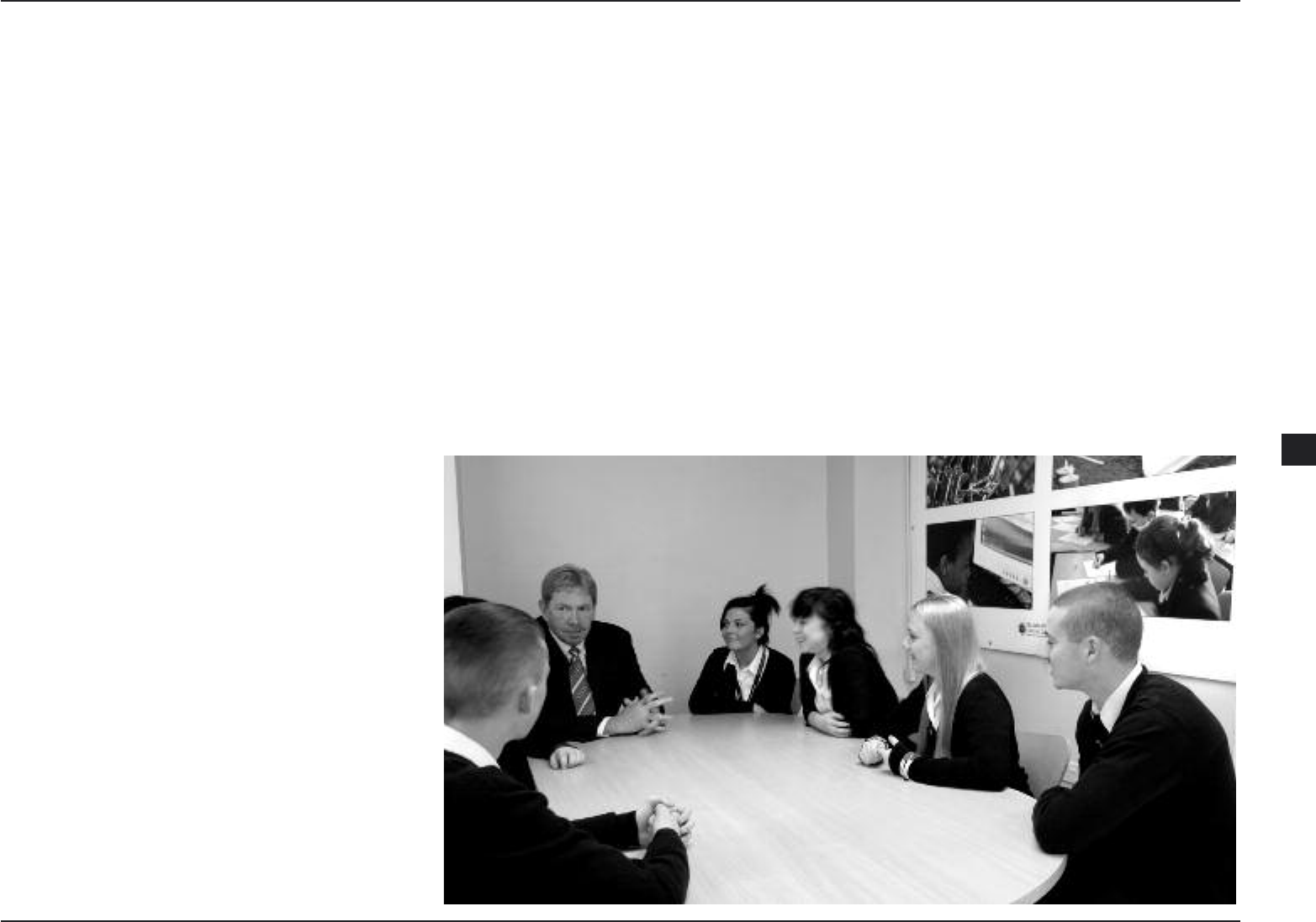
41
General Expectations
• A key aim of the College is to allow Sixth Form
students to become increasingly responsible for
their own decisions and to become
independent learners. We therefore endeavour
to increase flexibility and independence as
students move through the Sixth Form.
• Tutors are the first point of support for students
and they will work with students to develop
study skills and support students in their studies
and career development. Pastoral care and
efficient management require that the contact
between tutor and student be maintained
throughout the Sixth Form. The Director of
Sixth Form, Heads of Learning and Learning
Coach are also available to provide support or
advice.
• All rules concerning attendance, academic
work, uniform and behaviour have been
created with the intention of making students
feel that they are treated as adults. The
consequence of this is that the demands placed
on students will reflect this adult status.
• Working relationships between Sixth Formers
and staff are usually different from those
experienced in years 7-11. Students should be
reminded that they have a responsibility to talk
to teachers if work is going to be late or if
lessons are going to be missed.
• Students can usually expect to be contacted in
advance of a home contact being made.
Students who do not comply with the details at
any stage will be spoken to by their tutor as a
first warning. If the problem is brought to the
attention of the Director of Sixth Form, their
parents/carers will be required to attend a
meeting at College.
Entitlement
The following elements make up a student’s
entitlement at SJP:
• An academic programme matched to their
abilities and aspirations.
• An enrichment programme that broadens their
academic and social/ cultural horizons.
• Assessment procedures which enable all parties
to track their development and plan for their
future.
• Personal support to assist with the fulfilment of
their goals.
• Help with progression to the next stage in their
careers.
General Principles

42
The Head Teacher is assisted in the planning and
delivery of pastoral care at SJP by a team which
includes the Senior Leadership Team, Director of
Sixth Form, Heads of Learning, Learning Coach of
Sixth Form and Form Tutors. Form Tutors are the
first point of contact at the College and will deal
with the majority of questions or concerns that
may arise. For more serious issues, the Director of
Sixth Form is there to support you and your child
both in terms of their academic progress and for
any major pastoral issues that may arise.
Pastoral Care – Tutors
All students will have an ongoing discussion
covering general academic progress; student
concerns; tutor concerns and issues relevant to
careers. Tutors are expected to keep themselves
informed about members of their tutor group by
talking to students and checking progress. Tutors
may arrange for contact with home to be made
but will usually discuss matters with the student
as a first step. Tutors will record any action taken
and pass copies on to the Head of Learning and
to the relevant subject teachers.
Tutors are required to keep relevant records on
their students and endeavour to ensure that
students are kept informed about issues relevant
to their progress. Notes provided by students to
explain absence should be kept available for
examination.
Pastoral Care – Students
All students in the Sixth Form are present by
choice. St John Plessington Catholic College has a
deserved reputation for looking after the welfare
of students. We monitor and support students
while allowing them the freedom to develop as
independent learners and mature adults. Students
have a responsibility to themselves to try to
identify obstacles to progress such as study skills
problems. Students also have a responsibility to
keep their tutor and teachers informed about
matters which impact on their progress. Failure to
attend academic review period may lead to a
breakdown of communication between student
and tutor. Students should inform tutors if they
are experiencing difficulties. Sixth Form students
should seek help if they experience problems.
Besides the support available in College from
teachers, school nurse and the Sixth Form
Counsellor etc, there are also outside agencies
that can be contacted. The most common
mistake made by students is to assume that
nothing can be done or that no one will
understand.
Academic Monitoring
A system of academic monitoring and target
setting is in place. At the start of the Autumn
term students are set targets in each of their
subjects using their GCSE point score based on
the national ALPs system (Advanced Level
Predictor System). This sets their Minimum Target.
Students are provided with five progress meetings
over the two academic years of study.
These involve an interview with their Learning
Coach. The student’s pastoral progress is
discussed and future targets set. This information
provides the basis for the Achievement Plans,
which are sent home following each period of
review.
This system has a variety of benefits. It sets
students targets from the start of their courses
and involves them in the target setting process. It
also involves regular review, which involves
students, teachers and parents. It helps to provide
an early indication of under-achievement but also
allows the identification and praise of students
who are meeting or exceeding their targets. This
system of monitoring and reporting is supported
by a Parents’ Evenings which takes place on
Thursday 6th October 2011.
Pastoral Care
“Students’ personal development and well-being are outstanding in
the main College and in the sixth form.” (OFSTED)
“Students believe the College is, in their words, ‘a big family where everyone is the same.” (OFSTED)

43
In addition, teachers regularly mark work and
give feedback to students. This feedback should
inform the student clearly about the standard
being achieved and the steps necessary to move
to a higher standard. Students should therefore
be clear that a piece of work is a grade A, B, C, D
or E. Students should also be able to understand
clearly what steps they should try to take to
improve on their grades. Tutors will ask students
to provide updates on their progress in each
subject. Students must be able to answer by
explaining the grades they are achieving and the
steps needed to produce better grades.
Teachers
’
concerns about academic performance
can result in students being monitored by their
Head of Learning. Teachers may phone home
(home contact) but will first speak to the student
and explain why a phone call home is deemed
necessary. Teachers have a duty to inform parents
of concerns so that under-performance does not
go unnoticed. Students have a right to be treated
as adults and therefore in normal circumstances a
phone call home would follow discussion
between the teacher and the students and
information being recorded using the monitoring
system.
Each student receives a planner at the start of
each academic year. These should be used by
students to record their homework, stating the
nature of the task and the date it is due in. In
addition, there is an academic monitoring
section, which should be completed during the
five interview cycles. This will include a record of
target and progress grades as well as targets,
which are set in discussion with subject teachers.
The planner is a very important document and
students should have these with them for every
lesson.
Special Monitoring
Students can be put on special monitoring at any
time during the Sixth Form. This will mean that
the Head of Learning / Director of Sixth Form will
expect a report to be completed by teachers to
ensure progress is satisfactory. Students are most
likely to be put on special monitoring at the start
of Year 12. This will happen if performance at
GCSE causes subject teachers to question a
student’s suitability for their course. In this
circumstance the special monitoring will continue
to half term in October. A review meeting with
the student and Head of Learning / Director of
Sixth Form will then be held to which parents will
be invited. A successful review will mean an end
to special monitoring.
Departmental accountability for student
progress
Departments monitor the progress of students in
their charge. By using GCSE performance,
teachers know what they can expect from
students. Teachers initially use the Departmental
Monitoring system to record significant issues
such as absence from lessons and significant
underperformance, keeping the Head of Learning
informed. This system is also used to identify
students who are deserving of praise.
Departments will ensure that parents are
informed at an early date if progress is falling
below expectations. Departments may make
direct contact home by phone or by letter to
parents. An outline of the subject areas and
assessment tasks set by departments will be
outlined in the learning programmes.
Home Contact
Although Sixth Form students are more
independent than younger students, home
contact is just as important. We welcome
inquiries from parents/ guardians and we are
happy to give a progress update at any time.
When we have concerns we will make contact
ourselves. Students usually prefer to deal with
teachers directly and we are happy to do this.
However, our responsibility to keep parents
informed is uppermost in our minds and parents
will always be informed by letter of any concerns/
interventions.
Pastoral Care Continued

44
E-mail
To improve communication, students and parents/
guardians are requested to provide E-mail
addresses. Although letters will be provided for
students on important issues, by using e-mail we
can provide more frequent reminders on other
events. The College has sixteen form groups in
Years 12 and13, each of which has its own
patron and forms a ‘House’ across all years.
The Houses are: Bernadette (SB), Vincent de Paul
(VP), Bosco (JB), Romero (OR), Kolbe (MK), Hume
(BH), Mother Teresa (MT) and Thérèse of Lisieux
(TL)
Tutor Groups
Sixth Form tutor groups do not follow directly
from Year 11. There are 16 tutor groups, 8 in
Year 12 and 8 in Year 13. The tutor will use
academic review for one-to-one meetings with
students. Each student will have a personal
progress interview in each term with the Learning
Coach or pastoral staff and the completed
achievement plan will be sent to parents.
Assemblies
Assemblies take place each week. All students
will be expected to attend.
Registration in tutor groups – tutors
1. Tutors will register students and keep a record
of reasons for absence.
2. If a student has not provided a note within 24
hours of an absence, the Learning Coach
should be informed and contact will be made
with home.
3. If the absence is unauthorised the Learning
Coach will be informed.
4. Tutors will keep absence notes on file
ensuring dates of absence and reasons for
absence are clear.
Registration in tutor groups – students
a) Year 12
Students are required to attend between 8.40am
and 3.20pm. All students are expected to attend
Academic Review. Students who are not
timetabled for Period 1 must register at 8.40am
in the Basil Hume Sixth Form Centre. They will
then use this Period for private study in one of
the Sixth Form Study Areas.
b) Year 13
Students are required to attend between 8.40am
and 3.20pm until half term. Students must attend
all assemblies and academic review periods. After
half term most students will be granted home
study during Period 4/5 on one day when they do
not have a lesson. The exact days will be agreed
between student, parent and tutor.
Students may not be given the extra privilege if
their attendance or work has been a concern
during Year 12.
Exam Fees
Students who complete the course are entitled to
one paid entry per module. The student will pay
for any additional resits. If a student resits any
module an invoice will be sent out in advance
and must be paid prior to the exam being sat.
Failure to do so will result in withdrawal from the
exam. Parent/carer will be billed for cost of
withdrawal.
If a student is not attending regularly or is
producing work significantly below their level of
ability, s/he may be asked to pay the exam fee.
Pastoral Care Continued
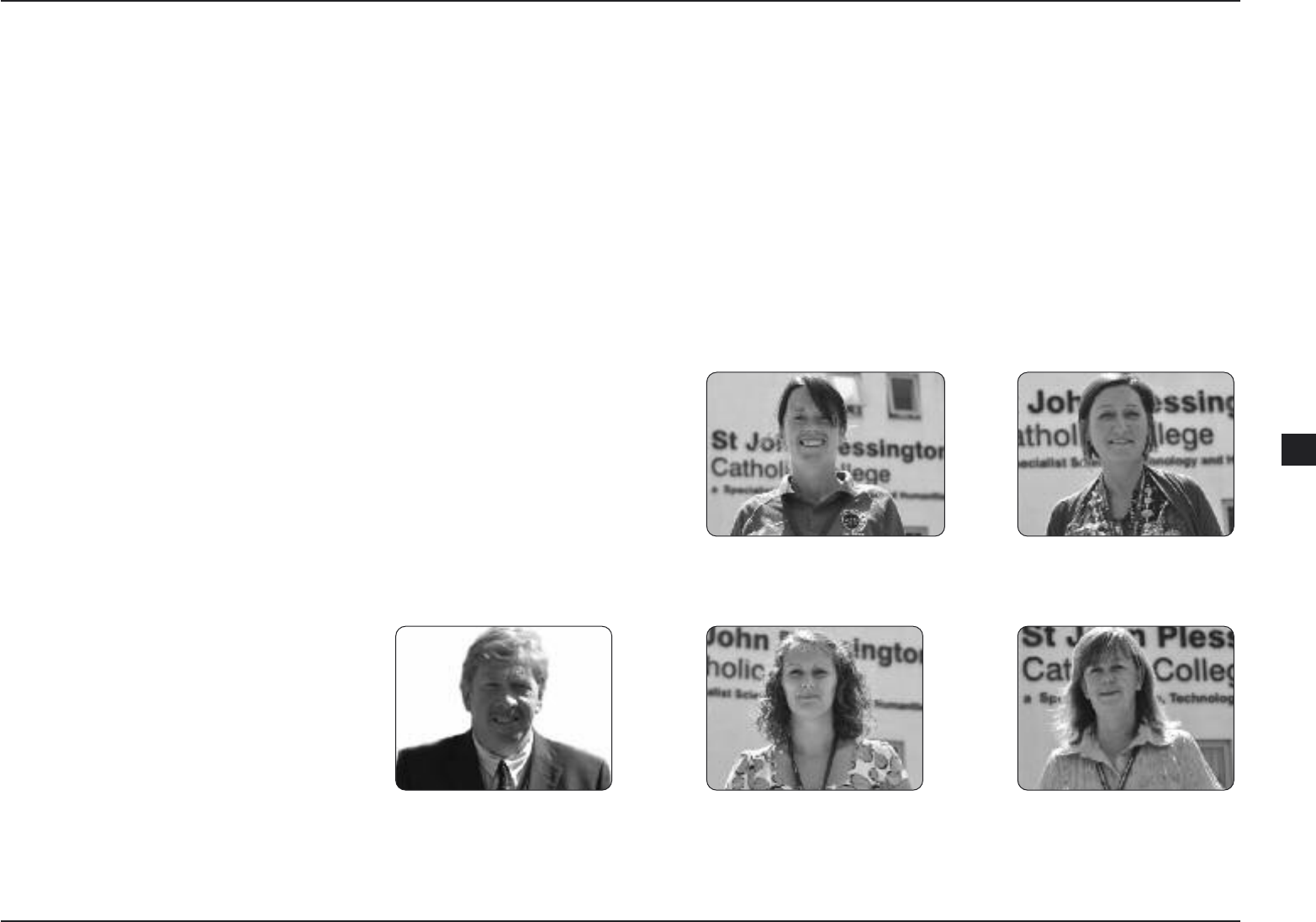
45
Form Year 12 Tutor Year 13 Tutor
JB (John Bosco) Mrs L. Howarth Mrs S. Murphy
BH (Basil Hume) Mrs D. Howells Mrs E. McNally
VP (St. Vincent De Paul) Mr S. Witcher Mrs V. Thompson
TL (Thérèse of Lisieux) Miss R. Wroe Mrs C. Eckersley
MT (Mother Teresa) Mr J. Sheldrake Mrs C. Carter
OR (Oscar Romero) Mr J. Gatrell Mrs J. Smith
MK (Maximilian Kolbe) Mr I. Burrows Mrs T. Lawson
SB (Saint Bernadette) Mr K. Cooper Mr M. Regan
Tutor Groups Sixth Form
In Sixth Form, your child will be placed in a mixed Form Tutor Group. Each group is named after a House Patron, a
famous Catholic Christian who as a witness to the Gospel encourages us in our faith. Each Form will participate in a wide
variety of House Competitions through the year led by the Head of House.
Director of 6th Form
Mrs A. Lock
Head of Learning Year 12
Mrs J. Gullidge
Learning Coach
Mrs J. Davis
Head of Learning Year 13
Miss E. Francis
Deputy Headteacher (Pastoral):
Mr S. Rylance
Key Pastoral Staff

46
The Sixth Form is composed of a series of phases.
It begins with the induction and consolidation
phase, which includes induction day to prepare
students for successful academic and social
transition. This is followed by the guidance and
support phase, where there are various
curriculum opportunities for students to get
involved in.
Each pupil will have a timetabled enrichment
lesson, where they will have the opportunity to
choose activities which not only interest them,
but develop their social and life skills. Some of
these will be geared directly towards preparing
students for the world of work and University,
such as ‘Interview Skills or ‘Cooking on a budget
for University’. Individual departments will also
offer their own enrichment activities, specific to
developing knowledge and understanding in
subject areas. There are many extra curricular
opportunities open to our students, including a
comprehensive sporting programme.
Mathematicians will be entered into the Liverpool
Mathematics competition and Scientists the
UCLAN Biology competition, as well as the
‘Liverpool Young Analyst of the Year’. The P.E.
department organise water sports holidays in
Spain and skiing holidays in America on a bi-
annual basis, open to all members of our
community. Termly social events are also
organised for the Sixth Form, including bowling,
ice skating and Band nights.
The College has close links with several
universities and works in partnership with Oxford
University on the Pathways Programme. This
provides our students with direct access to advice
and guidance on the whole admissions procedure
from Oxford University staff. The college also
encourages pupils to participate in Oxford’s UNIQ
programme of free residentials in July and August
for Year 12 students. UNIQ students follow a
week-long academic course designed and taught
by lecturers and tutors at Oxford University, as
well as taking part in social activities, networking
with alumni of the University, and chatting to
current students.
In addition to this, the College provides a
thorough programme of monitoring and guiding
students for their progression to the adult world.
We ensure that every individual is prepared with
what they need to know in order to achieve their
goals. This will include an extensive UCAS
programme, with a week off timetable, dedicated
to supporting pupils in the process of selecting
and applying to University. Students will have the
opportunity to listen to speakers from different
Universities, travel to a minimum of three Open
Days should they choose and learn from past
pupils who return to share their experiences and
inspire our current cohort. Those choosing not to
go to University will benefit from our own Work
Related Learning Co-ordinator, who has links with
and knowledge of local employers. Each student
will complete a week of work experience in year
12 to help confirm their choice of career
progression and give them the valuable
experience required to gain access to University
courses and career routes. Students are expected
to be actively engaged with work in the
community, such as our SVP group, who support
the poor and needy, or our students that work in
our local primary schools.
There are also numerous opportunities for our
students to work within our own college
community, supporting staff and younger pupils
during curriculum, Academic Review or extra-
curricular time. It is an expectation that all
students devote one hour of their free time each
week to ‘give a little back’ to SJP. We have a very
strong Sixth Form Council, which consists of two
representatives from each form, working hard to
ensure Sixth Form life is sociable, yet embedded
in a positive work ethic. They meet regularly with
their Head of Learning and Director of Sixth Form
and have worked closely with the Head Teacher
to bring about several positive changes, resulting
in improved provision for both study and
relaxation areas in Sixth Form specific areas. Our
Head Boy and Head Girl chair our College Council
and help ensure the views of all are equally
represented. They are outstanding ambassadors
for the College.
SJP Sixth Form Experience 11/12

47
Under this agreement the SJP Sixth Form will
provide:
• A clear programme of courses that are
delivered by qualified members of staff, using
appropriate facilities and resources, monitored
by the Director of Sixth Form.
• A tutor who monitors your progress, providing
guidance and assistance in setting targets for
improvements.
• A Head of Learning who will set challenging
targets and monitor your progress towards
them.
• A Learning Coach who will meet with you
regularly, providing clear, individualised targets
to help you achieve your goals.
• Regular reports and Achievement Plans each
year.
• At least one opportunity each year for your
parents/carers to come in to College to discuss
your progress with teaching staff.
• Careers advice, encompassing post 16
opportunities, suited to your needs, with easy
access to expert careers advice.
• The opportunity to take part in leisure and extra
curricular activities.
• Support in developing good study skills and
structured time and facilities for this to take
place.
• A friendly, caring and supportive environment.
Learning Agreement
At SJP we know how important it is to build partnerships with parents. This builds strength in our community and
supports students in their development, spirituality and learning.
We rely on the commitment and support of all parents to make this partnership work. We often run events to support
this partnership and are always open to new ideas and feedback so please contact us whenever you feel the need to.
This is a summary of the Learning Agreement that Form Tutors, Parents and Pupils are asked to sign up to.
ST JOHN PLESSINGTON CATHOLIC COLLEGE
SIXTH FORM Student Learning Agreement 2011-2012
The student Learning Agreement is a clarification of the expectations of students at SJP in the Sixth Form and what they can expect in return.
This agreement must be adhered to throughout their Sixth Form career.

48
In return you will be expected to:
• Be determined to make the most of your time
in the SJP Sixth Form, completing all work
required by deadlines set.
• Attend all lessons punctually. You are expected
to be in College from 8.40 a.m. to 3.20 p.m.
• Attend all R.E. & Citizenship lessons.
• Complete at least one hour of community work
and participate in an enrichment activity each
week.
• Attend all sessions punctually. As a full time
student you will be expected to be in school
from 8.40 am to 3.20 pm. (Offsite only allowed
at breaktime & lunchtime).
• Avoid holidays, driving lessons/doctor/dentist
appointments being scheduled in College
hours.
• Respect the rights of all members of the
College community and behave according to
the Sixth Form agreement.
• Accept responsibility for your own learning,
using study time effectively, with the support of
your subject teacher and tutor.
• Inform the College of absence on the first day
and thereafter by a parent/carer.
• Adhere to the Sixth Form dress code.
• Students are not allowed to smoke on any part
of the premises or directly outside the College.
• Keep use of mobile phones and headphones to
a minimum and only within designated Sixth
Form areas.
• Act as a positive role model for the younger
students in the College and the wider
community.
Sixth Form Dress Code:
Boys
• Plain white shirt with collar
• Sixth Form Tie
• Black Trousers (No denim)
• Black Jumper / Cardigan
• Smart black, polishable Shoes
• A small amount of jewellery is permissible
unless it creates a health and safety issue
• Smart outside coat or jacket. No hooded tops
or denim jackets.
No extreme hairstyles including shaven heads
will be acceptable. Hair should be one colour
and should be natural in appearance.
Girls
• Smart Plain white Blouse(with collar and
sleeves)
• Black Trousers (No denim) or checked school
skirt
• Black Jumper / Cardigan
• Black Jumper / Cardigan
• Smart Black Shoes
• Navy Blue or Black Socks or Tights
• A small amount of jewellery is permissible
unless it creates a health and safety issue
• Smart outside coat of jacket. No hooded tops
or denim jackets.
Hair accessories should be kept to a minimum
and must complement the uniform.
A small amount of make-up is acceptable.
No extreme hairstyles will be acceptable. Hair
should be one colour and should be natural
in appearance.
The Head Teacher reserves the right to make the
final decision on what is or what is not
appropriate.
Holiday Leave
• Holiday leave will not be granted during term
time unless there are exceptional circumstances.
This needs to be submitted to the Head
Teacher.
Smoking
• Students are not allowed to smoke on any part
of the College premises or on the street directly
outside the College or in the vicinity of the
College grounds.
Learning Agreement Continued
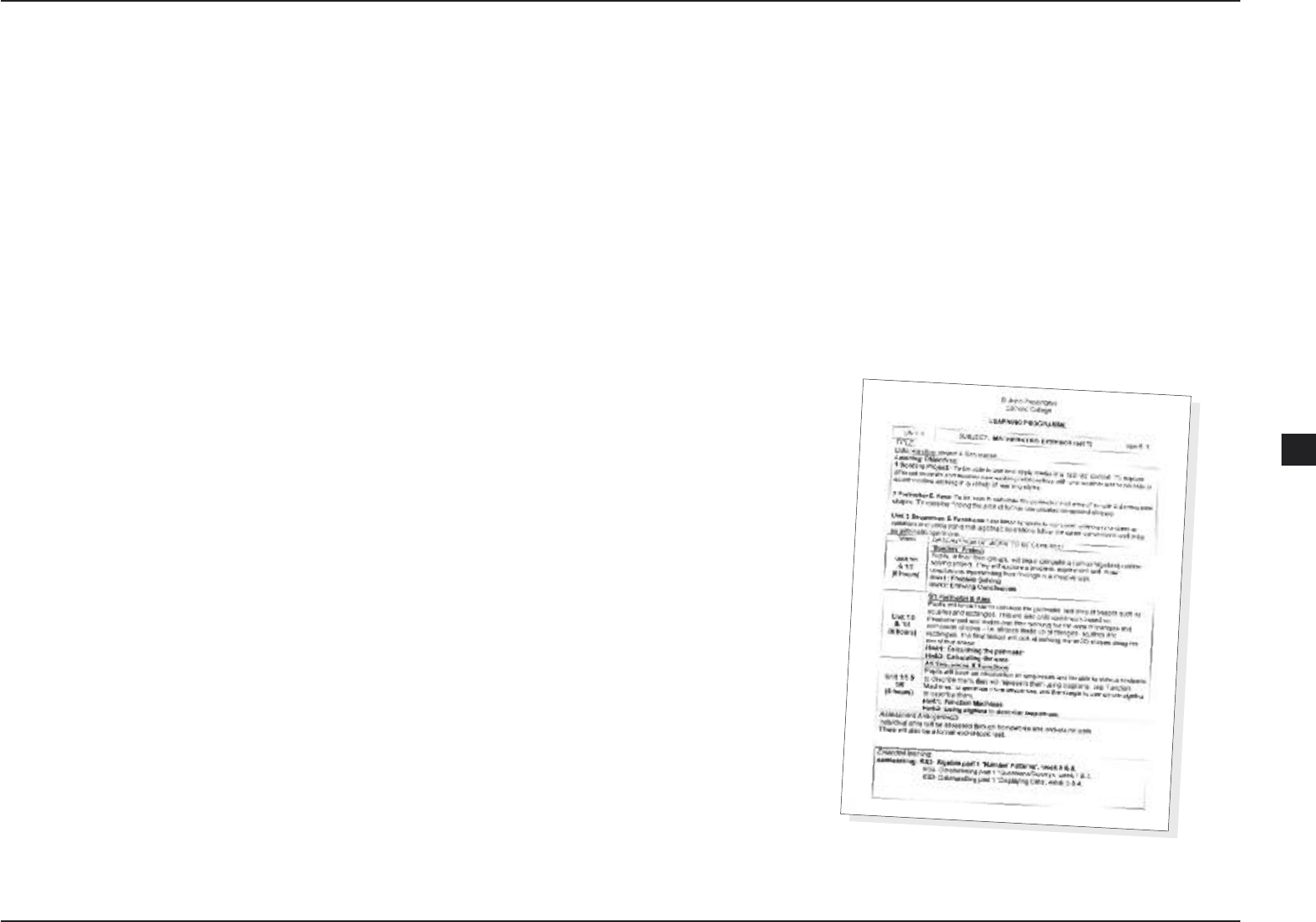
49
All pupils at SJP follow a Learning Programme in
all subjects each half-term. The LPs are available
on the College Website for Parents and Pupils to
access from home. They detail the programme
of study for each subject, setting out the
knowledge, skills and understanding your child is
expected to be taught. The Learning Programmes
also signpost the Assessment procedures
including the homework that will be set each
week.
Application
Key Stage 4 students at St John Plessington
Catholic College are given a programme of
events and advice during Year 11. If students
wish to apply to the Sixth Form they do so using
the appropriate forms by Christmas. After
Christmas, students are interviewed by the Senior
Management Team and Director, Heads of
Learning/Learning Coach of Sixth Form. Students
will be invited to discuss their career plans and
how the subjects chosen will meet their needs.
Students who apply from other schools at the
same time are contacted and usually interviewed.
The main body of applications is used to create a
‘best-fit’ option block arrangement, which
therefore is different each year. Most sensible
course combinations will be possible but all
courses depend on adequate numbers if they are
to be offered. Once the student has been
interviewed s/he will be made a conditional offer
of a place in a letter sent by the Director of Sixth
Form to the student’s parents.
Enrolment
Prospective Year 12 students are expected to
attend the enrolment day, which takes place on
GCSE results day. This is the day when students
officially sign up for their courses. Year 12
students are expected to attend by appointment
between 10am-3pm and once the enrolment
form and student contracts are completed, the
student is a member of St John Plessington
Catholic Sixth Form.
Class Sizes
Every effort is made to provide students with
their requested option choices. However, courses
with very low numbers of students may not be
offered or may have a lower number of
timetabled lessons. Large numbers may generate
additional classes but these will be subject to
change.
Year 13 students studying Year 12 courses
Under certain circumstances Year 13 students
may join AS classes with Year 12 students. Places
on AS courses are only made available to Year 13
students after Year 12 students have made their
final selections in September. This request must
be agreed through the Director of Sixth Form.
Curriculum
Learning Programmes
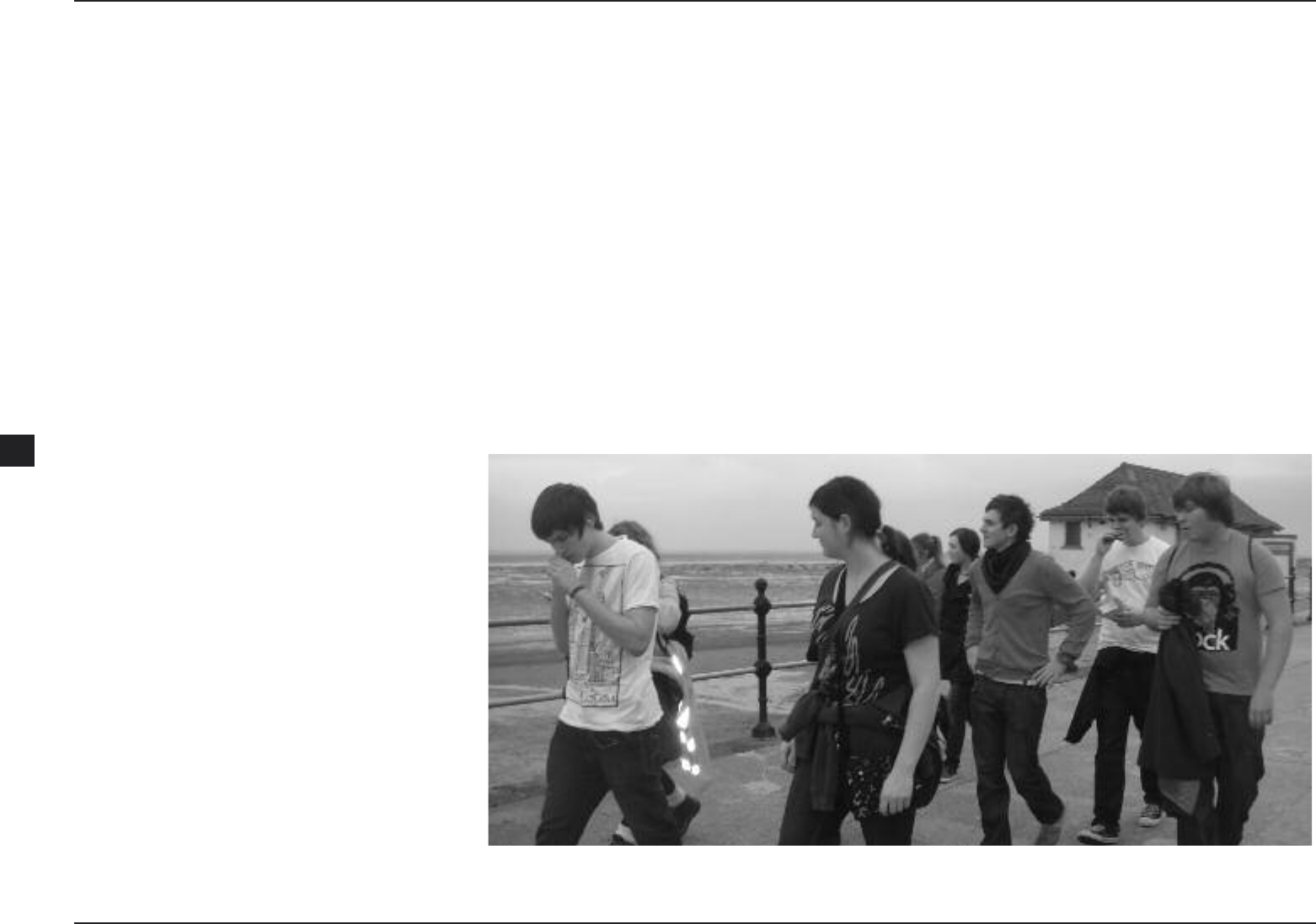
50
Subject entry requirements
The general entry requirement to study Level 3
courses for the Sixth Form is 5 GCSE passes at
grades A*- C. For some subjects, students may
not need to have studied it at GCSE. Each
student needs to create a viable mixture of
courses. Decisions are made according to
individual needs and ability. Students may be
accepted on to courses and put on special
monitoring if the level of previous performance
gives cause for concern.
Overall structure
Sixth Form timetables are very different from
those in the main school. All students will have
some private study lessons and individuals may
have very different days depending on the
courses they are studying. What matters is that
each student has a timetable that works.
Students are given a printed timetable at the start
of the year. Students who organise changes are
expected to ensure that they collect an updated
timetable from their tutor.
CCP – Compulsory Core Programme
General RE is taught for one hour per week to
every student in Year 12 and 13. Every student
will receive one hour of Citizenship every 2
weeks.
Enrichment
Year 12 students will be able to take part in
timetabled enrichment activities from September
2010. Students will also have the option of a
range of work related learning activities. These are
scheduled on an individual basis.
Reports
At the end of each Learning Programme, that is,
every half term, you will receive a report which
will give you information about your
son/daughter’s progress in the subjects they are
studying and an indication of their end of year
and end of key stage targets.
Both effort and attainment are assessed so that
you can see the fullest possible picture of your
child’s progress during the year. All pupils transfer
their progress grades into their planners and
exercise books so they too can see how well they
are doing. As well as half termly reports
parents/carers will receive an Achievement Plan
each term. This will review their overall progress
and achievements and set personalised targets
for improvement.
Curriculum Continued
“The College provides students with an impressive variety of extra-curricular activities.”
(OFSTED)

51
E-learning
As a Technology College we make every effort to
ensure that your child has access to the latest
technology to enhance their learning experiences.
There are over 600 computers available to pupils
in the College. Every classroom is equipped with
an Interactive Whiteboard and every teacher has
a laptop to facilitate the teaching and learning
process. At SJP pupils can use the Virtual
Learning Environment ( VLE) to complete
homework, and for absent pupils, to continue
learning from home. The VLE develops pupils’
independent learning skills and allows them to
have more control over how and when they
work. The VLE enables pupils to access learning
materials created by their teachers. Work is
marked and returned within the VLE. This also
means that pupils will not be able to lose or
forget their homework!
As parents, you are able to access your child’s
personal home page to keep track of their work,
their progress and their curriculum. The VLE can
be accessed via the College website.
In addition, students are strongly recommended
to lease a netbook from the College to use
throughout their time in the Sixth Form. The
wireless facilities around the College building will
mean that students can access online learning
facilities at any time. We are not aware of any
other Sixth Form on the Wirral that offers this
exciting facility.
Additional Needs Students
The College follows the Special Educational
Needs Code of Practice (2001) and uses the same
definition of special educational needs i.e.
Students have special educational needs if they
have a learning difficulty that calls for special
educational provision to be made for them. The
school recognises that provision for pupils with
special educational needs is the responsibility of
the whole school and that all teachers are
teachers of pupils with special educational needs.
The aims of the special educational needs policy
are:
• To enable pupils with special educational needs
to have their needs met
• To take into account the views of the pupils
with special educational needs
• To encourage good communication with
parents of children with special educational
needs
• To facilitate full access to a broad, balanced and
relevant education, including the National
Curriculum, for pupils with special educational
needs. Some pupils receive additional support
from a Teaching Assistant in the classroom.
Some pupils may have a modified curriculum.
Departments ensure classroom organisation,
teaching materials, teaching style and
differentiation are such that all pupils, including
those with special educational needs, can learn
effectively.
Whilst we recognise national programmes for
Gifted and Talented pupils, we believe all our
pupils to be gifted and talented in many different
ways. We ensure that everybody has access to
excellence and that whilst there are many pupils
who are identified as Gifted and Talented, the
learning of all pupils is given equal priority. As
with all pupils, stretching and challenging tasks
are provided for G&T pupils in their subjects, as
well as extra-curricular classes and workshops.
Their progress is monitored after every half term
progress report.
Curriculum Continued
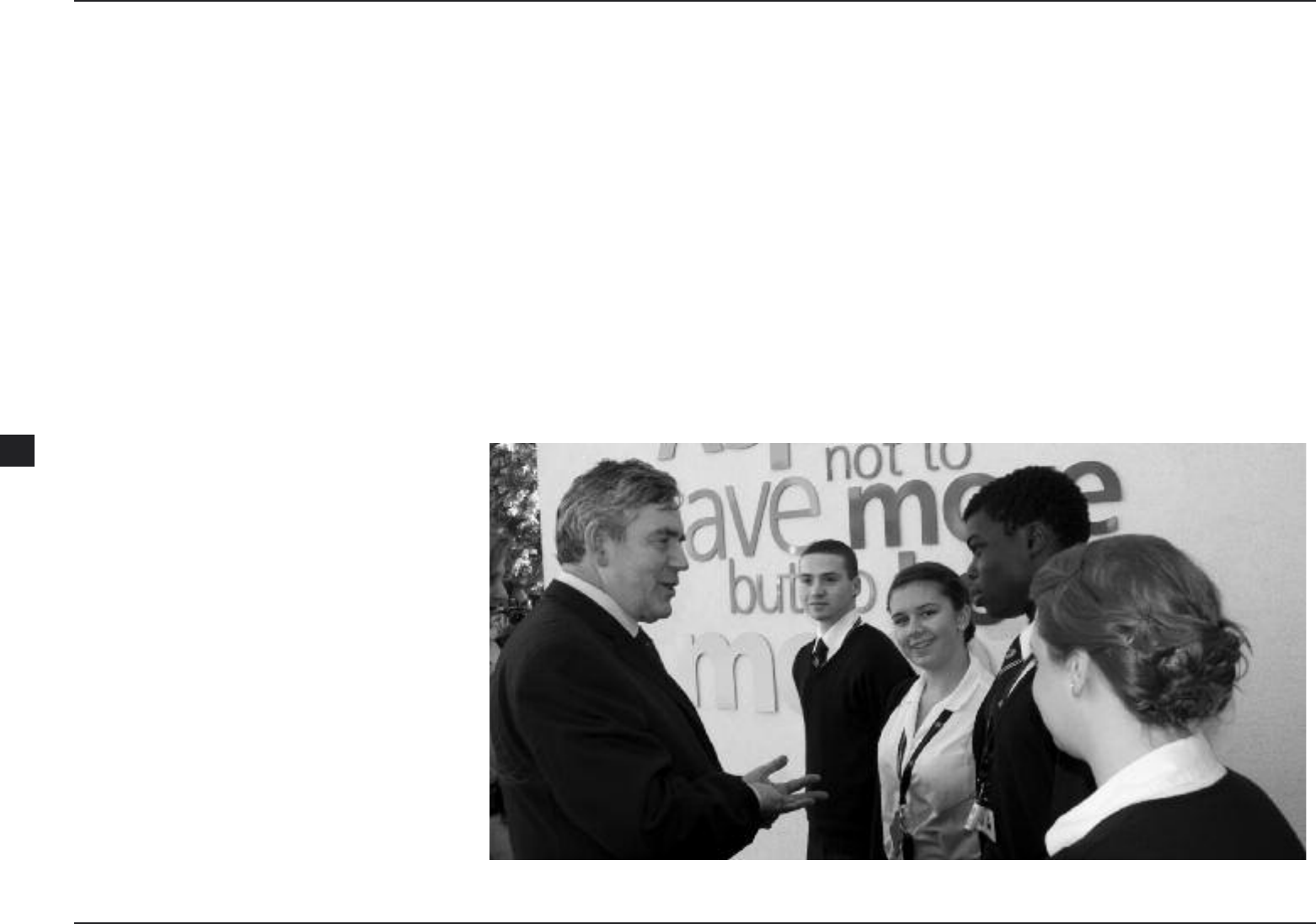
52
Basil Hume Sixth Form Centre
The Sixth Form benefits from it’s own Basil Hume
6th Form Centre. The Director of Sixth Form,
Head of Learning for year 12 and the Learning
Coach are all located in this area and are easily
accessible to students should they require any
guidance and support. This is a quiet study area,
with extensive I.T. and printer access available for
students to use during study periods. There are
also tables and seating areas available for pupils
to utilise to work together to complete group
work tasks, share ideas and discuss lesson
content.
College Library
The College boasts a large and vibrant library,
valued by the whole community. Sixth formers
are able to work and gain computer access in the
College library throughout the day. Students can
be found making the most of the excellent study
and research facilities available, as well as taking
the opportunity to sit and read the day’s
broadsheet newspapers to keep in touch with
current affairs.
The Sixth Form Zone
This is more of a relaxed environment, with lots
of comfortable seating. In consultation with the
Sixth Form council, the facilities in this area
includes a ‘breakfast bar’ style area. Situated
close to the College Dining Hall, when not in use
during lunchtime as an eating area, this will be
another area students can come to study, as it is
equipped with wi-fi access. The Head of
Learning for Year 13 is located in this area.
There is also a decking area for Sixth Formers,
providing further access to areas where students
can eat and socialise outdoors. Students take
advantage of the summer months to study
outdoors, whilst enjoying the sunshine!
To find out more about joining our team of Pupil
Library Assistants, see Mrs Broom in the Library.
Netbooks
The College runs a ‘netbook’ scheme which
provides all students with the opportunity to
lease a netbook for £50. This provides them with
computer access throughout the College, with
wi-fi readily accessible, for their time in the Sixth
Form. On return of the netbook, this money is
returned, should there be no damage to the
computer. It is strongly recommended that each
student takes advantage of this fabulous
opportunity, as the majority of courses require
research and coursework completion for which
computer access is a necessity.
Sixth Form Facilities
“What I have heard about this school makes me incredibly proud that it is the top school in this country.”
(Rt Hon Gordon Brown)

53
Information and Communications Technology
SJP is at the forefront of computer based
technology systems with over 600 computers
available to our students. Every classroom is
equipped with an Interactive Whiteboard and
every teacher has a laptop. We operate a
Windows based computer system providing
access to the Virtual Learning Environment (VLE)
via the College website
www.stjohnplessington.com the Internet and
e-mail. To use the SJP computer network all
students and parents must agree and sign our ICT
Contract. Students who break the Contract will
have their network computer account disabled.
Username and Password
On joining SJP students are issued with a username
and password for access to the network system.
Students are not allowed to use the system using
an unauthorised username or password. Students
can change their password at any time. If students
lose their password it will only be reissued by the
SJP Technicians team twice in one term.
The Virtual Learning Environment
Once again this has put SJP at the cutting edge
of educational initiatives. We were well ahead of
the Government’s intention of seeing a VLE in all
schools by September 2009 when we introduced
it in October 2007.
Our VLE gives all our students the opportunity to
benefit from ‘anytime and anywhere learning’ by
using the internet to keep up to date with their
work. SJP teachers use our VLE to set work for
students, students then submit completed work to
their teachers on our VLE and teachers are able to
track the progress being made by each individual
student. Students can always go back to resources
used in lessons, including any presentations, so
making revision so much easier for them.
The key benefits anticipated over time from our
VLE are:
• Students will develop independent learning
skills and have more control over how and
when they work.
• Absent students can continue their learning
from home, with work set by the teacher on our
VLE, and marked and returned within our VLE.
• Students will be able to access learning materials
created by their teachers, outside lesson time
and from locations such as a library and home.
• Students will be able to store work and notes
online for use in assignments, homework and
revision, outside normal College hours.
• Parents will be able to access their son’s/
daughter’s personal home page to keep track
of their work, their progress and their
curriculum.
Samlearning
The College subscribes to SAM Learning, which is
an e-learning service that can be accessed on-line.
SAM Learning has proven to improve exam results
through exam practice and related revision.
Sometimes homework is set requiring pupils to
use SAM Learning. If it is not possible to use SAM
Learning at home, we can make arrangements for
access to ICT suites in College outside task hours
so no-one is at a disadvantage.
Transferring Files
Students can transfer files between home and
College using the VLE or alternatively a USB
storage device
Computer Games
Computer games are not allowed to be brought
into or played in College. This includes web-
based games on the Internet.
Reporting
A unique aspect of the SJP online reporting
system means that parents have an
anytime/anywhere opportunity to access their
child’s half-termly report and termly achievement
plan as well as regular attendance updates. This
means that SJP reports to all parents, 9 times in
any one academic year as well as a Consultation
day. OFSTED judged this provision to be an
outstanding feature of our College.
E-mail
The College is keen to ensure that we commun-
icate with parents as quickly and effectively as
possible. We hope that you are able to provide an
up to date e-mail address for us that will facilitate
this form of communication. It will allow us to
send important reminders and e-mail alerts as
well as up to the minute copies of our SJP News.

54
Introduction
It is vitally important that student success is
recognised and rewarded at every opportunity.
This can involve all aspects of student life in the
College, including attendance, work and
behaviour. In each case the most immediate form
of recognition is individual teacher praise but a
more formal rewards structure has also been
developed.
Rewarding attendance
• EMA students who achieve their weekly
attendance target and meet all coursework
deadlines will receive their weekly EMA payment
• Students who have 100% attendance for a term
will receive an attendance certificate during the
termly Achievement Award assemblies
• The Director of Sixth Form will send letters
home on a termly basis to all students whose
attendance exceeds 95%
Private Study lessons
All students have lessons on the timetable where
study time is allocated. Students are expected to
decide how best to use this non-contact time
within some guidelines and rules. Students are
strongly advised to use the time wisely.
At the start of the Sixth Form all students are
required to attend for the full day from 8.40am
until 3.20pm. Private Study lessons may account
for 5-10 hours in the week. Students may choose
between:-
1. Working in theCollege Library - Silent Study
2. Working in the Basil Hume Centre - Quiet
Study
3. Working in an empty classroom or in a
computer room
4. Working in the Dining Hall
5. Appointments with staff for tutorials at the
discretion of the Director of 6th Form/ Head of
learning.
As student freedoms increase, the option of
spending Private Study time at home is created,
particularly in Year 13. Students are advised to
use non-contact time to enjoy socialising but also
to set aside enough of this valuable time for
work. For many students, access to computers
and silent study or the opportunity to work with
fellow students, will be invaluable. Students are
reminded that computers are only to be used for
study and that the freedom to use the facilities
may be withdrawn from any student who
misuses school equipment. In addition, they will
have to pay for any damage.
The use of computers
Students have a responsibility to use computer
facilities for the purpose of study within the
regulations provided by the College.
Dress Code
Students should be appropriately dressed at all
times in accordance with the uniform policy. If a
member of staff feels that this is not the case it
should be brought to the attention of the Form
Tutor who will discuss the issue with the student
concerned. If the student does not modify his/her
uniform or appearance, parents will be
contacted. Jewellery may be worn but should not
be excessive. Hairstyles should not be extreme.
Hair should be one colour and should be natural
in appearance. The Head Teacher reserves the
right to make the final decision on what is or
what is not appropriate and if necessary will send
students home to rectify the issue. All of the
above forms part of the Sixth Form Learning
Agreement.
Rights and Responsibilities
Rewards
“In this College it is both acceptable and expected to do your best.” (OFSTED)
‘Behaviour is exemplary’ (OFSTED)
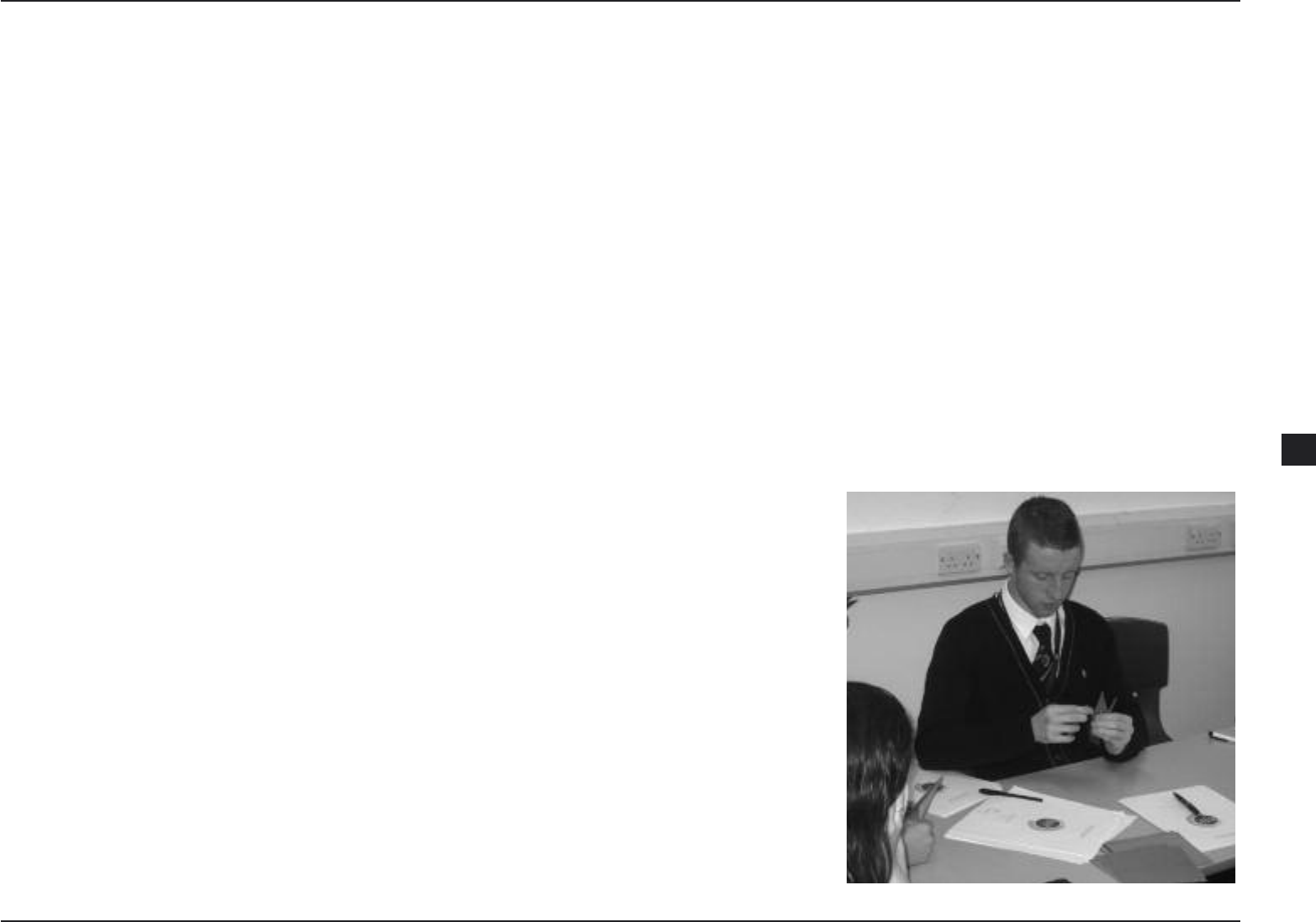
55
Discipline
Sixth Form students are expected to be a good
role model to students in the lower years.
Students in Years 12 and 13 rightly expect to be
treated as adults. Sixth formers are expected to
take responsibility and act as adults around the
site on the way to and from College. All students
will have to sign a student learning agreement at
the beginning of the academic year which
outlines the College’s expectations.
Serious breaches of discipline may result in a
student being asked to leave the College. Illegal
substances will not be tolerated under any
circumstances. Smoking in College is totally
unacceptable. The College cannot prevent
students who smoke from doing so outside the
College. However, when students smoke near to
the College in full view of younger students and
the wider community, a key expectation is being
ignored. As younger students aspire to be Sixth
Formers there is a tendency to see older students
as role models. Sixth Formers must understand
that they are role models and that their behaviour
influences younger students. Disciplinary action
may be taken against students who smoke in the
vicinity of the College or in other ways provide a
poor role model.
Parents will be contacted by letter in the case of
repeated or significant breaches of discipline.
They will be asked to attend a meeting with the
Director of Sixth Form and the student.
Sixth Formers may bring mobile phones and MP3
players to College. Clearly, these must not disrupt
lessons. Students are asked not to use mobile
phones around the College. The College will
accept no responsibility for the loss or theft of a
mobile phone or other electronic personal device.
Student access on the site
Sixth form students have access to the Basil
Hume Sixth Form Centre which students in years
7-11 are not normally permitted to use.
Students moving around the site during lesson
times are asked to avoid any actions which might
distract students who are being
taught. Sixth form students may use other areas
of the site, such as the field, which are not being
used by other students. Sixth Formers are
expected to avoid any activity, which might:
• Distract students who are in lessons
• Create possible dangers for themselves, such as
unsupervised sports.
Students may request access to a computer in a
computer room while a lesson is being taught.
Permission to use a computer will be granted at
the discretion of the teacher.
Sixth Form Zone
This is an area designed for use for the Sixth
Formers only. It includes wi-fi facilities so
students can access the internet using their own
laptops/note books. It is an area for relaxation
during break and lunchtimes and an additional
area to study during free periods. The design of
this zone was produced in consultation with the
Sixth Form Council.
Rights and Responsibilities Continued

56
It is vital that your child attends College as
regularly as possible. This is important to avoid
missing valuable lesson time and falling behind.
Employers place great emphasis on consistent
attendance and good punctuality and attendance
will be mentioned in the pupils’ Achievement
Plans each term. Registers are completed
electronically each lesson in addition to period 1
at 8.40am where morning registration takes
place and Academic Review when the afternoon’s
registration takes place.
Holidays in Term Time
Sixth Form study is very demanding and lesson
time may be lost due to enrichment events,
university visits and, on occasions, due to the ill
health of the student or the teacher. Students are
not expected to take holidays during term time.
Dropping a course
No student may drop a course at any time
without completing the appropriate form. The
first discussion should be with the subject teacher
and Head of Department who will then refer to
Director of Sixth Form for approval. Attendance
at lessons must continue until all parts of the
form have been completed. Parents/carers will
also be informed.
Continuation to Year 13
Most, but not all, students continue to study for
two years. Some students may wish to leave after
exams in Year 12 and some may not achieve a
satisfactory performance in Year 12 courses.
When results in Year 12 exams and/ or the level
of attendance/ standard of work suggest that
success would be unlikely by continuing on to
Year 13, a number of options will be considered:
• A student may continue on to Year 13 courses
and resit one or more modules of the Year 12
course to improve the grade. There is a limit to
how many Year 12 modules can reasonably be
taken in Year 13 by a student on a full
programme of Year 13 courses. Students will
have to pay for their Resit exams.
• A student may continue on to some Year 13
courses – including module resits – but drop
other courses. When this option is being
considered the student must arrange a meeting
with the Director of Sixth Form to discuss the
impact on their programme of study and career
plans. Students may wish to start a new Year
12 course while completing courses in Year 13.
In such cases Year 13 students studying Year 12
courses must find a course that does not clash
on the timetable.
• In some cases a student who has been
unsuccessful in Year 12 may wish to repeat the
year. This will need to be discussed with both
the student and parents at a meeting with the
Director of Sixth Form where a contract will be
produced. A strict monitoring procedure will be
created and such students must understand
that they may be asked to leave if they do not
meet the expectations agreed in the contract.
The reason a student would be accepted for a
repeat of Year 12 would usually be medical or
significant underperformance measured against
ALPS data. Where academic potential is clear
from GCSE the student would be expected to
perform at or above the level expected from
Year 12 students of similar ability
• Students whose Year 12 examination results are
weak are advised to contact the Careers Service
– Connexions. Names of students who would
benefit from careers advice will be sent to the
Connexions Personal Adviser attached to the
Sixth Form. Students will be contacted by the
Learning Coach and offered an interview.
Home Contact details
In light of the above, it is essential that we are
able to contact parents at the earliest
opportunity. Please ensure that all contact details
are correct including emergency phone numbers
and e-mail addresses. Pupils are in effect a Health
and Safety risk if we are unable to contact
parents should an emergency arise.
Attendance and Punctuality

57
Overview
All students are entitled to a careers interview
with the local career’s service if they request one.
The Careers Programme
Year 12
Higher Education Information
The UCAS application system
The personal statement
Gap year advice
Connexions interviews
Visits to a number of Universities
Attend Higher Education Conference
Year 13
Completing the UCAS form
Connexions interviews
The purpose of careers in the Sixth Form is not to
tell students what to do with their lives, but to
guide and advise them on the options that are
realistically available. It is the student’s
responsibility to attend Academic Review and
request interviews or attend open days. The Sixth
Form staff are able to guide and advise students
but it is the responsibility of students to seek out
advise and complete their own research.
Application to university begins in the summer
term of Year 12. Using the web-based ‘Apply’
system, students can complete the UCAS form on
their own PC at home or online at College.
Applications for some courses must be completed
by October and early application is beneficial for
all courses. Students are expected to do their
own research and seek advice from their tutor.
University visits are essential.
Students may apply for university courses starting
in the autumn after A2 exams or in the following
year – a deferred place. Students may choose to
apply in the year after completing A2 exams
whilst on a Gap Year. The College will support
students who wish to do this but the student will
need to be responsible about completing the
application early. Naturally students in the Sixth
Form have priority over students who have left.
Students not wishing to apply to university are
called ‘Jobseekers’ and a separate programme of
support is provided. The careers service takes
increasing responsibility for students who are not
sure of what to do after completing their exams.
University visits – Open Days
Students who are considering university courses
are strongly advised to visit a number of
universities. Visits on Open days or at other times
may provide a student with a clear idea of where
to go or where not to go. The buildings –
campus or not – and, in particular, the location of
student accommodation is better experienced
first hand.
Each student will usually be allowed a maximum
of 3 open day visits.
References
Students are entitled to a reference from each
subject area describing their abilities.
References should describe in a positive way the
level of achievement of the student.
While references must reflect the performance of
the student they will deal with positive comments
only.
All Year 13 students are entitled to receive an
appropriate reference by half term in October.
Teachers may not need to write references for
some students who do not wish to apply for
university. University references are more useful if
the teacher is aware of the course for which the
student has applied. Students are expected to
speak to their teachers and provide information
about their university application, which will
enable their teachers to emphasise points that
will support the application effectively.
References are sent to tutor and the tutor brings
together the separate subject elements into a
unified reference. No reference to UCAS will be
sent unless seen and approved by the Director of
Sixth Form. UCAS references should fill the space
available on the form and should provide as
positive a picture of the student as possible.
Careers
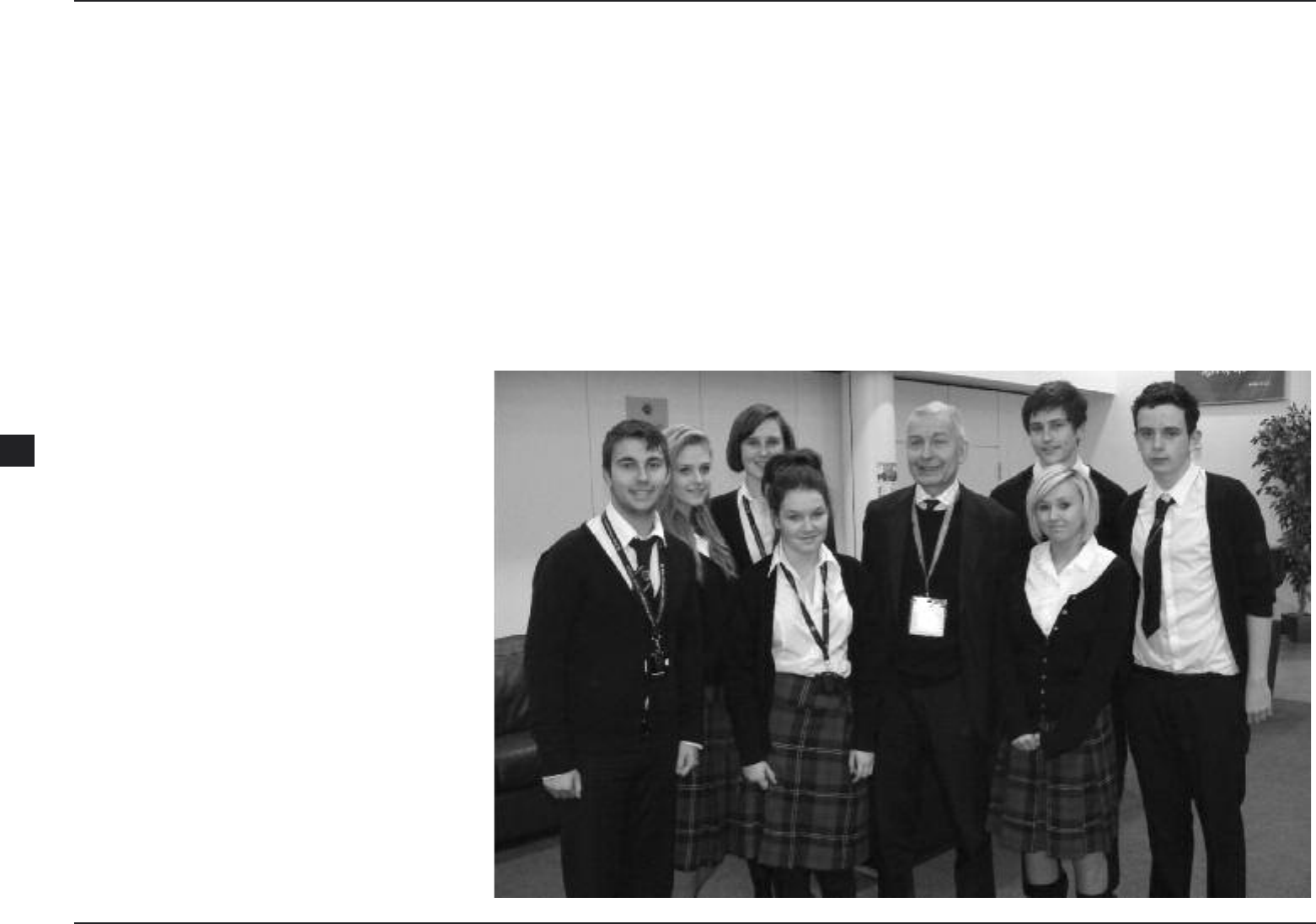
58
UCAS
The process of application to university is, for
most students, the most significant part of the
first term in Year 13. The application has 4 pages.
Pages 1-3 are completed by the student and
page 4 by the tutor. Before the application is sent
the student must check all 4 pages and pay the
UCAS fee of £22. The application is completed
on computers using the Internet based ‘Apply’
application process. Students are given
information about how to access the website and
are also given guidance on how to complete
Personal Statements. Students must keep in
regular contact with their tutor during the whole
process, which is not complete until they have
checked the final form. The progress of the
application can be tracked on the Internet but
students may phone UCAS if they have any
concerns. Predicted grades are given as part of
the reference by subject teacher. Teachers are
asked to predict what they believe is a reasonable
optimistic grade based on the assumption that
the student will work as hard as possible to
achieve the best possible result. As all university
courses have grade requirements (the standard
offer) it is not sensible to apply for a course with
predicted grades, which are less than the required
grades – the ‘standard offer’.
Interview Practice
Students can request interview practise prior to
attending university interviews. Similarly, students
seeking employment may request interview
preparation training sessions. This should be
arranged via the Head of Careers.
COMMUNITY WORK
The expectation is that all students will complete
an hour a week of Community Work. This could
be as part of our peer mentoring programme or
arranged through an outside agency e.g.
Bebington Voluntary Services. Students will be
expected to keep a log of the hours they
complete for this community work which will
provide a useful point of information to include
in their reference.
Careers Continued
Aspire
not to
havemore
but to
be
more
...
Archbishop Romero
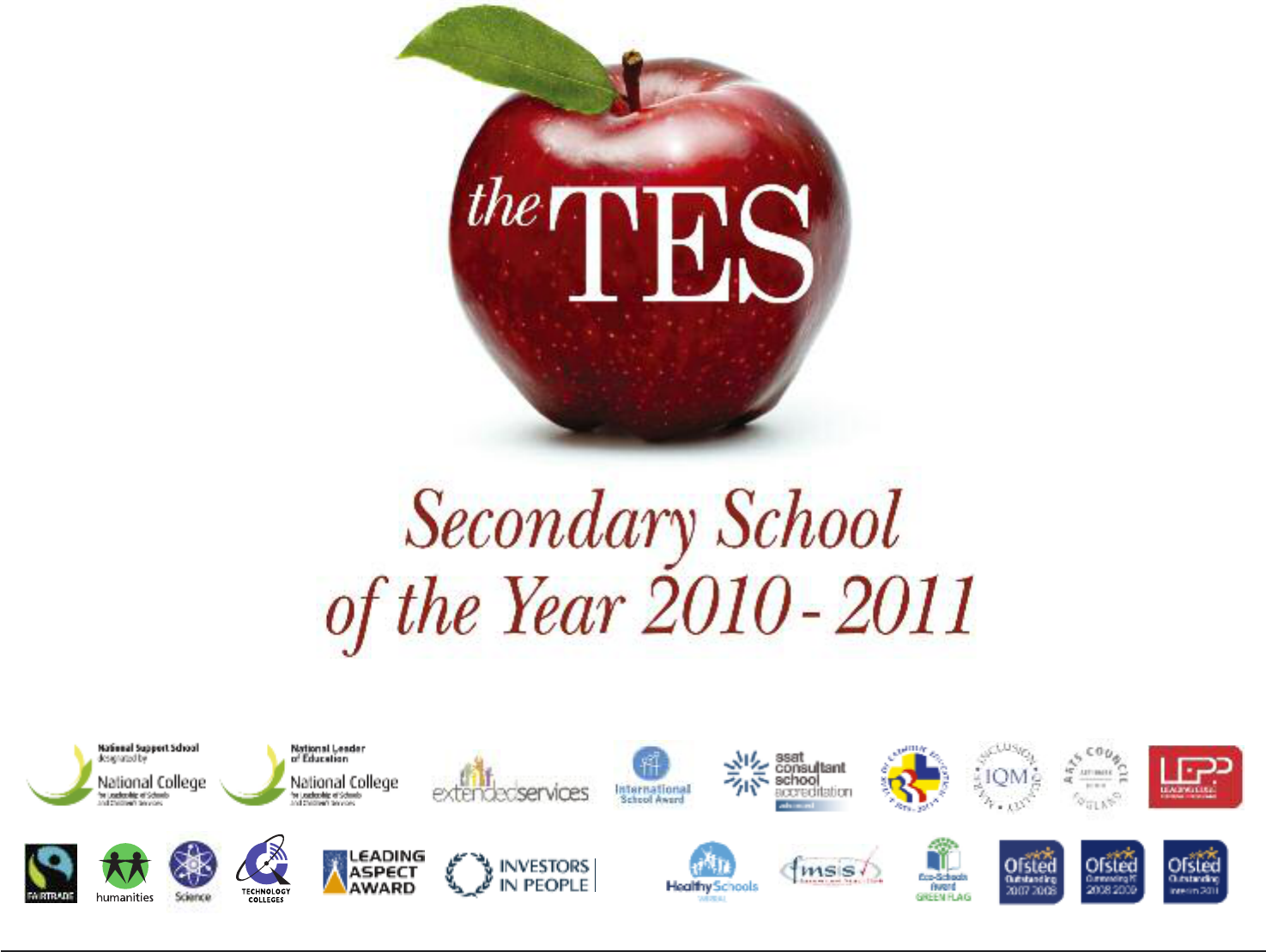
Gold
